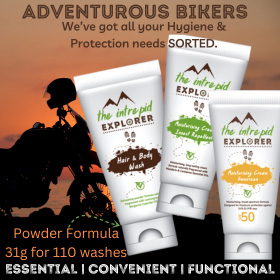 27Likes 27Likes
 |
|

7 Aug 2014
|
|
Registered Users
HUBB regular
|
|
Join Date: Dec 2009
Location: The Netherlands
Posts: 66
|
|
|
With the sun on our face to Rome
After we had visited the Leaning Tower of Pisa on Sunday morning 8 December, we ride on to Rome. We booked a hotel on the outskirts of Rome where we would stay several nights. On the advice of Claudio (of B&B Alfieri) we again follow the Via Aurelia, which appears to be a good choice. We drive over the Tuscan hills to the south. The sun is low in the sky and shining right in our faces. We’re going in the right direction.
The Via Aurelia is less winding here than in the north of Italy, and that’s good for today. Our confidence in the bike and the tires has to grow again after our fall, especially in the corners. It is quite a long way to Rome, but we make good progress.
We regularly pass cars that, for some inexplicable reason, drive very slowly or on the wrong side of the road. It that case there are two options. If you see hand gestures through the rear window, the driver of the car is talking animatedly, with passion and a lot of hand gestures to a fellow passenger. Driving the car is clearly less important.
Option two is when you do not see any hand moving back and forth. In that case that hand is holding a phone. Everyone, absolutely everyone (from grandmas to bus drivers) is calling in the car. Nobody even bothers to stand still, everyone just drives on. Only very slowly and without really paying attention on the road. Very peculiar.
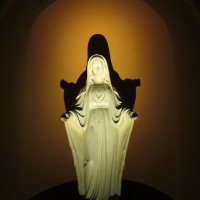 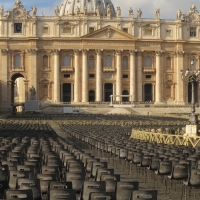 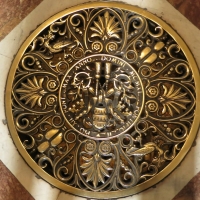 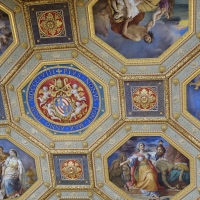
The further we ride into Italy, the more churches and chapels we pass. Along the way there are many crosses and statues of Mary, always in a niche with candles and (fake) flowers. We drive past a cyclist who, during his weekly tour, makes the sign of the Cross when passing a hearse. It is clear that we drive to the Roman Catholic capital of the world.
The hotel is nestled in the outskirts of Rome. When the GPS indicates that we have arrived, we are in front of a large walled house, situated in a residential area. The large metal gate is closed and only the door of the gate is ajar. We do not see any sign indicating that we are in front of a hotel. The building looks like a hospital or a school. I walk through the gate and on the door of the building I see a sticker of ‘TripAdvisor’. This should be the place. And it turns out right. The guy behind the counter knows about our reservation and opens the gate so that we can both drive our bikes insides.
When I am back at the desk to check in, I notice that there are a lot of pictures of Pope Francis. On notebooks, calendars, maps of the city and even on the business card of the hotel. On the outside of the hotel there is another statue of Mary in a niche and on the notice board in the lobby shows the time of the Mass. It looks like a convent.
The next morning at breakfast it appears that was not a crazy thought, when we receive our sweet breads served by a nun. The hotel “Il Romitello” is owned by the Order of the Sisters of the Immaculate Conception of Castres. That afternoon it appears that our room is located next to the chapel where a Mass is held. The next days the sisters gather in the same chapel for choir rehearsal. It is not ‘Sister Act’, but it sounds very nice.
Inspired by the sisters at our hotel, we get on the train to Rome on Monday to go to Vatican City. At the beginning of the morning we get to St. Peter’s Square. An impressive first sight of St. Peter’s Basilica, the famous balcony and statues on the wall around the square. The square is still filled with the seats needed for the Mass of the day before. It makes me quiet for a moment, when I realize that my mother was here with my grandmother on one of those hundreds of seats to attend a Mass in 2012. The preparations for Christmas are in full swing. On the square a huge Christmas tree is being set up.
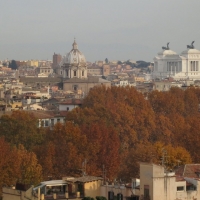 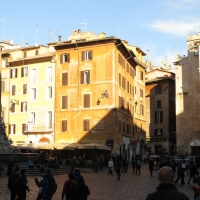 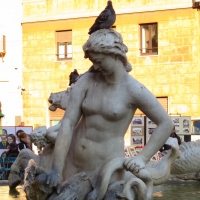 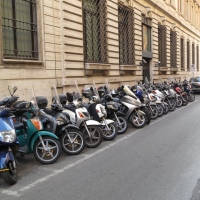
The queue for the St. Peter’s Basilica is not very long, it also has its advantages to visit Rome offseason. Once inside the church makes a huge impression on us. High ceilings, large statues, overwhelming. The light is beautiful and makes our cameras click. Our tour then brings us to the Vatican Museum, especially to view the Sistine Chapel to admire the famous frescoes by Michelangelo. In the Sistine Chapel itself we were not allowed to take pictures, but the rest of the museum (especially the ceilings) result in enough colourful pictures.
The next day we visit the Pantheon, a church in the shape of a dome with a hole in the roof. The outside does not reveal how beautiful it is inside. It is a very old building, the round dome dates from 128 AD. It is incredible to think that, at the time, they already had the techniques to build it. The remainder of the day we walk around town and visit different tourist attractions, including the Spanish Steps, the Trevi Fountain and Piazza Navona.
Despite the low season, street vendors are at each spot trying to sell you stuf. If you are near Vatican City, it is mainly stuff with pictures of the Pope. The current pope, Pope Francis, is hugely popular. Pope John Paul II from Poland, who already died in 2005, is still a bestseller. In other parts of Rome the vendors sell roses, bags and hats. The most sold item is a “Splat Back Ball”, a strange round figure of some sort of slimy plastic that makes a very sad sound when you throw it flat on the ground, after which it takes its round shape again and you can trow it again. Everywhere we go we hear “Splash, Pieieieieiep, Splash, Pieieieieieieiep”.
Piazza Navona is already in the Christmas spirit with a big Christmas market. Especially the stall where you can buy items for the Christmas crib is frequently visited. The Italian version of the Christmas crib is very full with a lot of different animals, figures and even running water. The lights that are used by the Italians in their trees are not just white, but have different colors and flash. We do not particularly like it, but the Italians seem to love it. Even the nuns at our hotel had a tree that successively blinked green, red, yellow and blue (?). It did add to the Christmas spirit!
After two wonderful days in Rome we drive on to the south on Wednesday. The sun again shines, we are very lucky with the weather!
Distance travelled to Rome : 2,226 km (1,384 miles)
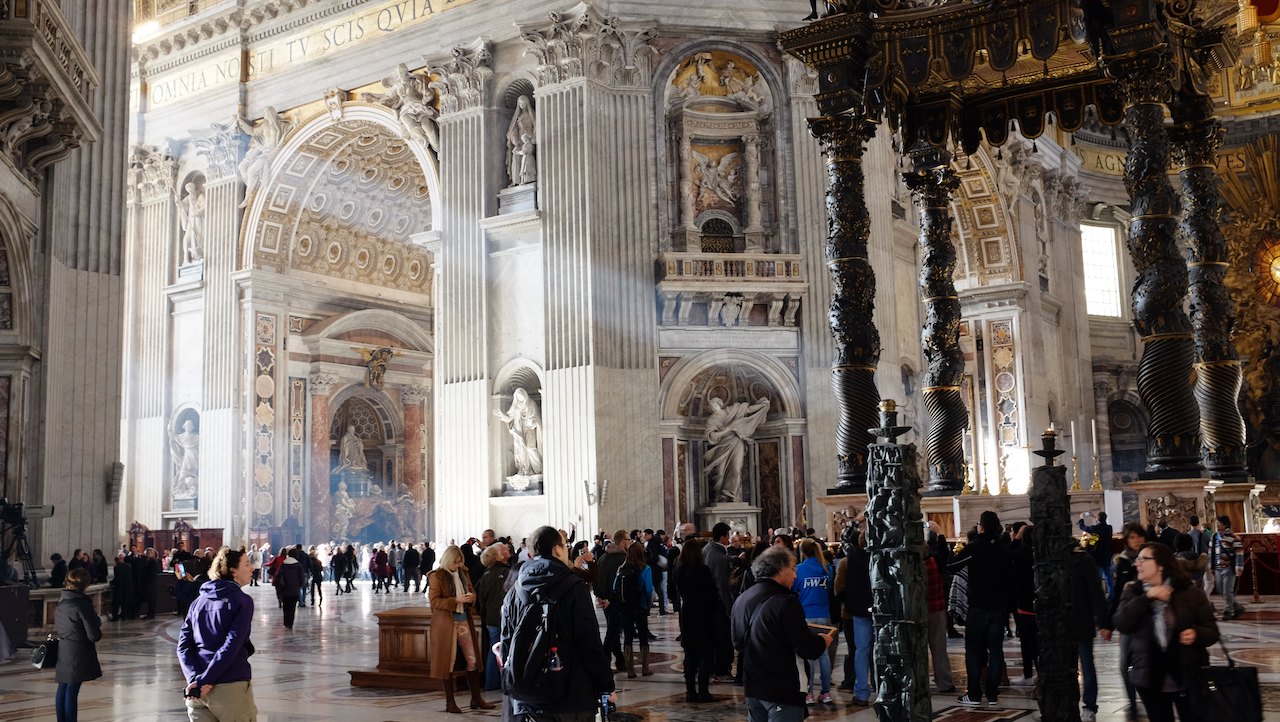
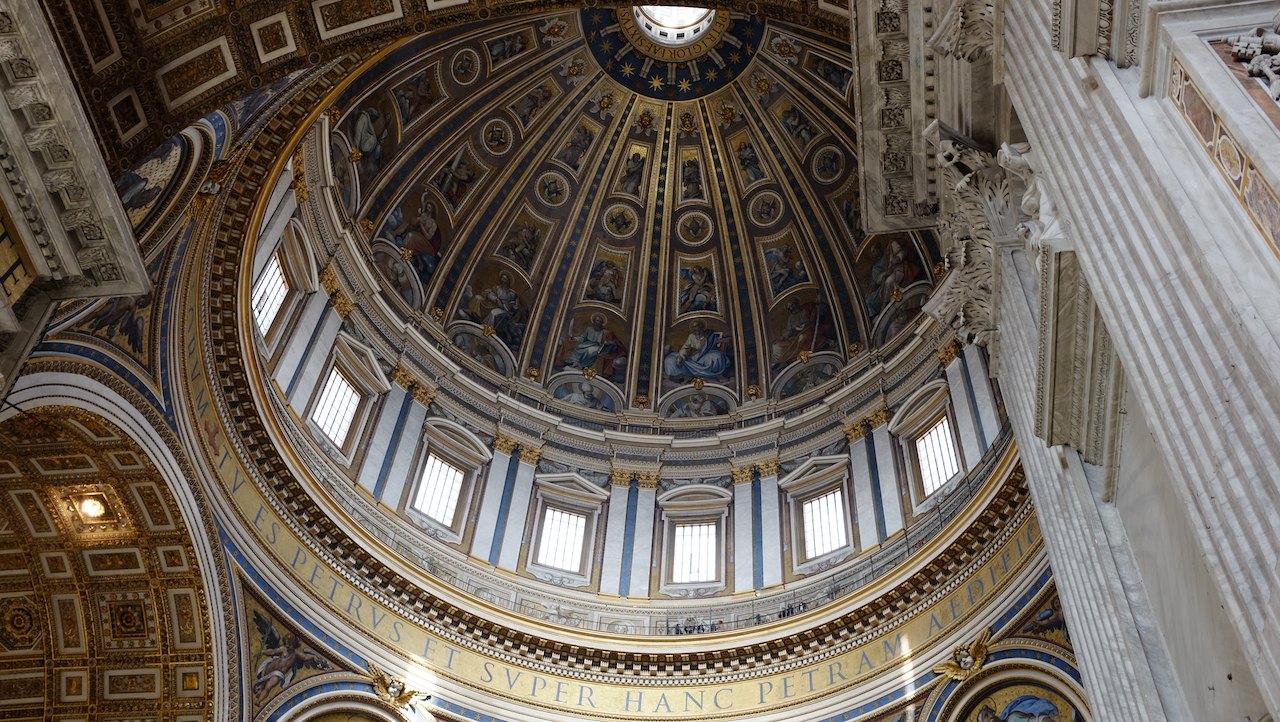
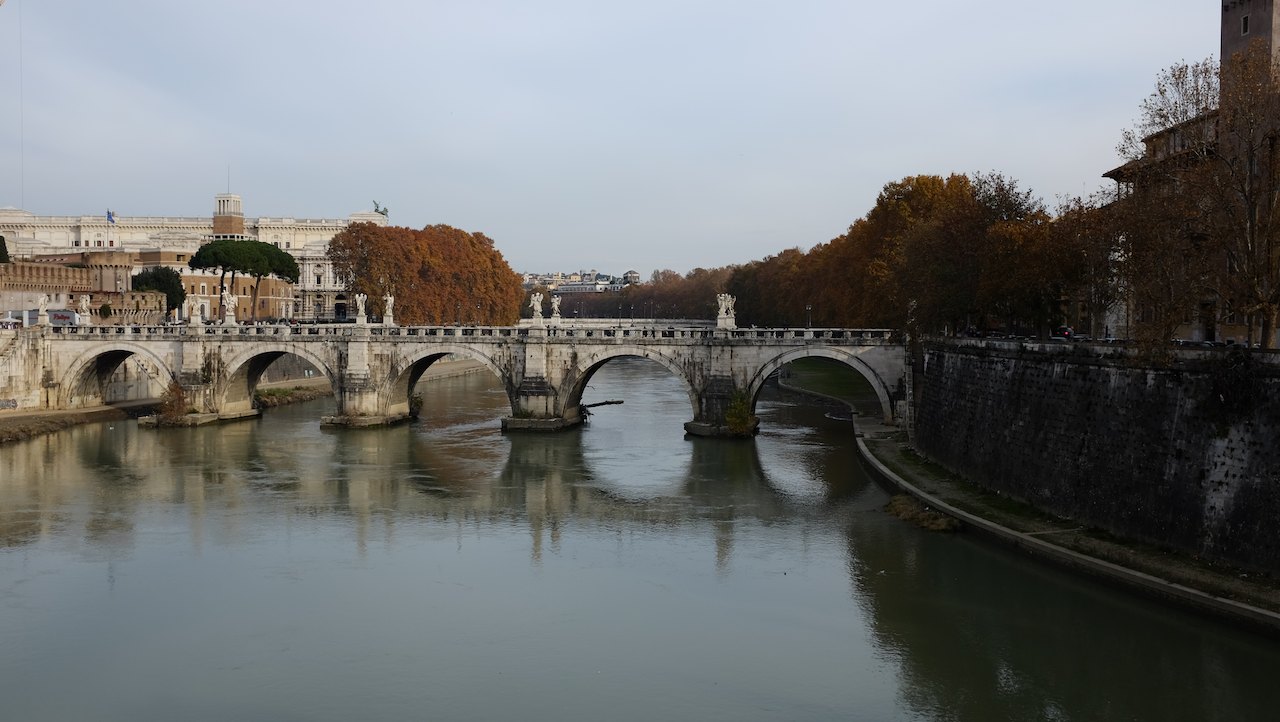
|

11 Aug 2014
|
|
Registered Users
HUBB regular
|
|
Join Date: Dec 2009
Location: The Netherlands
Posts: 66
|
|
|
To the island of fruits and vegetables
Our good Italian friends Fabrizio and Cristina assured us that the best vegetables and the best fruit can be found on Sicily. Our destination during our trip through Italy is that island fruits and vegetables. From there we will take the ferry to Tunis in Tunisia. To Africa!
During our days in Rome we booked a ferry from Palermo (on Sicily) that arrives in Tunis about 12 hours later. Palermo is still quite a long drive from Rome, so we also booked a ferry from Salerno on the mainland of Italy to Sicily. Salerno is about 270 km from Rome, a distance we spread over two days. As we leave Rome, we follow the Via Appia for a long time following the Mediterranean coast. We stop in Gaeta at find a room in an artsy B&B overlooking the sea. A beautiful view!
The next morning the alarm goes off a little later than usual, allowing us to sleep in. It is warm enough now to send some of our clothing, like the liners of our motor gear and our thickest winter gloves, home. We fill a plastic bag with all this stuff, add a spare inner tube and spare sunglasses and go in search for a post office. We find one near the harbour in Gaeta.
Peter stays with the bikes, while I take the plastic bag inside. It is very busy, there are at least 40 people in the queue before me. With the help of an Italian granny I pull a ticket from a machine for the ‘Servizi Postale’. Although everyone took a number, most of them still try to skip the queue. From old grannies, to smooth 30 year old guys, they all try to convince the people behind the counters to help them first. A few times they are successful, but most of them are just send to the back of the line.
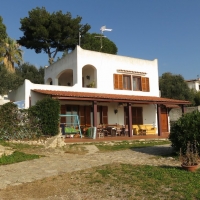 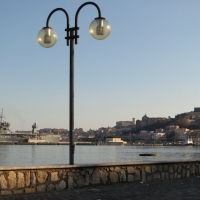 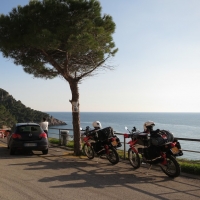 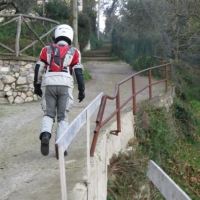
When it is my turn I take the plastic bag to the counter. The lady behind the counter hardly speaks any English, but with hand gestures and my limited Italian vocabulary she does understand that the plastic bag has to be send to the Netherlands by mail. She takes out a box and together we stuff the bag in the box and close it with some additional tape. After some more paperwork, I finally walk out off the post office an hour and a half later.
Outside Peter is talking to a small grey man. He explains he was a pilot and saw much of the world during the days he was still flying. When he hears where we want to go on our motorbikes, he raises his hands to the sky smiling. He shakes our hands three times and wishes us a safe journey. After that an older couple passes us, looking at the bikes in admiration. The man talks to Peter and then turns to me: “Sei una donna?!”. When I open my helmet to show that I was indeed a woman, he cheers and says: “Bravo! Bravo! Buon Viaggio!”
We hit the road and drive further south along the Italian coast towards Naples. Earlier, we were warned by Claudio (of B&B Alfieri) about Naples. Not only because it is a big busy city, but also because it apparently is a dangerous city. At the time he did not mention the mafia, but that is what we were thinking of. The GPS seemed to lead us past Naples and not through the city. I am sure that, if we do not get stranded in a suburb without fuel, we will be fine.
On the road signs Naples still seems to be far away, but according to the GPS we are already riding through the outskirts of the city. We keep following the GPS, but at some point he (the GPS has by now turned into a person) seems confused and begins to recalculate. We have gone too far and need to turn around. Once we stop to have a good look at the map, it appears the GPS is leading us right through the city centre after all, instead of leading us around it. Well too bad. If we just keep riding, we will get to the other side of the city eventually.
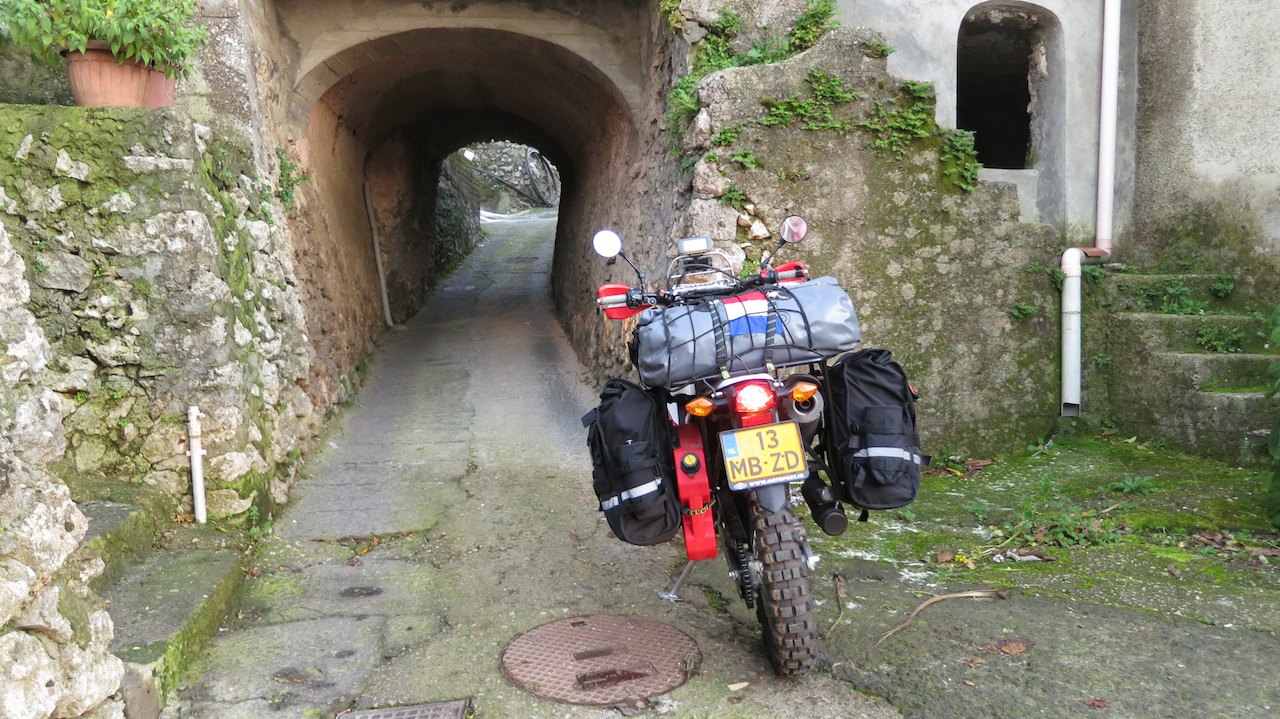
We drive into the city and turn onto one one-way street after another, turning left, right, right, and left again. It is very busy and it seems nobody adheres to the traffic rules. Cars just riding onto the street without giving way, stopping in the middle of the road, riding through the red light. We have to pay attention to prevent an accident. Fortunately, the bikes are not very wide and easy to handle. At the same time we are overtaken on both sides by the even smaller scooters and motorcycles. The Italians drive a lot faster than we do, trying to be the next Valentino Rossi. I regularly hear Peter shout over the intercom: “Watch your mirror, another one is overtaking you.” That does not mean that the overtaking scooter is driving on my left, he might just as well be at the other side. It is crazy and tiring.
Halfway Naples we decide to fill up and get some fuel. We arrive at a garage near to the port and are surrounded by a number of young men (“dudes” so you will). While I fill my tank we talk about the bikes, our route and soccer match of the night before. In the corner of the garage is a black car. Inside are two bearded Italians with huge sunglasses. One of the young guys runs back and forth to them, seemingly to report about the two motorcycle riders from ‘Ollanda’.
Once I want to pay, the guy looks at the men in the black car. Only after a nod from the guy in the passenger seat, does he accept my money. It is unclear what that nod exactly meant, but we pay the price that was on the board and then leave (with all our belongings). I wonder who those guy in the black car were….
The road leads us deeper and deeper into the city centre of Naples. Through a run down part of town where people obviously do not have a lot of money to spend. What is striking is the large amount of waste that is everywhere. Especially in the suburbs the waste was piled up high against the houses next to the road. After more than 1,5 tiring hours we finally hit the main highway and drive out of the city at full speed to leave Naples behind us.
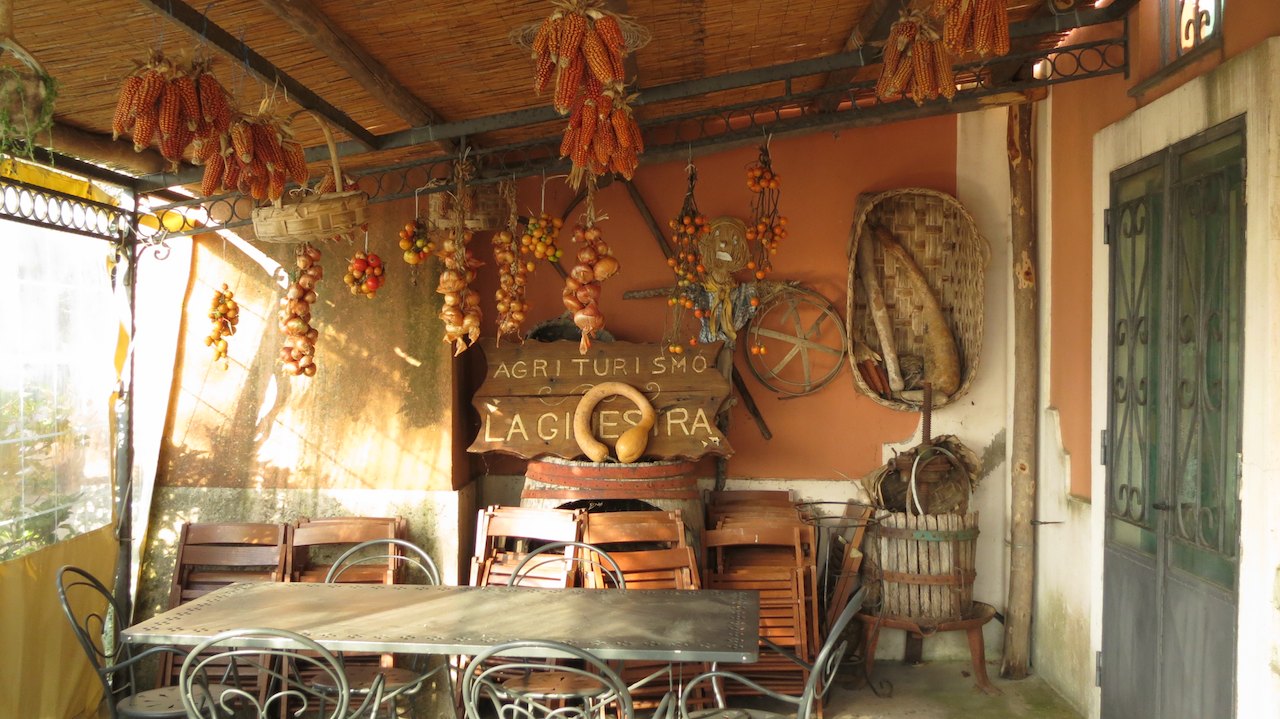
We drive higher into the hills. The hotel that we booked for the night is an ’Agriturismo’, a B&B on a farm. The farmhouse is tucked away in the hills. At some point, the GPS points us toward a very steep and very narrow path up the hill. We drive up in first gear, honking in every corner and hoping there will not be any oncoming traffic.
It will be difficult to stop here without dropping the bike. The road continues into a village and gets even more narrow. Just before we ride through a little tunnel, I get off the bike to ask for directions. A lady assures us that this is the right way to the farmhouse. Here and there small cars are parked. If they made it here, so will we! We ride on, while the road becomes even more steep, until we see that the road turns into a staircase in the distance. That is not good! We will not be able to cross that with the bikes! We get off and look for another person to get directions from. It then turns out that the staircase does go to the farmhouse, but that there is another route around the staircase as well. Great!
After only five minutes, we park in the yard of the Agriturismo. It looks fantastic. In the field are fruit trees and vegetables. We hear geese, cows and sheep. We are warmly welcomed and taken to a beautiful room overlooking the hills and the sea in the distance. After we have freshened up, we have dinner at the restaurant. We are the only guests and enjoy a truly great Italian meal. The Italians surely love their food! After a long, tiring ride through the city, we get to bed early. Tired but happy.
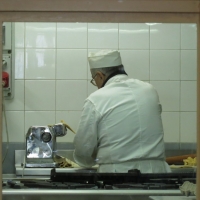 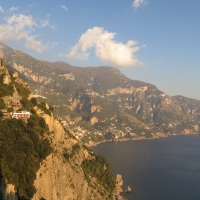 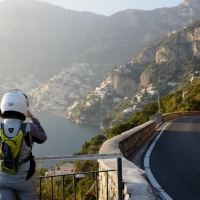 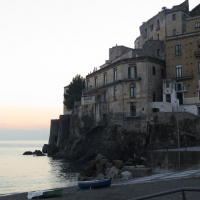
The next morning we enjoy a lovely breakfast of fresh bread, home-made jam, peach juice, fruit and pieces of cake. There is a small table right in front of the window to the kitchen where the cook is working. We see him making fresh pasta for that night. Wish we could stay for another lovely dinner, but we have a ferry to go to.
From the farmhouse it is another 60 kilometres to Salerno. From there we will take the ferry to Sicily later that evening. After a lovely relaxed morning, we leave the farm and ride an absolutely fabulous road along the Amalfi Coast. The coastal road is considered one of the most beautiful in the world. The area is even on the World Heritage List of UNESCO. And indeed, it is very beautiful. The sun is shining while we follow the winding road, stopping now and then to take some pictures. It is not busy at all, but what would you expect on a Friday afternoon in December. Life is great!
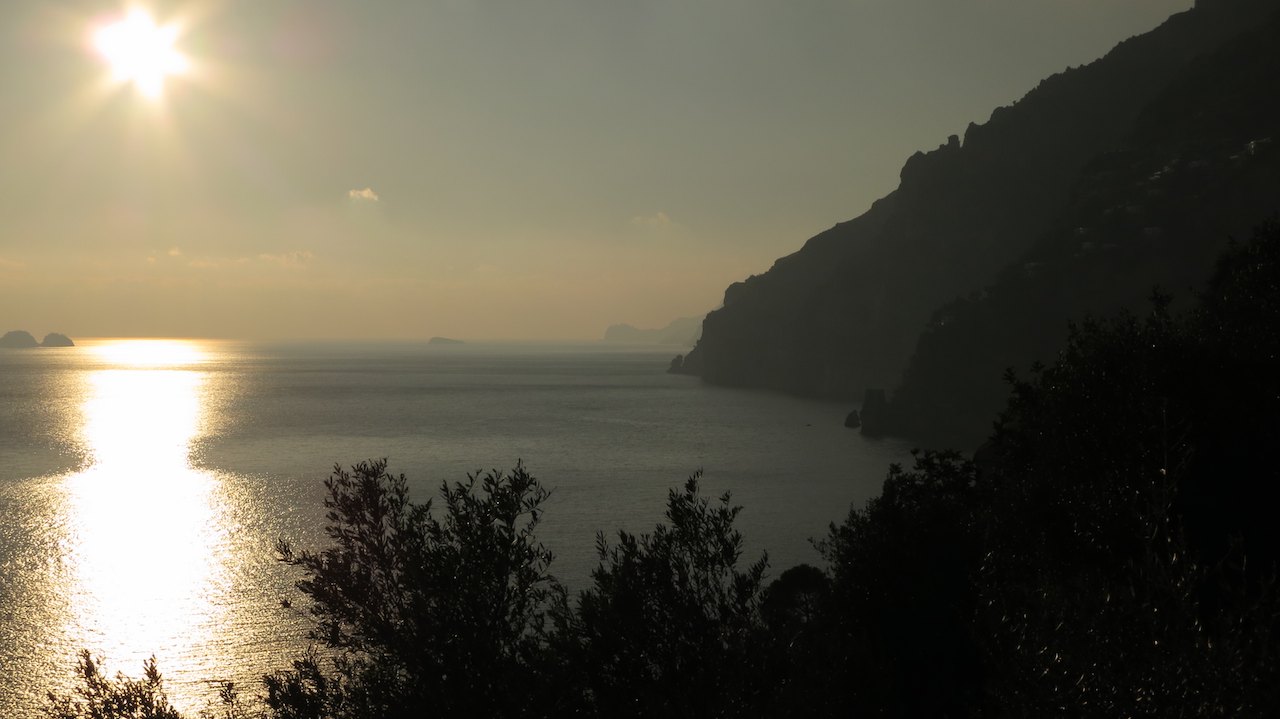
As dusk falls, we arrive in Salerno and find a place in the parking lot at the harbour. While we are there for a while, the parking lot slowly fills with packed cars. The boat we take to Palermo only makes a quick stop there before it continues to Tunis. The packed cars belong to Tunisians that are going on holiday to Tunisia. All cars have a huge amount of stuff on the roof. In some cases the pile on the roof is as large than the car itself. They take all sorts of things; chairs, tables, cabinets, bicycles and even scooters. The pile is held together by a piece of tarpaulin with a rope around it. The stuff that does not fit in the car, is tied to the rope and dangles behind the car. Each of the cars in very low in its suspension, almost touching the ground. It is a miracle these cars were even able to drive to the harbour.
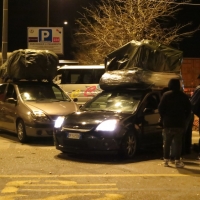 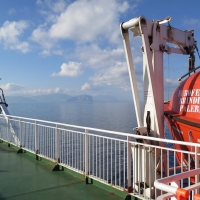 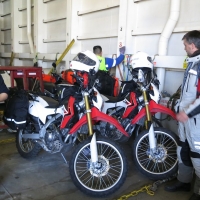 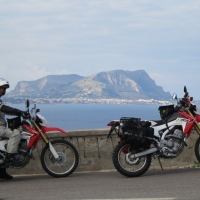
At 21:30 the first packed cars are allowed through the gate, to the ferry. As we only go to Palermo, we will have to get off the ferry first. This also means that we can only get on the ferry last. Eventually we are allowed through the gate and onto the ferry well after 23:00. We strap down our bikes with the help of the friendly staff and find a place to sleep on the boat. We did not book a cabin, but chose to sit in the ’Luxury Chairs’. It is not very busy, so we both lie down transversely on a row of chairs and try to get some sleep.
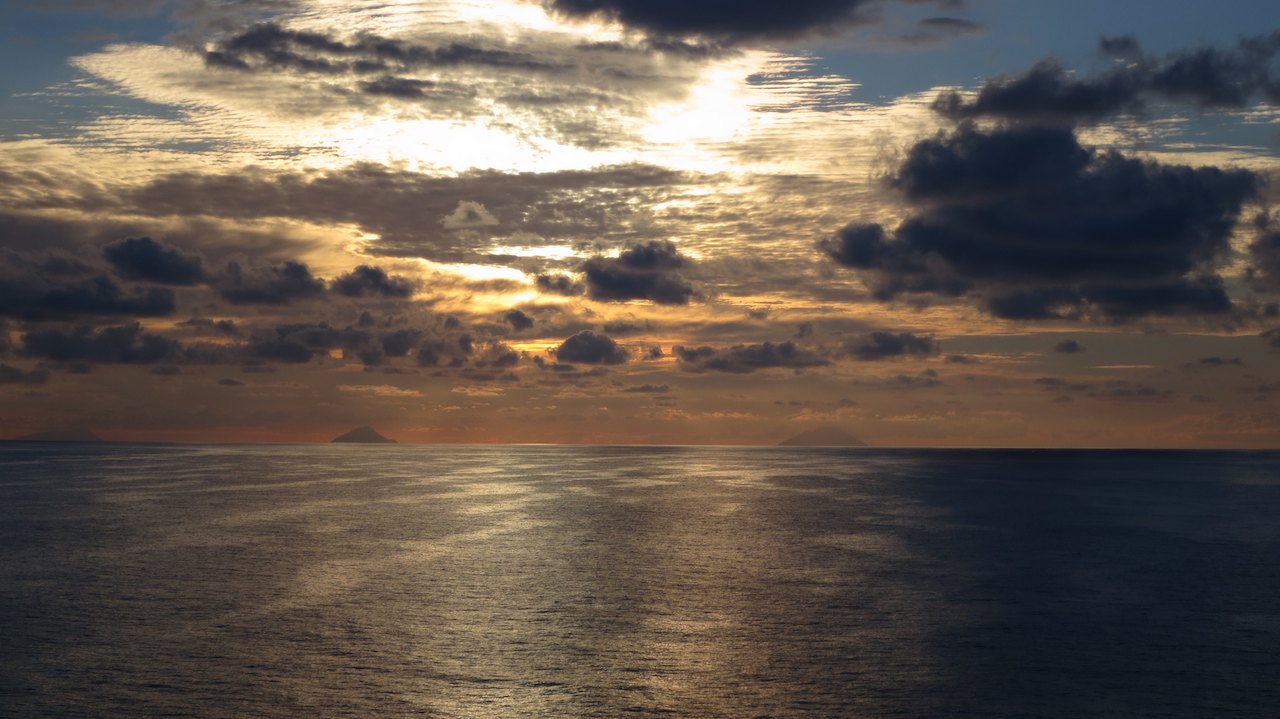
After a very short night on our bumpy beds, we eat some cakes for breakfast and watch Sicily become bigger and bigger on the horizon. Two hours later than planned, we disembark in Palermo. The GPS shows us in the direction of the hotel in Santa Flavia. It is Saturday morning and it is busy in the streets, especially with people who are getting their weekend groceries. We drive through the main streets with fruit stalls on both sides of the road, almost blocking the street. We arrive at the hotel in the beginning of the afternoon and lie down for a long deep sleep. We both need to catch up. We get only get of of our beds to get some food.
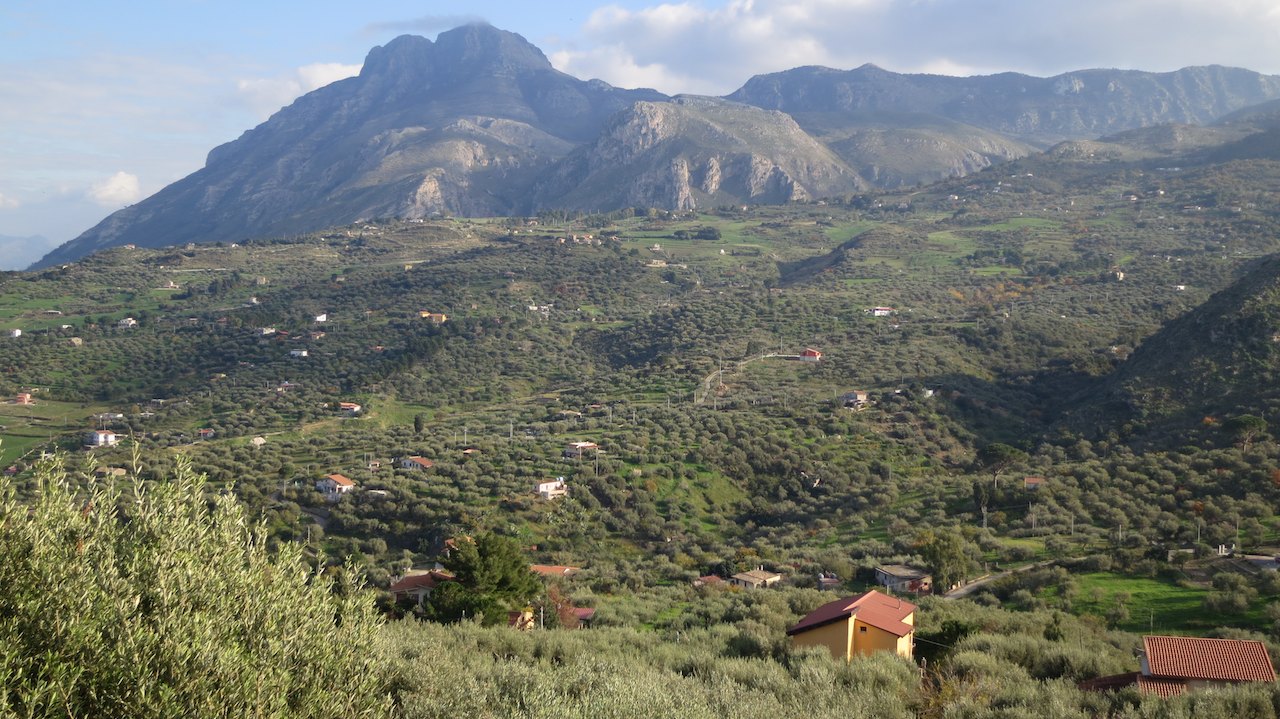
The next day, we go for a ride around Sicily. The villages are now empty, a huge contrast to the day before. We drive inland from the coast, through rugged and steep mountains and along picturesque villages. Everything is still green and even still in bloom, beautiful! Everywhere we go we see stalls selling fruit and vegetables. Even now, in December, we can get everything we would want to eat.
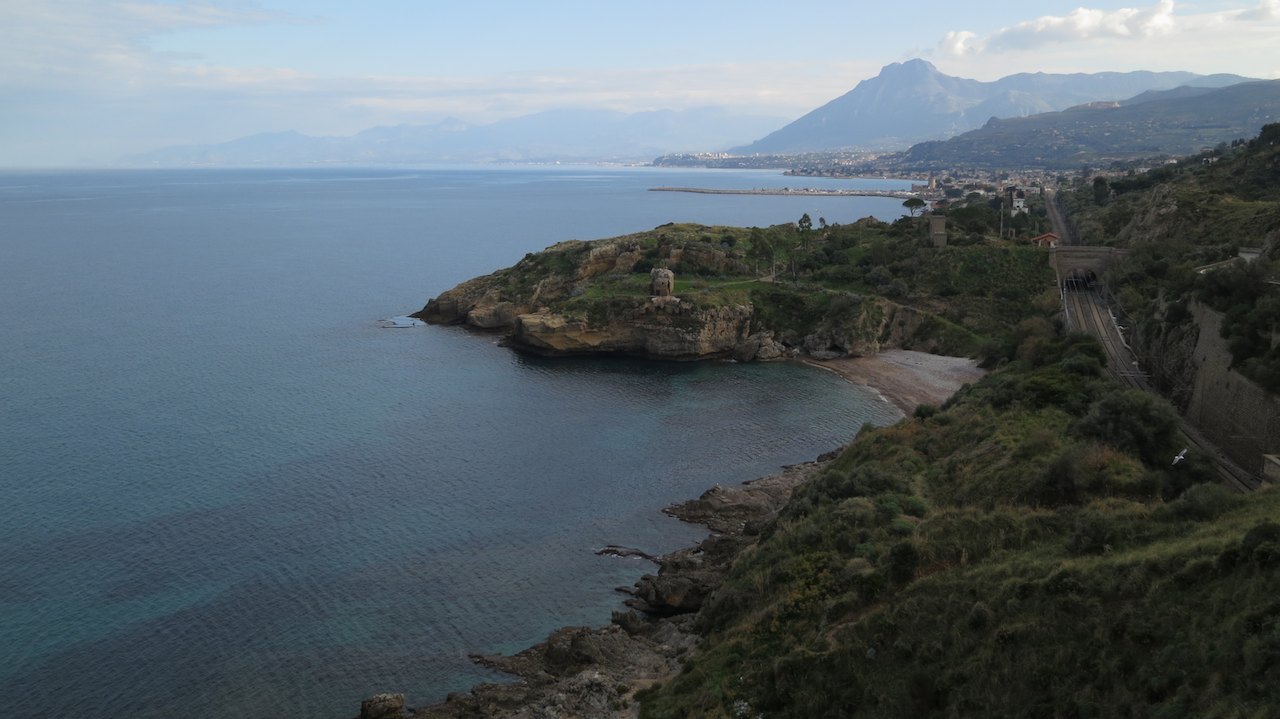
After a much too short visit to Sicily, we head for the harbour again the next day to take the ferry to Tunis. When we arrive at the harbour, we see a long row of battered old cars with huge packs on the roof. That should be the queue for the ferry to Tunis! The cars that are lined up, have even bigger piles on them that the cars we saw in Salerno. Not only chairs, cabinets and scooters, but now also washing machines and refrigerators are ties onto the roof. After a long wait of more than four hours, we are the first passengers that are allowed onto the ship. We strap our bikes down for the trip to Tunis. This time we did book a nice little cabin with a private bathroom. A very good decision, because while the cars are still being loaded onto the ferry below decks, we crawl into our bunk bed and dream about what is to come: Africa!
Distance travelled to Sicily: 2,663 km (1,655 miles)
|

14 Aug 2014
|
|
Registered Users
HUBB regular
|
|
Join Date: Dec 2009
Location: The Netherlands
Posts: 66
|
|
|
We are in Africa!
After our night in the bunk bed on the ferry, we wake up well rested the next morning. Freshly showered, we go out to look for a cup of coffee. When we leave our cabin and go to the front desk we immediately notice how busy it already is. Even though the ferry will only arrive in Tunis in a couple of hours, dozens of people have already come to the front desk ready to leave the ferry.
As we walk further, we find people sleeping everywhere. Men and women of all ages and even families with young children, everyone is in the corridors of the ferry, on chairs and benches, on the floor in the elevator and even in the ball room of the children’s paradise. The one on a mattress with a blanket, but the other just under a coat. When we go up the stairs we have to step over people sleeping to go out.
After a tour on the boat and a cup of coffee, we go back to our cabin. At the reception it is even more crowded with waiting passengers now. All of them with at least three large bags, too heavy to lift. If after a while we have to leave our cabin, the area at the front desk is so full of people and suitcases that we can not even go there. We put our stuff in the hallway and wait patiently until we can get off the boat. Given the expected arrival time this could still take another hour. Passengers leaving the huts around us seem to be mostly wealthy Tunisians. We were clearly on the better part of the boat.
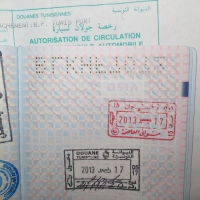 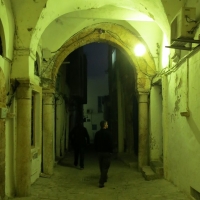 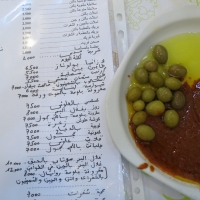 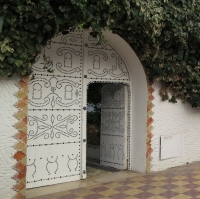
From the area at the front desk a staircase and an escalator go down to the exit. The escalator is not moving yet, they are awaiting the moment when the boat has stopped. One passenger after another tries to skip the line and find a good place on the stairs or the escalator. A hilarious sight because they also want to take their too heavy bags with them. People are crawling over each other and handing each other the bags over the heads of others. All this while we are still not able to get off the boat.
The number of people in the reception area is still growing. The Italian staff of the boat, led by the only blond guy on the ferry, tries to make people wait in line to end the chaos. That seems to work out OK, until the moment when the escalator starts moving in the wrong direction! The escalator runs smoothly upwards, taking all the passengers who were already on the escalator with their suitcases upstairs, to the already crowded front desk. Everyone falls over each other, suitcases are piling up, babies are crying, men are screaming, the chaos is complete.
After a while, when the crowd finally moves towards the exit, we join them to the lower deck of the ferry. The doors of the ferry are already open and the bikes have already been loosened. If we have tied all the stuff on the bikes we can ride off the boat first, before al the cars. We zigzag between the passengers that leave the boat by foot.
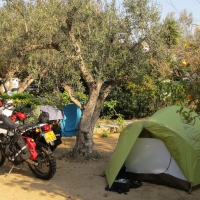 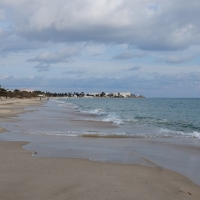 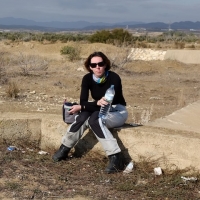 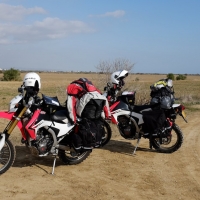
We drive into a large empty hall, with several booths at the front. Next to one of the booths are two men in a uniform. They point out where we can park the bikes and ask for our papers. Everything is in French, which I can luckily understand. We hand in the document that we had filled out on the ferry. They ask us about our route, stamp our papers and send us through. We pass the police and drive into another large hall. In this hall are even more men in uniform, telling us where to park.
A man, without an uniform, gives us a document we have to fill out. He is giving instructions and says he will arrange it for us. We have seen that before, at the border in Morocco. These “helpers” or “fixers” help you with the formalities and make sure you get the right stamps. They do ask a fee for their services. This time we do not want to use their services. As everyone speaks French, and I can make myself understood clearly in French, we will first try it ourselves. We will be using fixers in other countries, especially where we do not speak the language.
When we have completed the documents we give them to one of the men in uniform. He looks at our passports and papers and wants to see where the serial number on the bike is. Then he asks Peter to open his bags. The man rummages through one of the bags roughly and says it is OK. He did not even look into the other bags. He scribbles something on one of the papers and sends me to a ticket window. Once there, the lady sends me to another ticket window because we are still missing one important stamp. I find the right office, get the stamps and am back at her ticket window. She is very helpful and explains exactly what documents we need.
In accordance with her instruction we give a number of documents to the officials at customs, another document to the police and we keep one document in our pocket. An hour after we got off the ferry, we drive away from the compound, into Tunisia. We are in Africa!
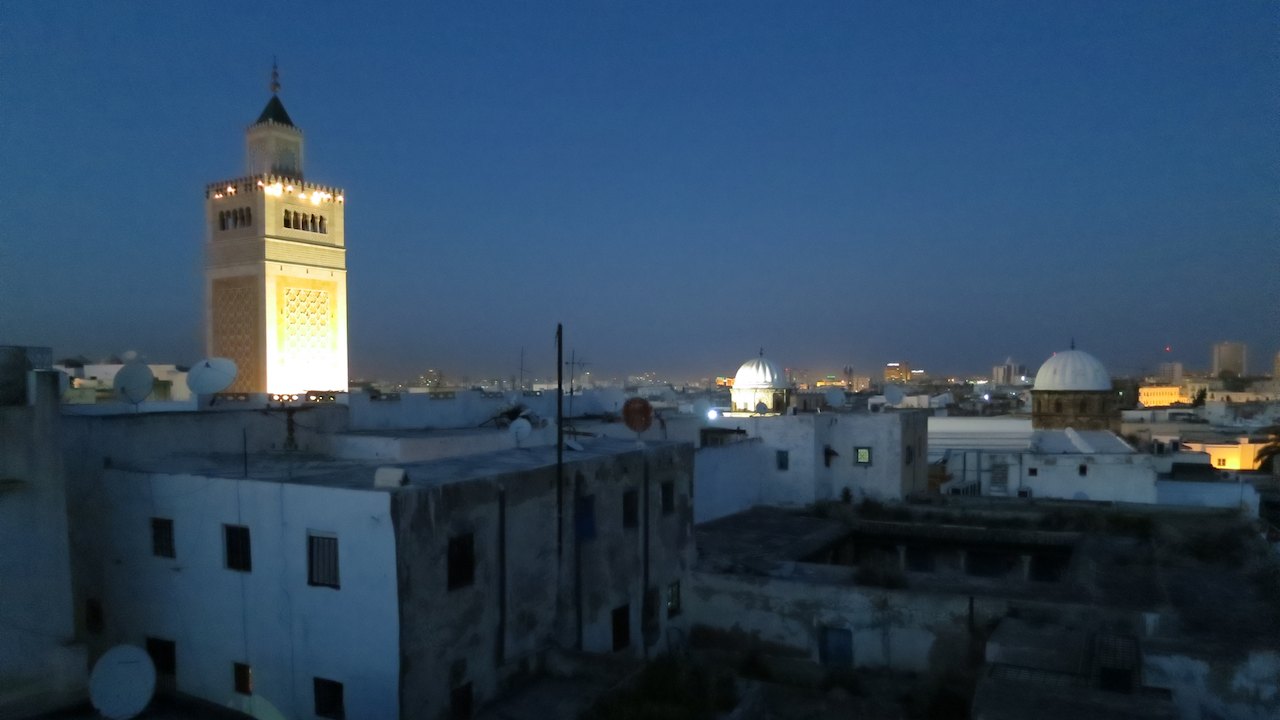
On the way to the center of Tunis, we are warmly welcomed by people who drive up in their car next to us, honking their horn, giving us thumbs up or shouting out of the window. The hotel we booked is in the middle of the city on the Avenue Habib Bourguiba, one of the main shopping streets. It looks like Paris, a wide street with a green strip in the middle and along the entire route a sidewalk with cafes. All terraces are full, it is very crowded. This while it is half three in the afternoon on a Tuesday, it could have been a Saturday. We immediately notice how fashionable everyone is dressed. The one is even more beautiful than the other. It gives us even more the idea that we are in Paris.
We quickly find the hotel. We can park the bikes in the garage under the hotel. The hotel is close to the “medina” of Tunis, which is the old part of town that consists of a maze of small streets with shops. We decide to go there before it is dark. If we are on the way there, we are approached by a guy who claims to know us from our hotel. (Strange for we had not seen him there). He happily tells us all about Tunisia, Tunis, and the history of the medina. He also tells us that today is a holiday, which explains why it was so crowded in the street. He is on his way home, but can bring us to a lookout point in the medina. Fine, why not.
He leads us deeper and deeper into the medina. We are led to a souvenir shop where we would have a stunning view over Tunis. Once we are on the roof after climbing five flights of stairs, we are indeed rewarded with a magnificent view of Tunis. The sun is down and the sound of the muezzin calling for prayer sounds from the minarets.
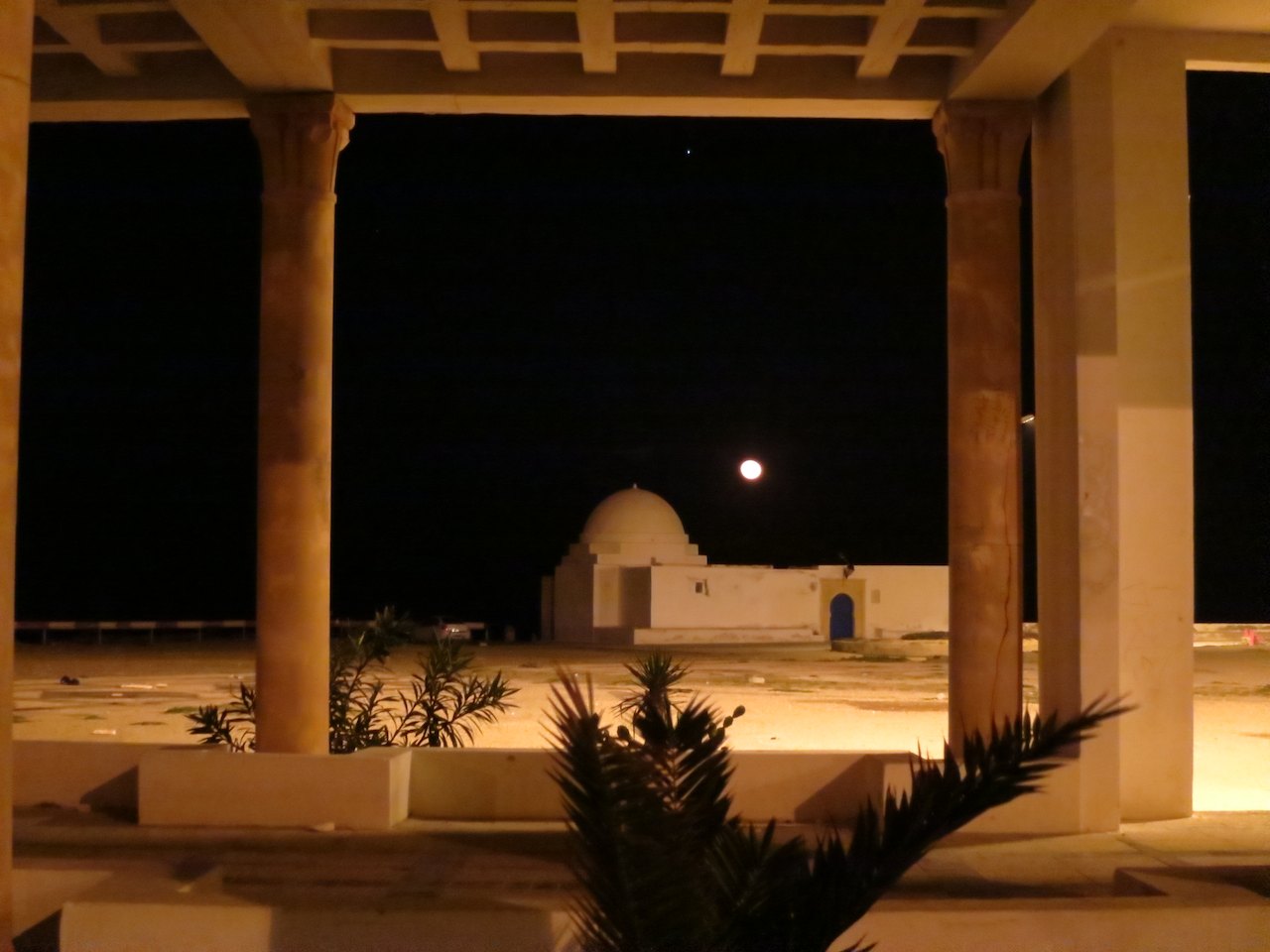
Back in the shop, the sellers directly approach us with all sorts of goods. Before we know it, Peter is sitting on the bed of the sultan. Just before we get a demonstration of carpets, we managed to leave the store. Behind us we hear: “Look, look, no buy.” We again honour our reputation as Dutchies.
The guy, Ahmed, leads us further through the medina. We are not surprised if he leads us into the perfume shop of his ’father’. As a professional salesman he begins a story about how the perfume is extracted from the flowers. After some time we manage to leave the shop, again without buying any perfume. Ahmed walks with us to the beginning of the street and then points in the direction we need to go. Let’s hope that we can find our way back in the maze of streets.
In the beginning the streets and shops are still familiar to us, but after some time we do not recognize anything anymore. We walk a bit further, trusting our internal compass, but then decide to ask directions. It appears we are not really close to our hotel and have to walk a great distance to get there. When we finally arrive at the hotel, we sit down for diner in a small restaurant that is clearly not set up for tourists. Tunisian cuisine is great. We first get a plate with olives, olive oil and harissa. The latter is a Tunisian hot red sauce of peppers, tomatoes, cumin, coriander and garlic. The pasta and couscous we then eat is also full of peppers. It is delicious!
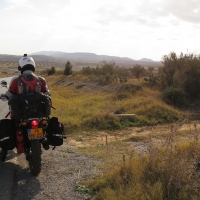 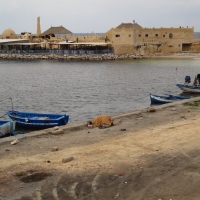 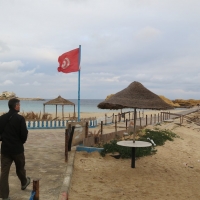 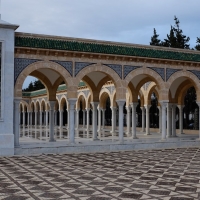
Now we are in Tunisia, we would like to camp. It should be warm enough to sleep in a sleeping bag and it would lower our expenses.The next day we find a campsite in Nabeul, a small 100km (62 miles) from Tunis. For the first time this trip, we put up our tent underneath the orange trees on the property. A beautiful spot. We arrived early, so we have enough time for a walk on the nearby beach. It ‘s quite windy and chilly, but delicious. We are amazed by the large amount of trash on the beach. There is not just trash that has washed up, the beach is clearly used as a landfill.
That night we eat a delicious, home-cooked pasta and we crawl into our trusting sleeping bags. We hope to be able to camp a lot more the coming days. On the internet we find the addresses of two campsites a little further south near Sousse. We pack up the next morning and head south. We drive along the coast for a long time. The beach is not wide and right next to a marshy land with vegetation and stagnant water. The road runs right next to it. Again there is a lot of garbage next to the road. Sometimes neatly in piles as sheared from the tailgate of the pickup. The orchards of olive trees are strewn with plastic bags, which are spread by the wind.
We take a tour through the inlands, away from the sea. The landscape changes immediately. It is gentler and dryer. We drive along olive groves, where a row of cactuses serves as a fence. Here and there sheep are grazing, always with a sheep herder dressed in brown. We pass several villages where the most beautiful building is the mosque, with a high minaret that you can see from far away.
At the beginning of the afternoon we arrive in Sousse, a city where many tourists stay in the summer. It’s crowded in the city. The skills we have gained in the Italian traffic are of much use now. It is a game of giving way and taking it. After we have driven through the busy city for half an hour, we find the spot where a campsite should be. We only find a very crowded hostel. We decide to drive to Monastir where another campsite should be.
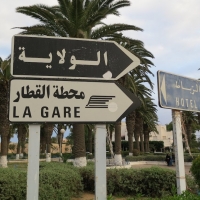 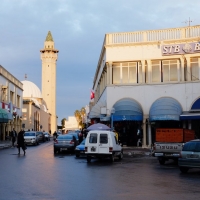 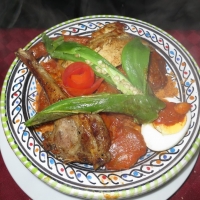 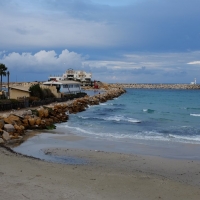
When we enter Monastir we are immediately pleasantly surprised by the view. It is a much smaller city than Sousse, along a slightly elevated rocky coast. If the GPS indicates that have arrived at the campsite, we only see a dirty beach and a playground. No camping. It now is too late to search for another campsite, so we check into a hotel. We are very warmly welcomed at Hotel Mezri. The receptionist immediately comes out to open the garage to do so we can park the bikes inside. We decide to stay two nights and visit the village and the mausoleum of the first president of Tunisia the next day.
After two relaxed days in Monastir, we once again attempt to find a campsite. On the Internet we have read enthusiastic stories about Camping El Kahena near Sfax. We drive on a fairly busy main road to the south. Although we drive relatively fast, we are regularly overtaken by even faster cars. Some cars remain next to us for a while, to get a closer look. Others overtake us so tightly that we have to brake not to touch them. We have to pay attention constantly. We catch up with most fast cars each time we enter a village and have to slow down for the many steep thresholds.
By noon we see a man with three baguettes come out of a building. We have not eaten yet and stop to buy bread and water. On the outside of the building you cannot see there is a shop. We only see a door with a blue awning with on the concrete sidewalk some plastic baskets and coiled garden hoses. When I enter, I look at the friendly face of a lady and a girl that could be her daughter. It is definitely a shop. On the floor in front of the counter are sacks of rice and spices.
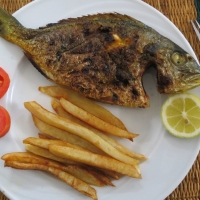 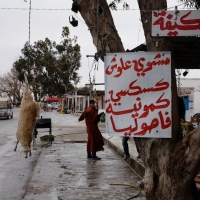 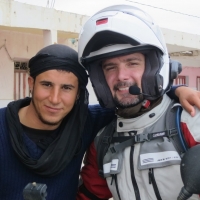 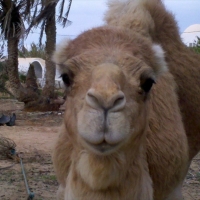
On the shelves behind the counter is all kinds of stuff; detergent, toothpaste, pasta sauce, jam, etc. On the counter there are jars with candies and a calculator that serves as a cash register. I ask for a loaf of bread and a bottle of water. If I want to pay, the lady put a pack of juice on the counter. I can take it for free for on the road. When I have paid, she gives me too much change back and says it is OK. After I have thanked her warmly and all stuffed the juice, water and bread in my bags, they wave us goodbye as we drive away. Another special meeting.
At the end of the afternoon, the GPS indicates that we should leave the main road to the left, towards the sea. The road is getting smaller and changes into a sandy path. It has clearly been raining that day because there are deep puddles of water everywhere. We stop to ask directions to the campsite. A group of construction workers tell us to ride further to the sea. When we arrive, we see no camping. We again ask directions. A guy point to the rights and tells us to look out for a high building. Not much later we drive onto the compound of camping El Kahena. The owner and his wife are already awaiting us. We suspect that they had been informed of our arrival by telephone by the people in the village. The garage is opened and just before it starts raining very hard we park the bikes.
The owner shows us that he also has rooms with sea view for a good price. With the rain pouring now, the choice is easy: the tent stays in our bags again. That evening we enjoy a truly delicious meal, cooked by the wife of the owner. Dinner is served in a huge dining room where one table is covered especially for us, the only guests in the hotel. After dinner, we are invited for tea and talk with the owner about Tunisia, its customs and habits. He advises us to drive to the island of Djerba just off the coast of Tunisia.
The next morning we start the bikes a little earlier than the last days, so we can make it to Djerba before dusk. It is about 300 km (186 miles) on a busy road. Even now, we are often overtaken and have to be very careful. It is a very strenuous ride. At some point we pass dozens of stalls selling souvenirs on the side of the road. Each stall is numbered and sells about the same: shells, stuffed camels for kids, dates and wicker baskets. We suspect that tourist buses stop here during the summer for necessary purchases. Now, the stalls are visited by Tunisians.
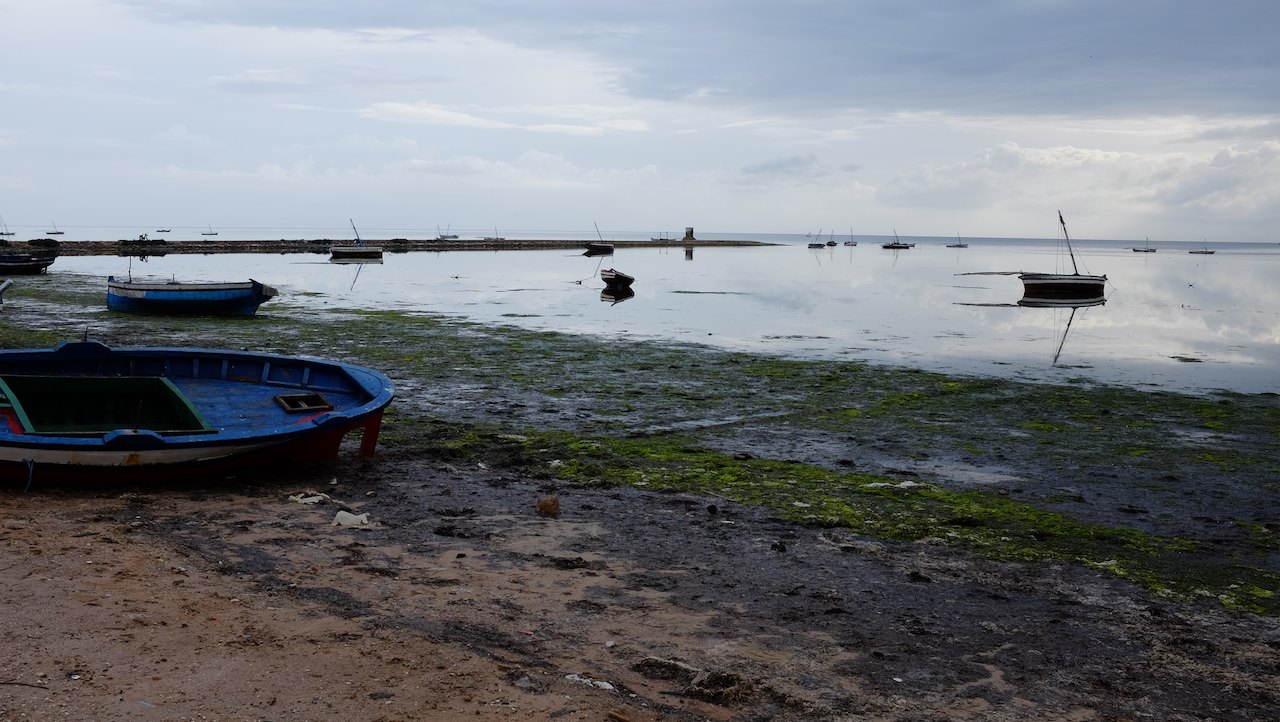
A bit further there suddenly is a great number of dead sheep along the side of the road. For over a kilometre, we pass restaurant after restaurant with on their terraces dead sheep hung on their hind legs with a red spot on the ground. The sheep are ready to be roasted on the barbecue that is smoking just next to them. If we stop to take a picture, one of the guys lifts a dead sheep over his head. Then he wants have his picture taken with Peter. It is a remarkable sight, BBQ street .
The remainder of the day we drive along groves filled with olive trees. The landscape is changing the further we drive south. We are seeing more and more palm trees, sandy plains covered with low bushes. This is especially so when we get off the main road to go to the island of Djerba.
To reach the island, we have to take the ferry. We are waved through by the police, who indicate we should pass the cars that are already wanting for the boat. We park in front of the row. On the ferry we attract a lot of attention. Young guys with scooters come to have a chat about the engine size and the tires. A group of children and their mother and grandmother are looking at the helmet with the microphones. Especially when Peter walks away and we keep talking to each other through to headset they laugh heartily. The grandmother, a beautiful woman with very pretty gowns and black Henna hands, comes to look at the GPS and then reports to her grandchildren. Very cool.
In Djerba we have spend a few days in a hotel to spend Christmas. A break in our journey. At first is was raining all day, but the storm is going down and the sun has emerged again. Meanwhile, we hear the first planes arrive with tourists who spend the holidays here in the sun.
Distance travelled to Djerba: 3,405 km (2,116 miles)
|

26 Aug 2014
|
|
Registered Users
HUBB regular
|
|
Join Date: Dec 2009
Location: The Netherlands
Posts: 66
|
|
|
Welcome to Libya!
Ever since we applied for the visas I had butterflies in my stomach from the idea that we would go to Libya. The media reports on Libya are not exactly positive. The revolution in 2011 has ensured that Gaddafi no longer controls the country and that Libya is open to the world now. However, the new government is not in full control yet and different groups try to disrupt things on a regular basis. Especially around Benghazi incidents occur regularly, of which foreigners have been victim as well.
The butterflies in my stomach steadily increased as we got closer to the Libyan border. Every day Peter and I would discuss the route that we could ride in Libya, but also alternative routes that we could take to avoid Libya and perhaps even Egypt all together. We followed the news about Libya closely and saw that mid-December a bomb had exploded at a police checkpoint just out of Benghazi.
The travel advice from the Dutch Ministry of Foreign Affairs was further tightened on December 23. They advised against travelling to Benghazi and against ’non-essential’ trips to other parts of the country. The travel advice of the British Government was even more negative, with almost the entire country coloured red and only certain areas along the coast where one could travel.
Peter felt OK about the challenge of going to Libya, but I did not really feel up for it. On 24 December on the island of Djerba in Tunisia we drove to the airport in the pouring rain to get information about flying to Egypt or Sudan. We would drive back to Tunis, have a crate made for the bikes and fly from Tunis to Cairo or Khartoum with the bikes. A long detour and a lot of hassle, but maybe a lot safer.
At the same time we had contact by email with our contact person in Libya, Masoud. He had helped to get the visas and could tell us more about the current security situation in Libya. He assured us that the media create a very negative image of Libya, but that life in Libya is normal as in any other African country. The disturbances were an internal matter and not aimed at travellers. He let us know that he was expecting two other motorcycle riders with whom we might ride together to the Egyptian border. He also referred us to the websites of other motorcycle travellers who had previously ridden through Libya. Each of them with very positive stories.
Our visas were valid until December 28. If we would to go to Libya, we would do so on December 27, so we would have no problems with expiring visas. We decided to drive from Djerba to Ben Guardane (Tunisia), from which town is would be a 30km (18 miles) drive to the border with Libya. In Ben Guardane a final decision would have to be taken.
———
The sun is shining as we drive away from our hotel in Djerba on Boxing Day. There is a lot of wind and despite the sun is quite chilly. The intercom is open, but neither of us says a word. My thoughts are with the decision that has to be taken. I think about the list of “pro’s” and “con’s” that I had made the night before and hope that I will find the solution.
For the first time this trip we are stopped at a police checkpoint. We show our passports and answer questions about our itinerary and our stay in Tunisia. They let us through, but a few kilometres we are again requested to stop at a checkpoint. This time the passports are not enough, they want to inspect our bags. So be it. One by one we both open our bags after which the police, boys in their early twenties, search our bags. If the bags with our clothes and our cooking pans are studied, they apologize: “ Sorry, this is my job. Welcome in Tunisia, I hope you have a good time.” After fifteen minutes all the bags are shut and we continue our route to Ben Guardane.
Around noon we ride into Ben Guardane. We are looking for petrol, an ATM and a hotel. I am lost in my thoughts while searching for my wallet when I hear Peter say: “ Look next to you”. When I look up there are two fully packed BMW bikes parked next to us with British number plates. The tough motorcycle goggles and helmets go off and we shake hands with Billy and Ross. They are on their way from London to Cape Town and want to drive through Libya to Egypt. These are the two motorcycle travellers about whom Masoud, our contact in Libya, had told us.
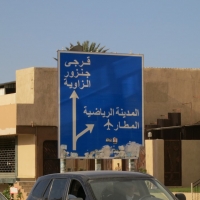 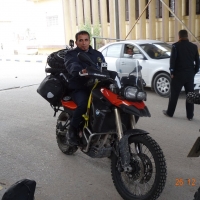 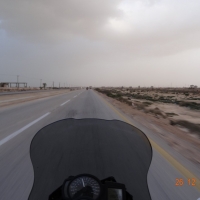 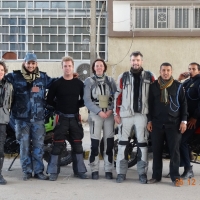
It is always nice to meet other motorcycle travellers, but this time my heart made a little jump. The idea that we could possibly ride part of the route together with them is strangely enough reassuring. When I look at Peter I remember the words of his father: “ A solution will show itself.” When it turns out that Billy and Ross do not mind that we ride with them across the border and into Libya, the decision is made: We are going to Libya. I inform Masoud by SMS that we will cross the border that same day, together with other motorcycle riders. With new energy, we ride to the Tunisian-Libyan border.
It is not busy when we arrive at the Tunisian border early in the afternoon. We can immediately drive to one of the booths and before we know it we all have a stamp in our passport to leave the country. We then have to wait until we also receive a stamp to export our bikes again. Unfortunately It is lunch time, so only after more than an hour we get our passports back with a stamp for the bikes. We can finally move on, to the Libyan border.
On the Libyan side of the border, we are awaited by Masoud. He welcomes us warmly and asks for our passports. He will arrange for us to get the right stamps in order to enter the country. While we are waiting, a car stops next to us. An elderly man runs his window. He asks Peter where we come from and where we are going . Then he starts laughing and calling loudly “ Hollanda? Welcome to my country! Welcome to Libyaaaa” Also from other cars that pass us it sounds “ Welcome“, “ Welcome to Libya, thank you for visiting.” A warm welcome!
On the Libyan side of the border the bikes have to be registered again. Masoud takes Billy and me in his car across the border to withdraw money and buy insurance for the bikes. In the meanwhile Peter and Ross stay with the bikes, which are parked in front of the office of customs. The office of the insurance company only consists of a counter, a desk with a computer and some chairs. Billy and I sit on the chairs while Masoud talks to the guy from the insurance company about the details of the bikes. The bank was closed and the ATM was not working, but Masoud came to the rescue by paying the cost of the insurance (40 Libyan Dinar per bikes) for us. We could repay him later.
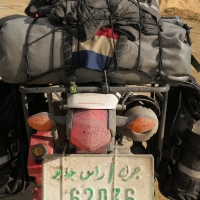 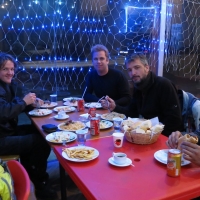 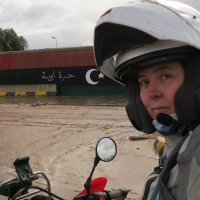 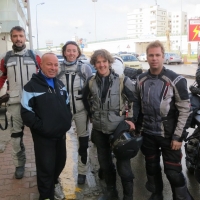
With the insurance in our hand, we drive back to Peter and Ross. They have made new friends at the customs. Ross gets his first lessons Arabic from a man who points at parts of the bikes, then says the Arabic word, after which Ross writes down the words phonetically in a little brown book. Although we were told not to take any pictures at the border, the men want to take pictures themselves. Every one of them pulls out a phone after which an extended photo session follows. In the mean time Masoud is in another office trying to get us Libyan plates (which he also paid for). Our familiar yellow plate is covered with a white plate with green Arabic numbers on it.
After all formalities are completed, we ask Masoud directions to the hotel in Sabratha which Ross and Billy had already booked. A hotel is out of the question, tonight we are Masouds guests and we will sleep at his house in Zuwara, at about 60km (36 miles) from the border. “ You follow me” he says. At high speed and with his hazard lights on he rides in front of us to Zuwara. We can only just keep up with him. As the evening sets in, we park the bikes on a sandy area along the sea at a cafe. The music in the cafe is loud, in front of the window Christmas lights flash and in the back room a group of boys is playing pool. At the bar they sell coffee and in the fridge next to it is are only sodas. Libya is officially alcohol free, alcohol is prohibited.
Masoud pulls some tables together and takes our order. We eat spaghetti, salad and a plate of fries. Meanwhile Masoud tells about the revolution, the current situation in Libya and the travellers that he helped with their route through Libya before.
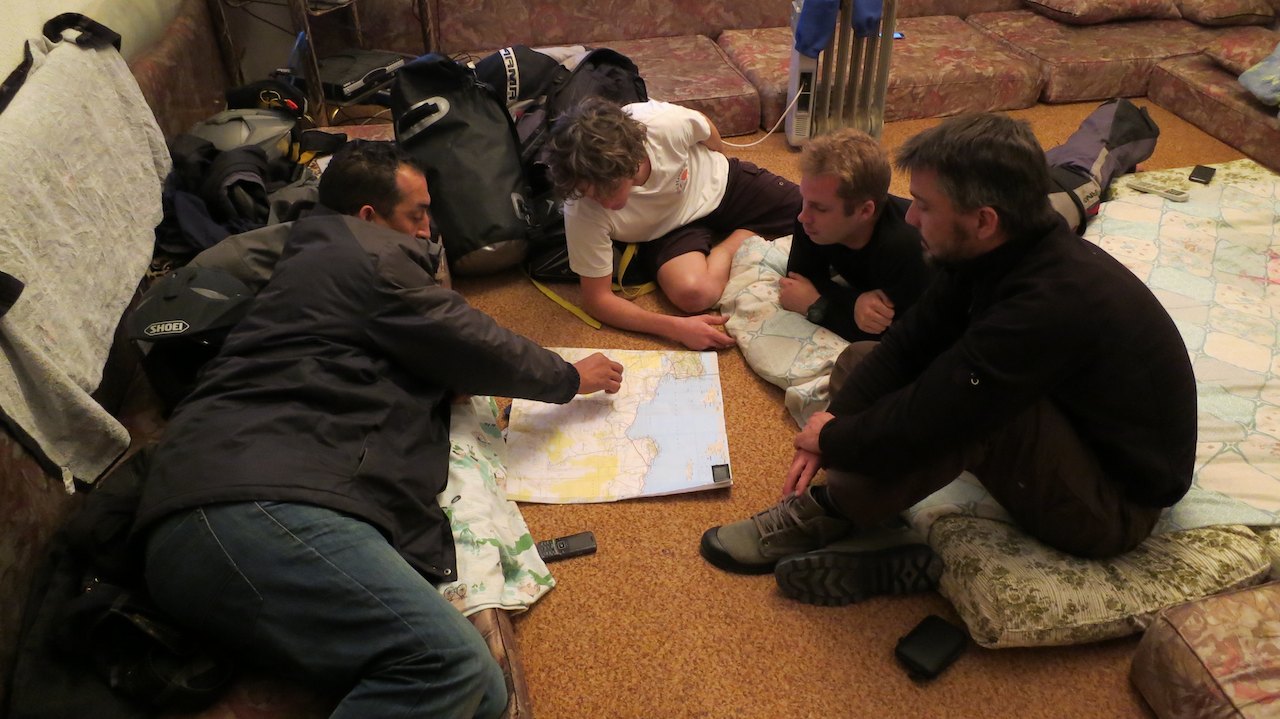
After dinner we drive to the home of Masoud his family. The large metal door opens so we can park the bikes in the courtyard. It is a large house with a huge wooden staircase in the hall, a room for the male guests, several bedrooms, bathrooms and a kitchen. The house is empty. His parents and brothers live elsewhere and only come to the house for family gatherings. Masoud laughs at our stunned reaction and explains that Libya is a big country, so they build big houses, preferably more than one .
With the map of Africa on the floor, we discuss the route we want to drive with Masoud. The plan is to first ride through Tripoli to Khoms to visit the Roman city of Leptis Magna. After that we want to drive in one day to Ras Lanuf, so that we can pass Sirte (The town of Gaddafi) without having to stop there. Then we drive a short distance to Ajdabiya, after which we drive to Tobruk through the desert the next day. The latter mainly to avoid Benghazi and Damah because we those cities seem that have the most problems at this point. Masoud immediately grabs his phone to call contacts in Khoms and Ajdabiya that can help us to find a hotel there.
After we have discussed the route, we again talk about Libya, the revolution, the current situation and the future. It is clear to us that the revolution has done the country good, since the people are no longer at the mercy of the whims of Gaddafi. In the past it could happen that Gaddafi , if he had a quarrel with the U.S., would decide to ban all studies English and burn all English books. He could also decide to place a wall in front of the ocean if he felt that the people did not need the sea. Freedom is best seen in the fact that everyone has access to every conceivable news source now and thus to the rest of the world. It is extraordinary to hear how valuable that is.
Proudly Masoud tells us about all the wonderful things that Libya has to offer. Not only Leptis Magna is worth a visit. In the desert there are many special places worth visiting, including ancient rock art. Also Libya has some really well preserved pyramids. It is clear that he can not wait until he can show all that beauty to other tourists as soon as the country is safe enough to do so.
At the same time you can taste the frustration about the fact that it takes the new government a long time to organize the country. There is still no police force, which means that many rules are violated without any consequences. Things that seem simple to us, like having a bank account and transfer money are hardly possible in Libya. Everyone, including Masoud , carries a lot of cash on them. Because the banks were closed and many ATMs did not work, we exchange our dollars to him for Tunisian dinars. We pay him back for the insurance and license plates. If we want to pay for dinner he puts his hand on his hard and smiles: “ You are my guests, it ‘s my pleasure. Welcome to Libya.”
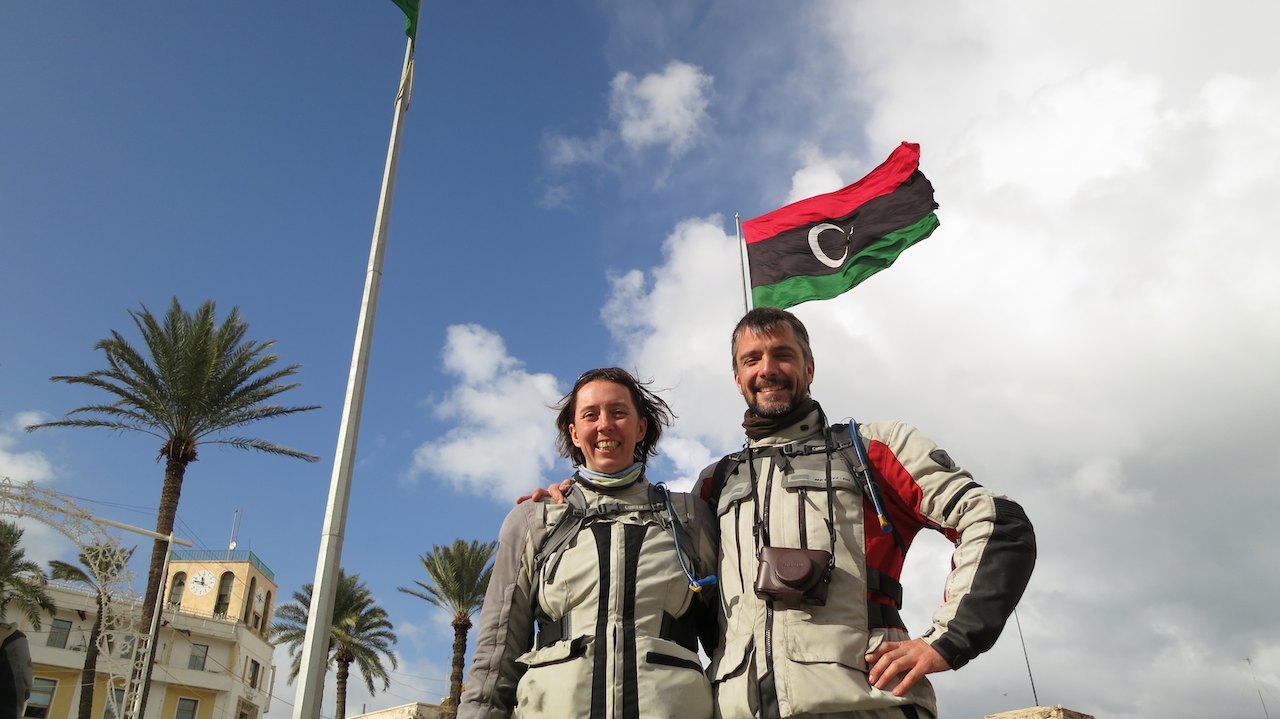
We crawl into our bed early that night. Although we did not ride a long distance today, it was a tiring day, especially with the tension of the border crossing. Before we go to sleep, we talk about how special it was that we met in Ben Guardane that day. It Peter and I had not stopped to fill up, or had not been stopped by the Tunisian police, or had not turned left in Ben Guardane, we would not have met. It do not believe this was a coincidence, there is a reason why we had to meet Billy and Ross.
When we put our stuff on the bike the next morning, Masoud points us to the kitchen. The kitchen table is set for four with yogurt, fruit, olives, harissa, bread, cheese, milk and jam. On the stove a pot of hot water is boiling for tea and coffee. The hospitality of Masoud has no limits. After breakfast, he starts his car and escorts us to the outskirts of Zuwara to the road to Tripoli. Again at high speed and with his lights out, he leads us through the city. Just outside the city, he stops to say goodbye. It feels as if we say goodbye to one of our best friends even though we had never even seen him less than 24 hours ago. We promise to keep in touch and to call if we need anything.
We continue our way to Tripoli. It is a busy road where everyone rides at very high speed. We had already been warned for the poor driving skills in Libya and the Libyans live up to the expectation. I regularly hear Peter warn me over the intercom for ’low flying cars”.
The road is in good condition and we make good progress. Alongside the road we see a lot of building sites. Homes are repaired or rebuilt. Here and there an entire new neighbourhood is build. What is also striking is the huge number of flags. After the revolution Libya has a new flag, which you now find everywhere. Painted on walls, garages, street lights and traffic signs but also proudly flapping on buildings and cars.
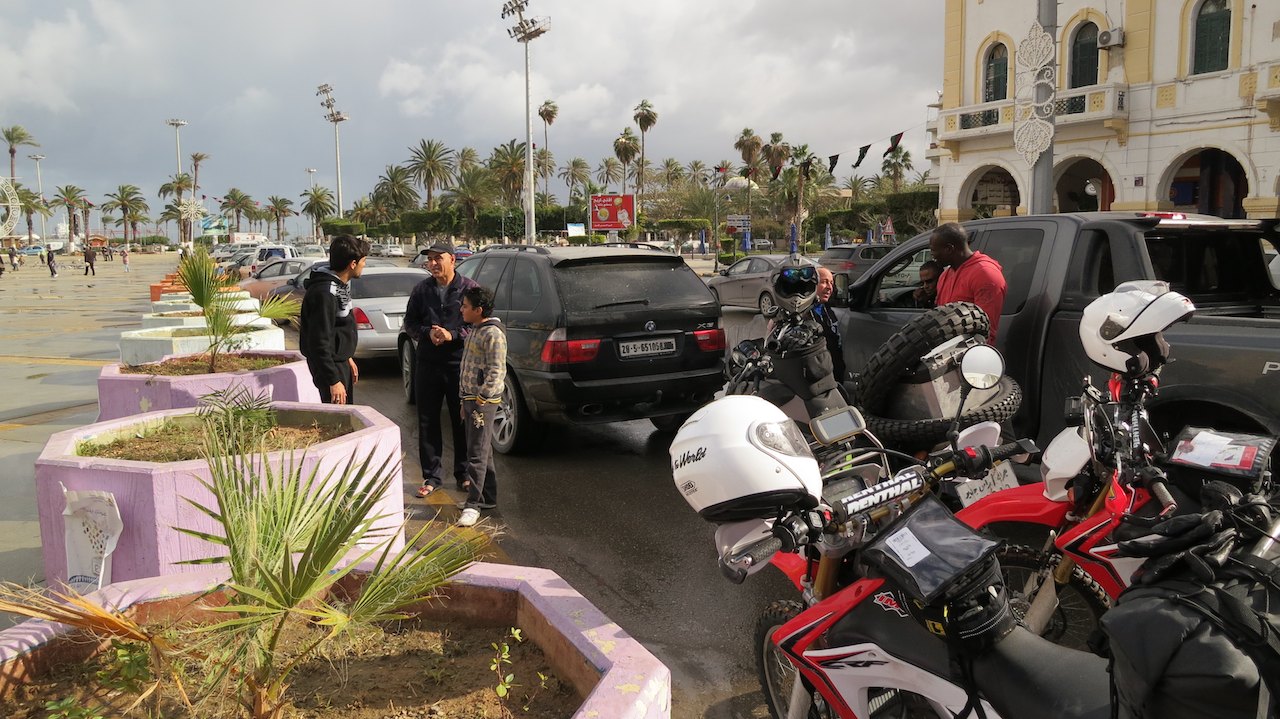
The closer we get to Tripoli, the busier it is, until at some point we are stuck in traffic. We attract quite a bit of attention with the bikes. Everywhere we here “Welcome to Libya” while they gives us thumbs up of make a ’V’ for Victory with their hands. A car pulls up next to Ross. The driver asks him to stop. When all of us are alongside the road, the man explains that he would like to introduce us to the Chairman of the Libyan Motorcycle federation. We follow his big BMW-car to the centre of Tripoli, while manoeuvring between the traffic at high speed .
We stop in a residential area in Tripoli and are introduced to Masaud, “President of the Lybian Motorcycling Federation”. He talks to us about his motorcycles, the motorcycle club of Tripoli, the Libyan Motorcycle Federation and his visit to The Hague at a conference of the FIA. While we are talking, more and more people join. There is another photo shoot. They propose to contact people in the cities that we will still visit. Before we know it, they are calling their contact and have Ross talk to a Libyan motorcyclist who has just completed a tour through twenty countries in Europe.
They want to show us the city of Tripoli. We again drive back behind the large BMW, while one of the other guys stops all traffic for us by putting his car in front. We park on the main square of Tripoli. Masaud talks about Libya and the revolution. Once again it becomes clear how proud everyone is on their country and how much they want tourists to visit it. More and more people join us to say hello. They ask where we come from, where we are going and what we think of Libya. They thank us for visiting and ask us to come again.
When we are about the leave, Peter is stopped by a man who asks him to wait. He wants to give him something. He walks to his car and comes back with a Libyan flag. If he Peter hands over the flag to Peter he says: “ Welcome to Libya my friend!”
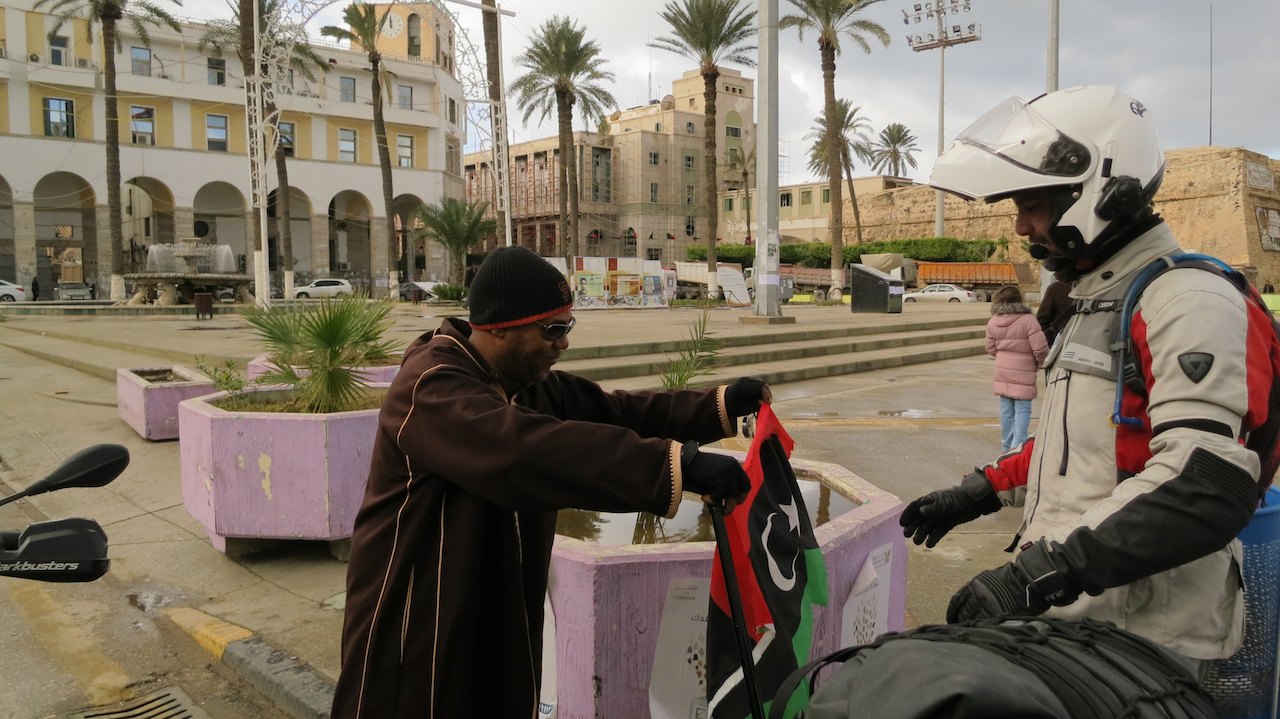
We follow the BMW out of the city. They waive us goodbye only after we have promised to call it we need anything. With some delay we continue our route to Khoms. We still want to visit Leptis Magna before it gets dark. When we arrive in Khoms we call Salah. We had received his phone number from Masoud from Zuwara. Salah would be able to help us to find a hotel. We finally find him at the entrance of Leptis Magna where he had been waiting for a long time already. It appears now that, before he can bring us to a hotel, he will give us a tour around Leptis Magna. We park our bikes and follow Salah to the entrance. “ Welcome to Libya and thank you for visiting” we hear from the booth after which we receive two free tickets.
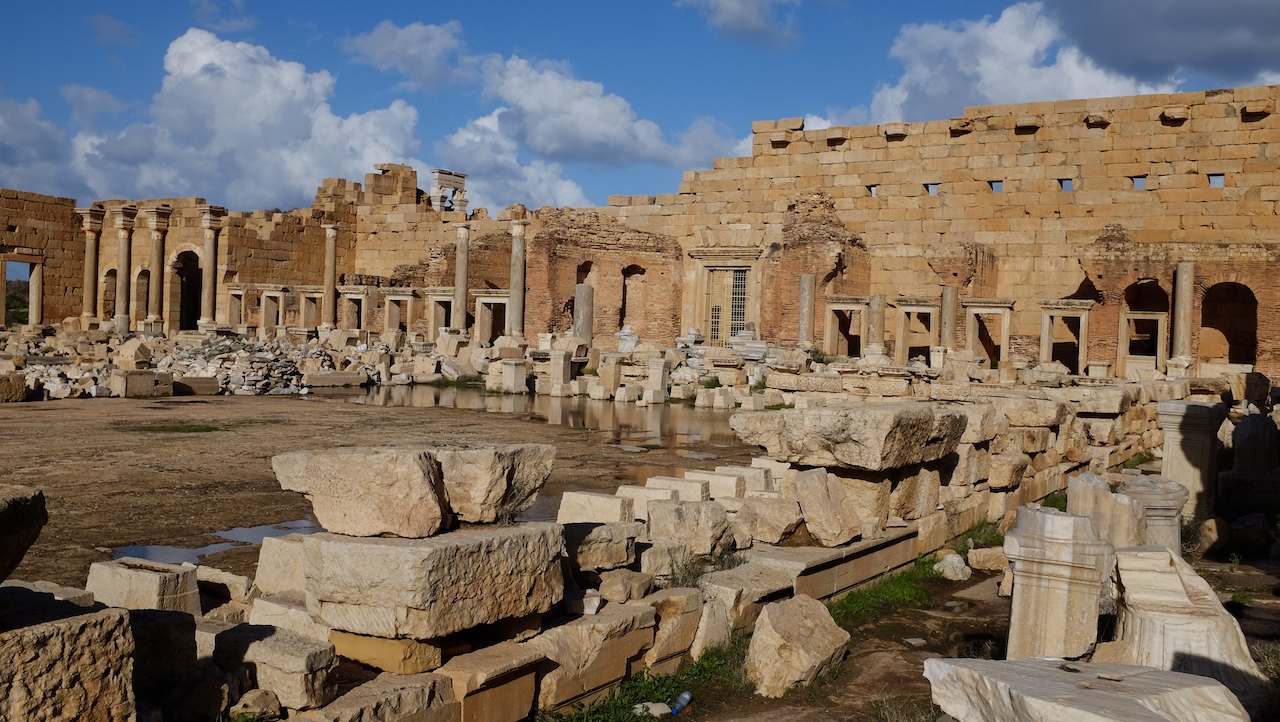

For more than two hours, Salah leads us through Leptis Magna. He has over ten years as a guide and knows a lot about the site. It is beautiful. Especially the amphitheater (which was built by Emperor Nero around 60AC) is incredibly impressive to see. It must have been impressive to fight wild animals and other gladiators on the floor in front of a crowd of 16,000 screaming spectators. Also the theater was very special. Everything had been preserved so good. The buildings were hidden for years under a thick layer of desert sand . Only in the early 20 of the nineteenth century the first structures were discovered, uncovered and restored . Up until now only the most most important objects have been uncovered More than 60% of the city is still hidden under the sand. Salah said that his biggest wish is that he is still alive as the rest of the city is exposed.
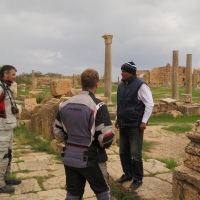 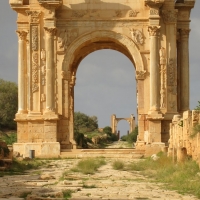 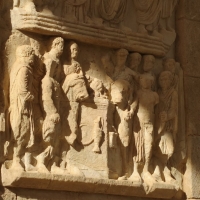 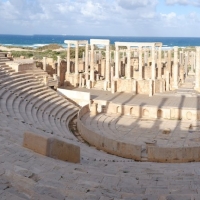
After a very special day in Tripoli and Khoms at Leptis Magna, we ask Salah for directions to a hotel. But again the Libyan hospitality is shown when Salah invites us to stay with him.
Part II on Libya, including the stay at Salah follow soon!
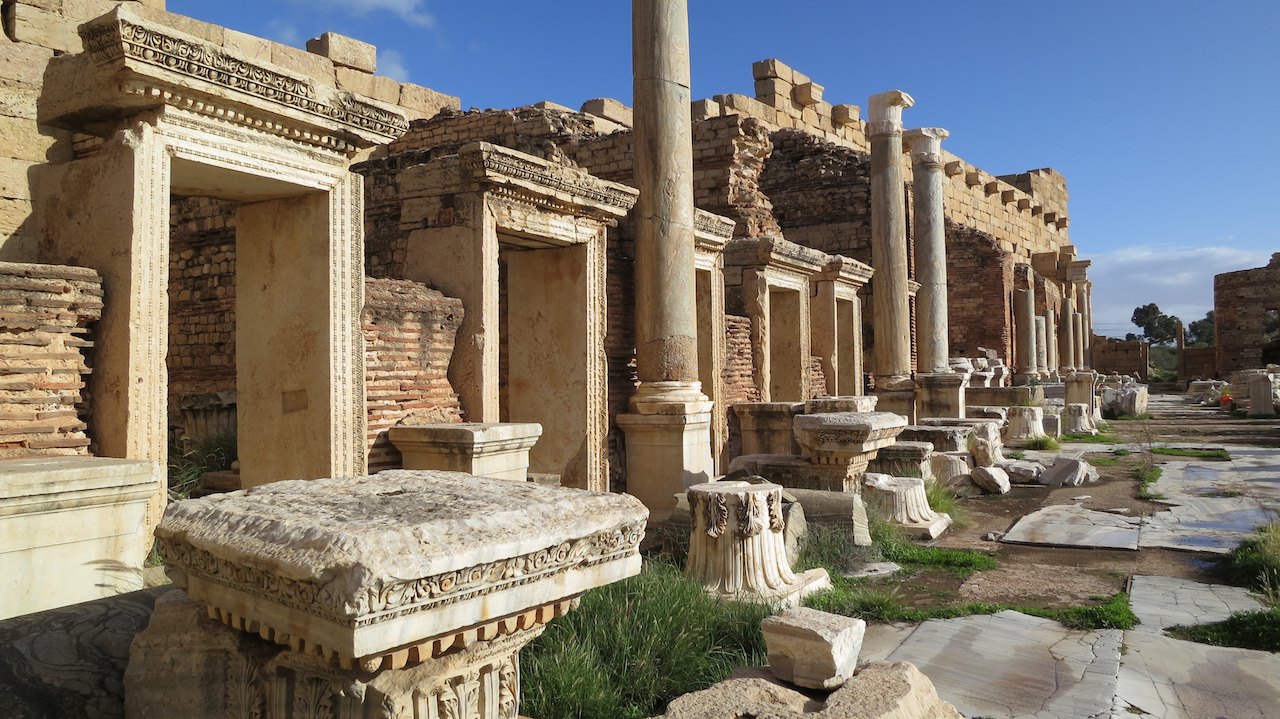
|

27 Aug 2014
|
 |
Registered Users
Veteran HUBBer
|
|
Join Date: Jan 2006
Location: Yuma, Arizona, USA
Posts: 548
|
|
|
You are brave to enter a country in a kind of controlled chaos! I know, not the entire country, but sometimes these places can go downhill quickly leaving outsiders like you stranded inside. Just keep an extra ear out for trouble! And enjoy yourself!!
|

18 Sep 2014
|
|
Registered Users
HUBB regular
|
|
Join Date: Dec 2009
Location: The Netherlands
Posts: 66
|
|
|
The same but very different
Before we ride to Salahs house, we first follow him to a restaurant to get some food. Due to the meeting in Tripoli earlier that day and the unexpected tour of Leptis Magna we did not eat anything for lunch. A little hungry we park the bikes in front of the restaurant where we are warmly welcomed by Mohammed, a friend of Salah. As soon as we get inside, the boys are directed to the toilet. When I want to follow them, Salah and Mohammed redirect me to the second floor. One of the guys from the restaurant runs after me and hands over a box of tissues. Once upstairs, I realize I am in the secluded area of the restaurant which is especially for the women. It is a large room with plastic tables and chairs and a bathroom in the corner. It is not customary for men and women to enjoy their meals in the same room. When women are travelling, if they can, they usually sit in these areas separated from the men.
Downstairs it appears that it is not a problem for me now to join the guys for dinner. We order spaghetti and couscous and also get salad and a plate of fries. Mohammed and Salah sit at our table and tell us about their views on Libya, the revolution and the security situation. They both express the wish that tourism will flourish and tourists come to Libya to visit Leptis Magna and all the other wonderful things. Again it is clear how proud they are of Libya.
There is so much food on the table that we can only just empty our plates. If Billy has managed to empty his entire plate of spaghetti, Muhammad calls one of the guys from the kitchen. Before he knows it a new full plate of spaghetti is in front of Billy. Although he is trying hard to refuse the second plate of spaghetti, they insist that he accepts it. He had already eaten enough, but he nevertheless attempts to eat all of the spaghetti.
After dinner we are offered tea, after which there is a photo session. Both Salah and Muhammad, and also boys from the kitchen, get their phone to take pictures. We make over 10 group photos.
When we want to pay the bill, we fail to pay all of the food as Muhammad gives us a huge discount. Salah does not want to receive anything for his work as a guide at Leptis Magna either. While we finally walk out the door to the bikes, we are each given a package of chewing gum. It does not stop!
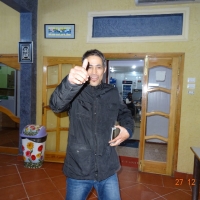 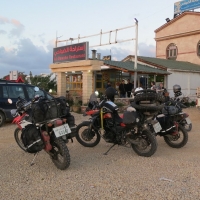 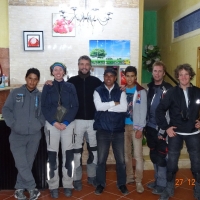 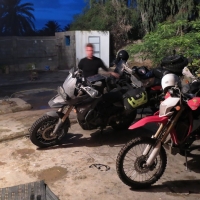
It is dark when we drive to Salahs house on the same busy road on which we drove earlier that day. Salah drives with his hazard lights on so we can not lose sight of him, but at the same time he drives so fast that we can only just keep up with him. There are no street lights along the road and it is very dark. I have my extra lights on in order to spot possible cracks and holes in the road. The moment I put the spotlight off because I am afraid to blind Ross (who rides in front of me) I drive straight through a huge pothole. The light is turned on again!
After a while we take a turn, leave the main road en ride onto a dirt road toward some houses. We drive through a metal gate along a small orchard and park our bikes in front of Salahs house. Although the gate will close at night, he asks us to lock the bikes and to get all of our stuff from the bikes. The men are led to the second floor of the building and take all the stuff from the bikes with them. When I want to go in the same direction Salah stops me. It takes a minute before I understand that I am not meant to get upstairs with the guys. I need to stay downstairs with his sister. Even when we say that Peter and I are married and we have no objection against sharing a room with Billy and Ross share, Salah indicates that I should stay with his sister. I follow Salah downstairs towards his sister.
I put my dirty motorcycle boots outside with the other shoes at the door. When the door opens, I enter a large room and meet a small stocky woman. She wears a long skirt, a thick woollen shawl and a black headscarf. She smiles, takes me in and calls the other ladies. From the kitchen two smiling women appear who thoroughly study me. They invite me to sit in a room with a television, that is on loud. The floor is carpeted and along the walls there are several mattresses on which they sit. I am still wearing my dirty bike gear and explain that I would like to change first before I sit down. They ask how I became so dirty. When I explain that I did not arrive in a car but on a bike one of them runs straight to the door to see it. When she is at the door she reports to the other ladies on the motorbike and the men that are standing outside. It is a pity that I do not speak Arabic, because what she said must have been quite funny. The other two ladies are bent with laughter.
Once they have understood that I want to change, one of them calls Salah. He takes me upstairs to the bathroom. It has a lock on the door so I should be able to change clothes there. Once upstairs, the guys tell me that they are going out with Salah. He will take them to a coffee shop. It is immediately clear that this is not an activity for ladies, so I decide to spend the evening with the sister of Salah. We’ll see about sleeping later.
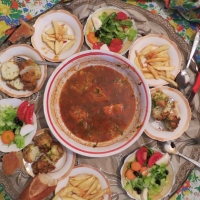 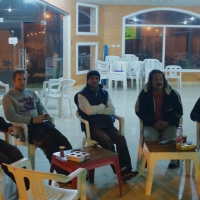 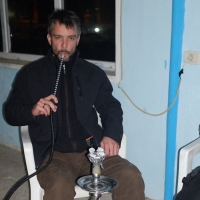 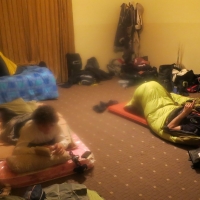
With a clean outfit I walk back into the house on my socks to the TV room. I take a seat on one of the mattresses on the floor. I am given fresh fruit juice and a bowl of chocolates. If I wait to drink until the rest of them also has a drink they look puzzled. Once they understand that I am waiting for them, they make clear that I should not await them. They then stay in the room beside me until the entire glass is empty and I have put at least one chocolate in my mouth.
Soon thereafter one of the women carries a tray of food inside. On the tray is a large bowl of soup and several small bowls with salad, fried cauliflower and fries. One of the other ladies brings in a plastic bucket and a kettle of hot water which she pours over my hands so I can wash my hands. I am asked to sit with them and eat. I try to make them understand that I have already eaten a delicious spaghetti at Mohammeds restaurant and am not really hungry any more. But no matter how I try, they insist that I eat. One of the ladies pinches my side and makes it clear that she thinks that I am a bit skinny and therefore could use a little food, to the great amusement of the others.
We sit on the floor around the large round bowl with food. The son of eight of one of them also shares our meal. I am given a spoon for the soup and a fork, though I can see right away that they also eat with their hands. They only use their right hand. The left hand is the “dirty hand” and not meant for eating. All of us eat from the same big bowl of soup, dip our bread in it and eat the fries, salad and cauliflower. It is delicious and although I am not really hungry, I do my best to taste everything. I ask if I can take a picture. I am allowed to make a picture, but only of the food and not of them. The captured image again prompts many jokes that I -unfortunately- cannot understand. The fun is not any less.
When everyone is finished eating and they also feel that I have eaten enough, the large tray is taken to the kitchen and replaced by a smaller tray with bananas, oranges and tangerines. One of the ladies peel the oranges, while another is peeling peanuts. The third deals with the tea. In the room is a pot of glowing charcoal on which a blackened teapot is sizzling. I keep getting oranges. When I have eaten 2.5 orange I am allowed to stop. Now it is time for tea. It is very strong, very sweet tea and poured in the cups while holding the teapot very high. It is delicious.
The rest of the evening we try to talk. The atmosphere is relaxed. The veil of one of them goes off and reveals beautiful dark brown hair. With their very limited English, my three words of Arabic, hands and feet we are able to understand each other a bit. They explain to me how old they are, in what way they are related to each other and show pictures of the other family members. I show pictures of home and explain to them that my mother has passed away. It is clear that cancer is also well known to them because we do not even have to translate it, they understand it right away. When it turns out that my father is still alive the three of them simultaneously raise their finger to indicate that they want to marry him. They are roaring with laughter. They also want to know how it is possible that Peter and I have been together for six years but still have no children. One of them pretends to give a kiss and raises her arms to indicate she does not understand. Another lady asks: “Tablet?”. Yes indeed, a tablet ensures that we do not yet have children. From the approving chuckle that follows I understand that they do not think that is such a bad idea.
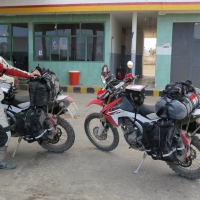 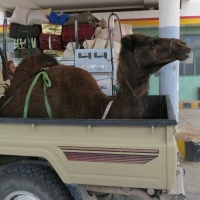 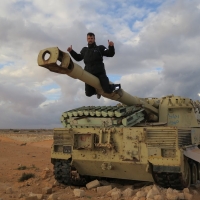 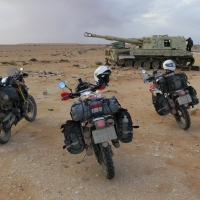
After a while they are mostly talking to each other in rapid Arabic. It is unfortunate that I cannot understand them and they do not understand met either. I would really like to know more about them. It seems each one them is a very strong woman with a strong own opinion. I wonder in what way they can express their opinion. And if they work, whether they have seen other parts of Libya or have been in Europe, and much more . At the end of the evening Salah comes back to get me. He tells me that I can share the room with the men. Through Salah I can thank the ladies very much for the nice evening and the delicious food.
Once upstairs I get full report on the evening out of the men. They first drove to a coffeeshop with Salah in his little Toyota Starlet. They bought coffee in the coffeeshop and then took it to a place next door to drink it with friends of Salah. It apparently was delicious coffee with a liqueur of flowers in it. After the coffee they mingled with the Libyans to smoke a water pipe, Shisha. The evening ended with a game of snooker, Libya against the tourists. During the evening, both Peter and Ross had received several phone calls. Masoud (from Zuwara) and Masaud (from Tripoli) had called to ask if everything was okay and if we had arrived in Khoms and Leptis Magna in good order. Peter was called by Mustafa, a contact in Ajdabiya who asked what day we would be arriving. Everybody is looking after us.
That night we said goodbye to Salah and thanked him for his hospitality, after which we quickly fell asleep. The next morning we woke up early again. Today we would drive from Khoms to Ras Lanuf, a distance of over 360km (223 miles). The route leads through Misrata and Sirte. Sirte is the city where Gaddafi was born and where they finally found and killed him also during the revolution. There had been a lot of fighting in that area during the revolution. Several people advised us not to linger in Sirte and only stop for fuel. On the website of the British Ministry of Foreign Affairs part of the route we would ride was ‘red’, which meant that travel in that area was advised against. The plan was to have breakfast, leave early and ride in one go to Ras Lanuf.
We write a card for Salah to thank him for his hospitality and drive away at 08:30 pm. It is raining. That not only means that we get wet, but also that we get very dirty. The sand that is on the road is now mud, which is raised by the cars and bikes to drive in front of me. Also, the rain that falls does not seem to consist of water only. The clouds in the sky are coloured light pink of the dust that has accumulated in the air. As we drive longer, my visor gets more and more dirty up until the point a do not see anything any more. A large part of the route I ride with my visor open to better see oncoming traffic and potholes. After 100km (62 miles) we stop in Misrata at a convenience store along the way to buy food and drink. We can not only buy bread, toppings and drinks, but also drink espresso. Again, we are warmly welcomed. Not only by the staff but also by customers. When we want to pay the espresso is “on the house”. The guy then runs out to give us chairs so we can sit down to have breakfast. Another guy hands over the garden hose so we can clean our helmets. We just keep meeting friendly people.
In the course of the day the sky clears. We drive past the desert and regularly spot camels along the way. Even at a gas station we see a camel, this time in the back of a pickup. We also pass huge oil refineries and see on the map how much oil pipes run from the desert to the coast.
In this part of the country it is clearly visible that there was heavy fighting here during the revolution. Houses are shot, burned or collapsed. There are holes in the asphalt that are clearly caused by exploded grenades. In the afternoon Ross suddenly turns right, while pointing at a huge tank. at the side of the road. We all ride to the tank to check it out. The tires were broken, but other than that the tank was still in pretty good condition, even the engine was still in it. An impressive sight and tangible evidence of the revolution.
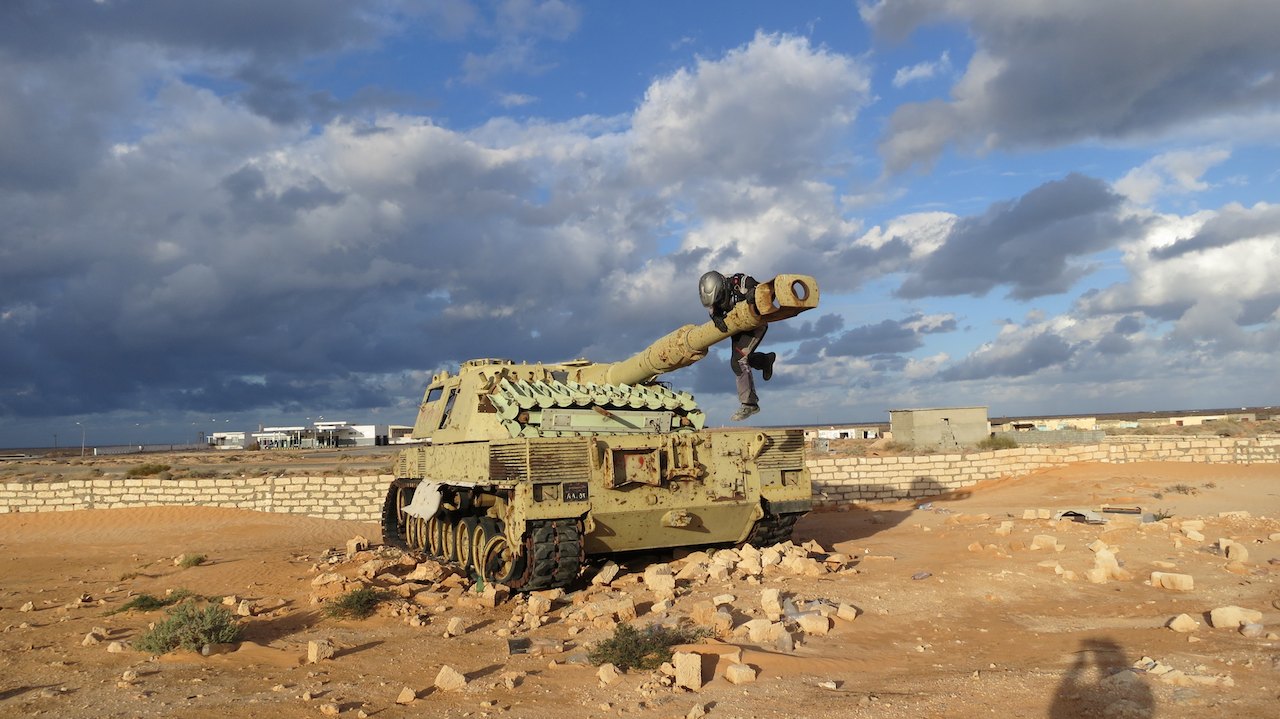
At the end of the afternoon we arrive in Ras Lanuf, a compound of an oil company. On the compound there should be a hotel where we can stay. We are registered by the security guards and taken to the hotel. We park the bikes in front of the door of the hotel. Billy, Ross and I go inside, while Peter remains with the bikes. The people at the reception desk are less friendly than we had experienced so far in Libya. First they said they are full. After a while it turns out they do have one room, but that we cannot share that room. Then it appears that they might have two rooms , but no dinner or breakfast. The price per room is 160 Libyan Dinar (€ 94) , which would mean all our cash would be gone in one go. Just as we are discussing whether we could make it to Ajdabiya in daylight Peter walks in with a man he had met on the parking outside. He introduced himself as Abdul Hamid and asks “Problem?”.
As soon as Abdul Hamid understands how expensive the hotel is, he offers us to stay with him. He lives with his wife and three children just outside Ras Lanuf. He says that we can safely park the bikes at his house and that he has enough room for all of us. We decide to take a chance and follow Abdul Hamid onto a sandy road in the desert to his house. He points to the homes in the area and says that all the houses are owned by his relatives. We park the bikes in the courtyard. He opens the doors of his house and welcomes us warmly. We have two rooms and before we know it in both rooms are mattresses, pillows and blankets. We can also use his shower. His wife and children are not at home yet, but Abdul Hamid will pick them up later.
The rest of the afternoon we hang out in the TV-room. One of the channels shows non-stop English movies. Ross continues his Arabic course with Abdul Hamid and again writes all newly learned words in his brown book. We meet Ali, a cousin of Abdul Hamid and also his neighbour. Ali hands me a packet of tea and says it is really good tea. He insists that I open the package and smell it. After I have done that and have confirmed that it smells nice, I want to give him the tea again. But then he says: “Make tea, you make tea.” Abdul Hamid hears what Ali says and as he lies on the floor watching TV then points to the kitchen: “Yes you make tea.” I am a bit stunned. For Ali and Abdul Hamid it clearly is a most natural thing that I, the woman in the company, make tea. If I am going about this slight culture shock, I go into the kitchen in search of water, a teapot and glasses. Abdul Hamid comes in to help me searching, but he does not seem to find them. This is clearly not his domain. I do see the fun of it and eventually make a lovely pot of tea for Billy and myself.
Ali then asks me to accompany him to his house to meet his wife. As a woman, I have the privilege to do so. He would not introduce his wife to Peter, Billy and Ross. I get a tour around their modest house. Ali speaks limited English and it is very difficult to have a normal conversation. At some point he says that he and his wife are in the same situation as Peter and I because they are also together for six years but, like us, have no children. It is clear that the reason we do not have children is very different than the situation of Ali and his wife, but I realize at the same time that this time the language barrier and perhaps also the cultural difference make it impossible of explaining the real reason. Difficult.
They then ask me to take a seat in the living room so Ali can take a picture of me and his wife. His wife gets up and she grabs a box off a shelf. She gives it to me and says something in Arabic to Ali. Ali says that it is a good custom of Libyans and Muslims to give a present to a woman when she visits a home for the first time. When I open it there is a gold coloured watch in it with white stones. I do not know what to say. I do not really want to accept it and explain that it is too big a gift. But they insists that I keep it. When I wear it when I am back in the Netherlands I will think of them. I thank them extensively for the watch and are taken to the house of Abdul Hamid again by Ali.
At the beginning of the evening Ali enters with two large plates with food. Peter and I can eat from the same plate, but it is not good use for me to eat with the other guys. Therefore, there is a separate plate for Peter and me and one for Billy, Ross and Abdul Hamid. We eat delicious rice with some meat and salad.
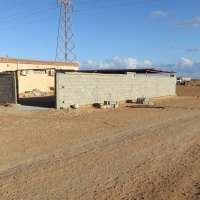 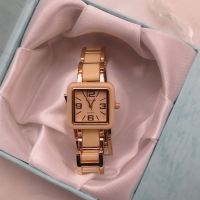 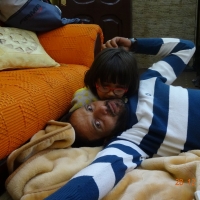 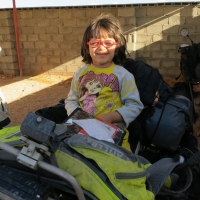
After dinner Abdul Hamid takes Billy and Ross to Ras Lanuf to go to the supermarket and to pick up his wife and children. After some time Billy and Ross come back accompanied by the brother of Abdul Hamid, Rahim. Ross tells about their adventures on the way. When they got into Abdul Hamids new Toyota Hilux, Abdul Hamid placed his Kalashnikov in Ross’ lap. Abdul Hamid explained that in the evening many robberies take place by ‘Ali Baba’ and that they mainly steal new Toyota pickups. Because there is no police force set up after the revolution it is every man for himself. The Kalashnikov is the defence. As a precaution they do not stop for any red lights either. Abdul Hamid, Ross and Billy first drive in one go to the secure compound to do some shopping. There Abdul Hamid swapped his new Toyota Hilux with the old beaten car of his brother Rahim. Rahim then took the Toyota with Ross and Billy back home again in one go, while Abdul Hamid went to pick up his wife and children in the old car. Not common practice for us, but apparently the most normal thing in the world of Abdul Hamid and Rahim.
After some time Abdul Hamid came back with his wife and children. He led his wife directly past the TV room inside the house and closed the door to the rest of the house. Again, it is only possible for me to meet his wife. Peter , Billy and Ross are not introduced to her and will not even meet her in the house. The rest of the evening Abdul Hamid sits with us and tells about the revolution, “Ali Baba” and his job. His two eldest children, a girl of six and a boy of four sit with us as well. When he has shown his Kalasnikov to us he asks the girl to safely store the weapon. A special sight how the little girl lifts the heavy gun with two hands to store it away. Almost surreal.
The next morning we are first invited for a full breakfast, with bread, eggs, coffee and juice before we can leave. When I am still packing my bike Abdul Hamid walks up to me with a plastic bag. He hands over a gift his wife wants to give me. The bag holds a pair of jeans and a t-shirt. I thank the wife of Abdul Hamid and put the stuff in my bag.
When we leave, Ali and Abdul Hamid first take us to a petrol station about twenty kilometres from their houses. If we want to pay Abdul Hamid steps forward and pays for the benzine. After we have thanked him extensively, we continue our way to Ajdabiya .
Next up: Part III on Libya, with a report from Ajdabiya to the Libyan border will follow soon.
|

19 Sep 2014
|
|
Registered Users
HUBB regular
|
|
Join Date: Dec 2009
Location: The Netherlands
Posts: 66
|
|
|
Unbelievable hospitality
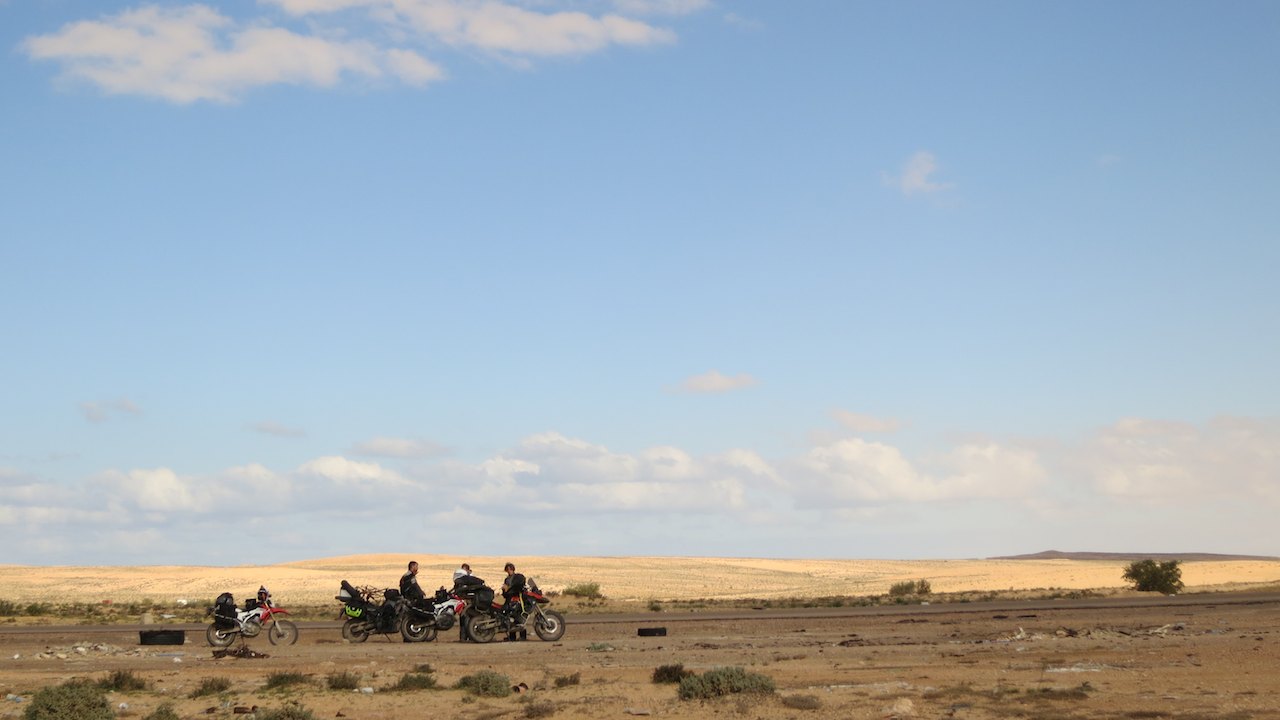
After Abdul Hamid and Ali bought us a full tank of fuel, we went on our way to the east towards Ajdabiya. The area through which we drive is dry with here and there some low vegetation. We again pass many oil refineries that, with access to the Mediterranean Sea, send the ‘black gold’ on to the world.
The signs of the revolution are visible here. Along the way are countless burnt cars, especially pick-ups. The burn marks on the asphalt and the potholes made by bombing mean we have to pay a lot of attention on the road. At some point we see a row of tanks parked on a hill next to the road. It is clear that the tanks are no longer in use and have been put here after the revolution. We drive into the desert to take a closer look. The bullet casings lie scattered in the sand. It is an impressive sight. After an extensive photo shoot with the men in, on, behind and under the tanks, we continue our journey. It is not far to Ajdabiya anymore.
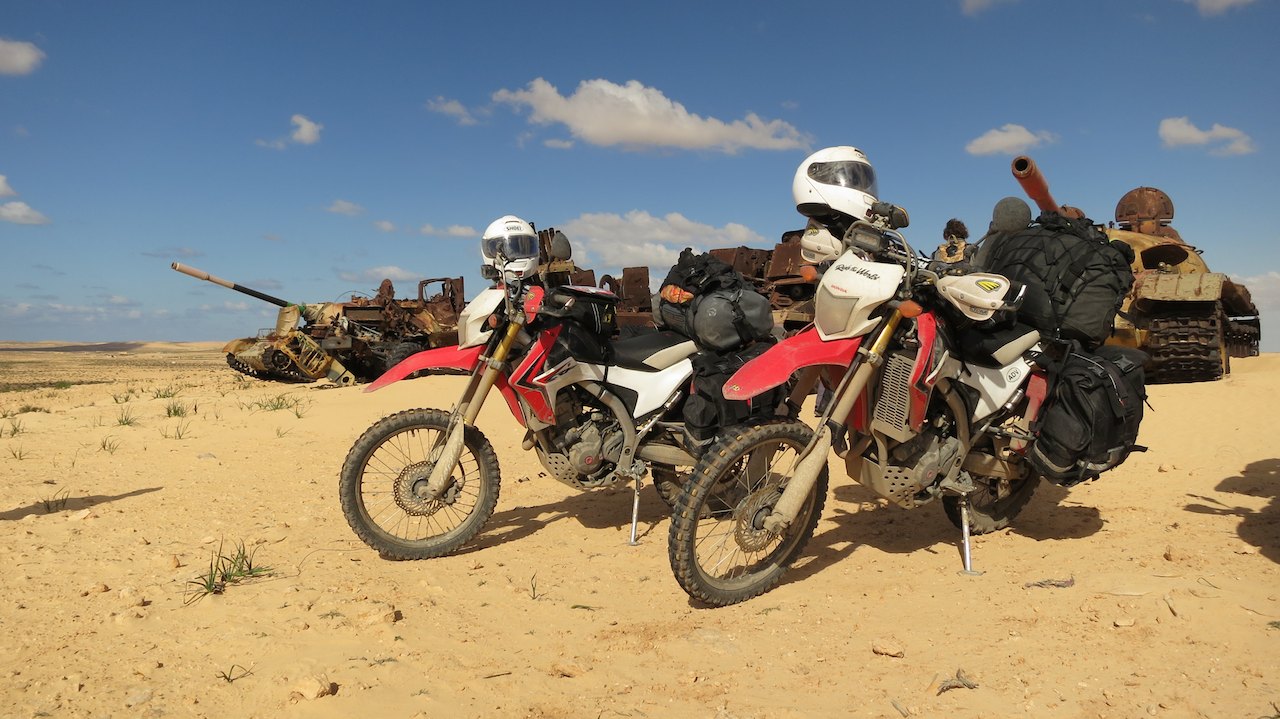
The further we drive to the east, the more police checkpoints we encounter. At most checkpoint we can just drive on. If they stop us it is usually for a chat, to take pictures or to offer us some food or drinks. Most guys at the checkpoints are very young (“So young that they do not even have to shave”, according to Peter). If they hear our bikes they come running out of their booth while pulling their I-pod from their ears with one hand and putting on their camouflage shirt with the other hand. Only once we are asked for our passports by an older soldier. He also starts questioning us and wants to know whether we know the company that has sponsored us for our visa. The four of us all nod ’yes’.
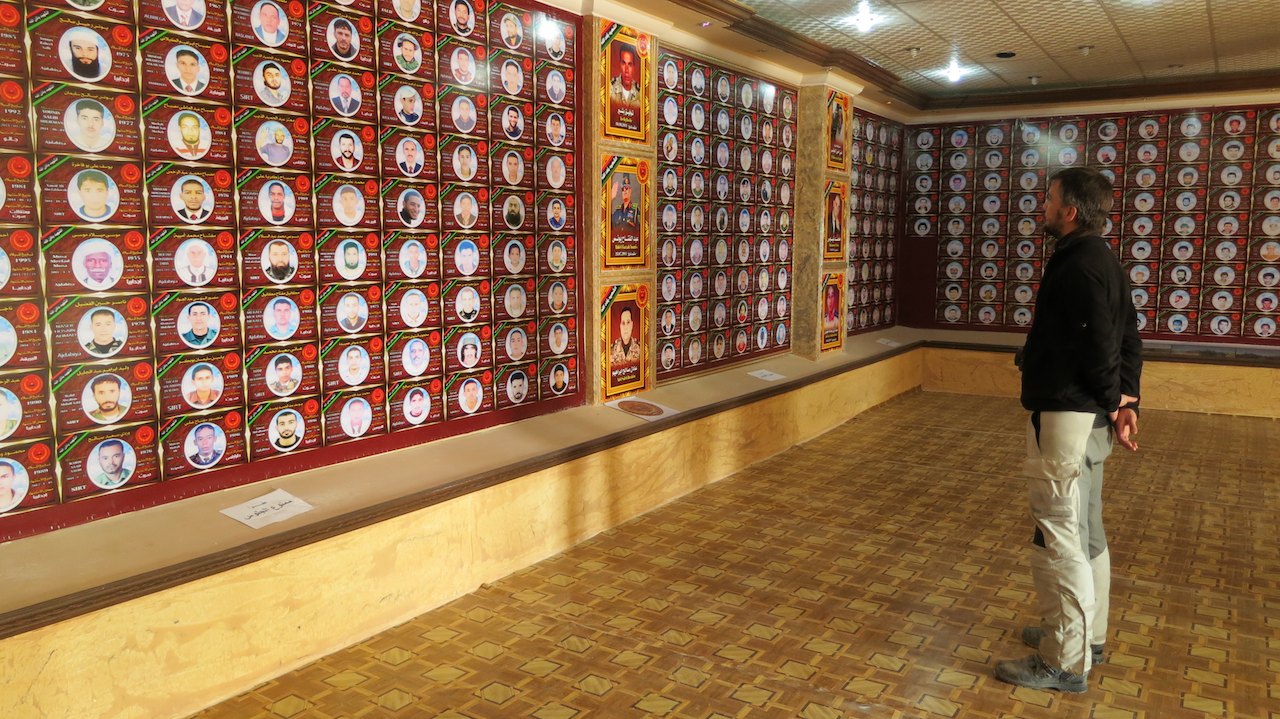
When we are stopped at one of the final checkpoints before Ajdabyia two Libyans (not military) walk up to us. “ Where Peter?” asks one of them. Peter raises his hand and one of them walks up to him and introduces himself as Hamad. Peter had been in contact with Mustafa from Ajdabiya, whose telephone number he had received from Masoud (Zuwara). When Peter asks where Mustafa is, Hamad answers that Mustafa is a few kilometres further on waiting for us. We follow Hamad and indeed a few kilometres further on Mustafa is waiting for us at the entrance to the War Museum of Ajdabiya. He appears to have studied in Scotland and is now back in Libya since two months. He speaks good English and explains that they would like to show us the museum before we go to a hotel. That seems like a good idea.
We park the bikes inside the fence of the museum and follow Mustafa, Hamad and their friend Fergany to one of the buildings on the site. Within the walls of the building are full of photos of the victims of the revolution. Most of them are “Freedom Fighters” who fought against the Gaddafi regime, but there are also pictures of women and children. In this museum only the victims who were killed in and around Ajdabiya and Benghazi are remembered. Ajdabiya was on of the first cities that revolted against Gaddafi. From there, revolts spread further across the country. In other parts of the country similar memorial walls can be found.
There is a great number of photographs of officers. Each of them soldiers from the army of Gaddafi who switched to the Freedom Fighters. The men tell us amazing stories. About a man who crashed his car full of gas tanks into the entrance of the armory. The car exploded in which the man died, but the gate was open and made sure that the Freedom Fighters were able to obtain weapons. We also see pictures of journalists that have been killed by spies of Gaddafi after they had made reports on the revolution.
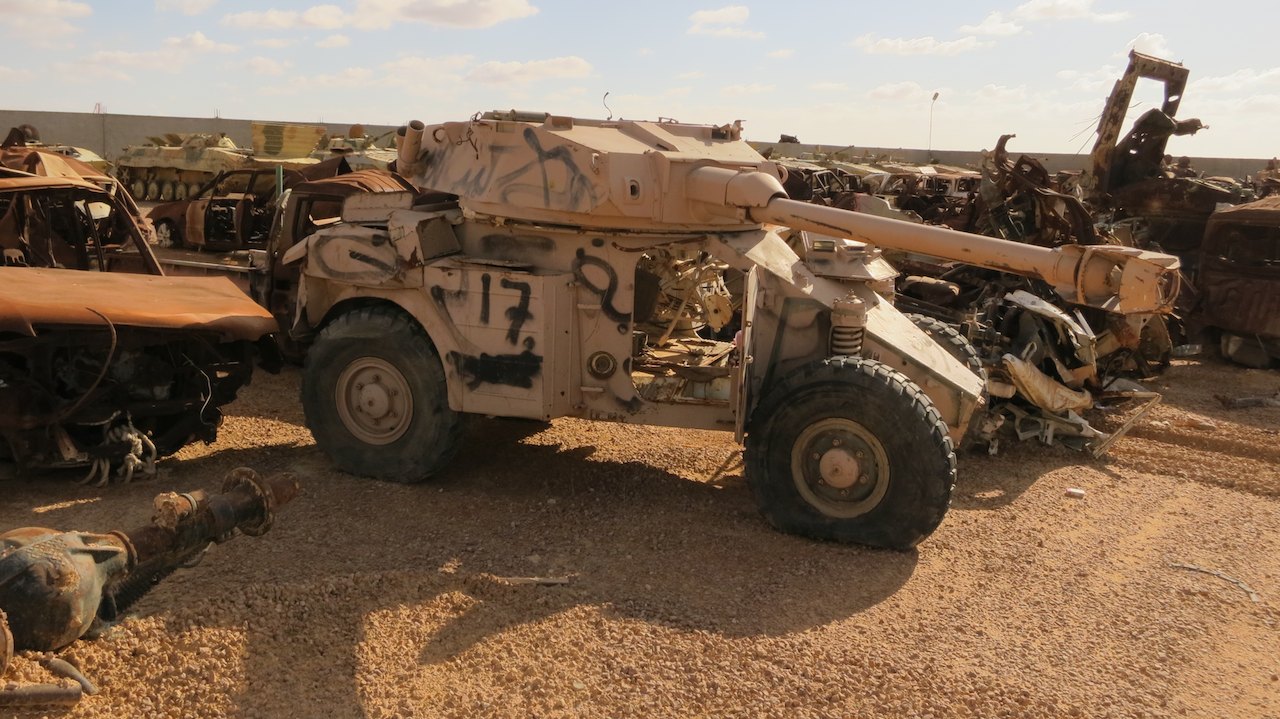
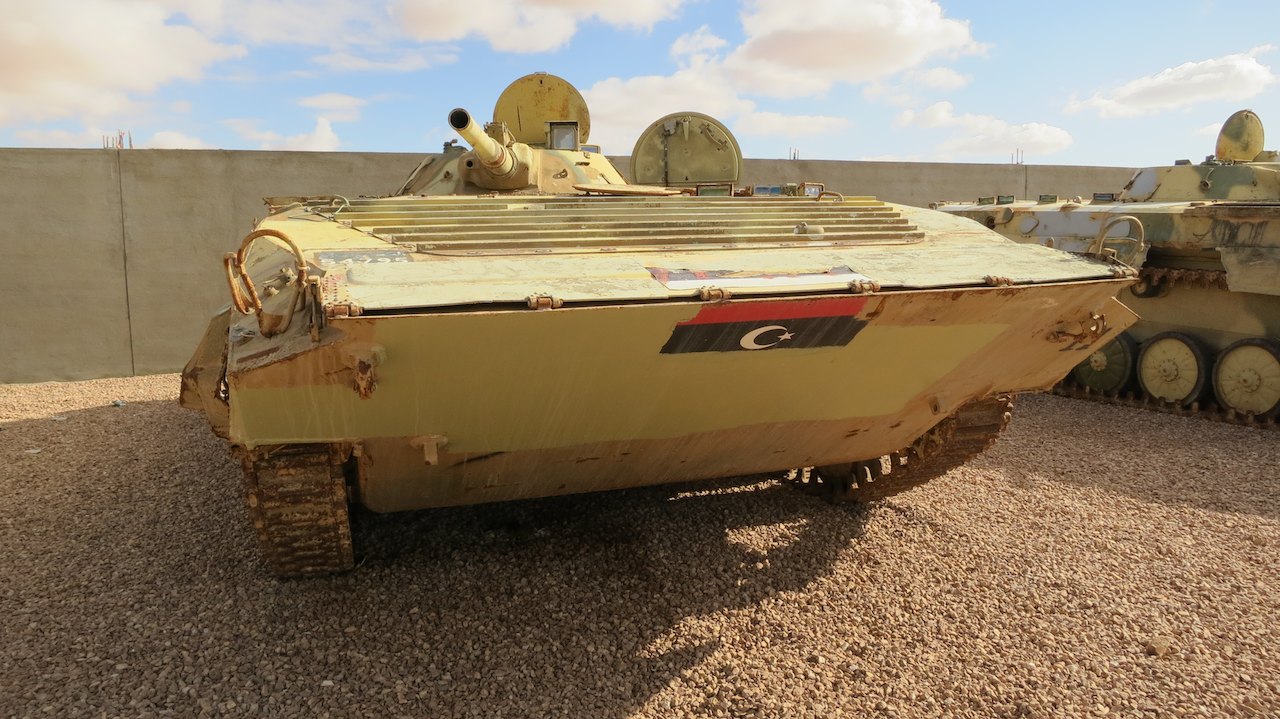
Then the men show us the outside area that is completely filled with tanks, tracked vehicles and burnt pick-ups. There is also a large amount of ammunition. The museum is still under construction and while we take a look at the fleet the main building is still being painted. If we come back to the motorbikes we are given drinks and cakes by the guards of the museum. They are happy that we came to visit the museum.
Although the intention was to stay in a hotel, Hamad lets us know that he will bring us to a farm outside the city. This is safer for us, for the motorbikes and also much more comfortable. We follow the men towards Ajdabiya and park just outside the city in front of a metal gate. When the gate opens we drive into a large tiled courtyard with a beautiful landscaped garden with grass, shrubs and trees. Not a normal sight in an environment that mainly consists of desert sand. The site houses a number of buildings each of which has a bedroom and a bathroom. The main building also has a kitchen.
It turns out to be the weekend house of Hamad. He has a house in the city where he lives with his wife and two kids. His immediate family live in the same neighbourhood in the middle of busy Ajdabiya. On weekends they stay here at the ‘farm’. Hamed explains that the ‘farm’ was used for the organization of the revolution, but was taken over by soldiers of Gaddafi later. The bullet holes in the door are still visible.
Hamad has taken his wife and children to family in Benghazi about 200km(!) away, so he could receive us and show us the city. He turns out to be an exceptionally welcoming host. When we are done unpacking the bikes, there is a table full of delicious food and drinks waiting for us. Crackers, cheese, olives, fruit and all kinds of drinks. As we walk to our bedroom to change even our beds already made. We enjoy the delicious snacks. It is still early in the afternoon, so we have plenty of time to work on the bikes. We are handed a water hose to clean the bikes.
When everyone is done with their work on the bike, the men take us to the city. They want to show us Ajdabiya and get something to eat. Peter and I ask Mustafa if he can bring us to a shop where we can make photocopies of our passports (for the Egyptian border). Furthermore, we ask if we can do some shopping for the next day, on which we will drive over 400km through the desert to Tobruk to avoid Benghazi and Darnah. On that route are no villages and only one gas station halfway. It is however no certainty that they also have fuel, because we have already been to gas stations where they could not help because they had no electricity. So we need to bring both food and extra fuel the next day. If we can already buy that stuff today, we can leave early tomorrow morning so we will arrive in Tobruk before dark. No problem, according to Mustafa, everything can be bought in Ajdabiya.
Peter and I ride along with Hamad and Fergany and Billy and Ross get in with Mustafa. They first take us to a Roman castle. Hamad and Fargany both speak ‘ small English‘ as they say, so unfortunately we cannot have extensive conversations with them without help from Mustafa. As always a picture says more than a 1000 words so on the way we look with admiration at the pictures of the daughters of Hamad.
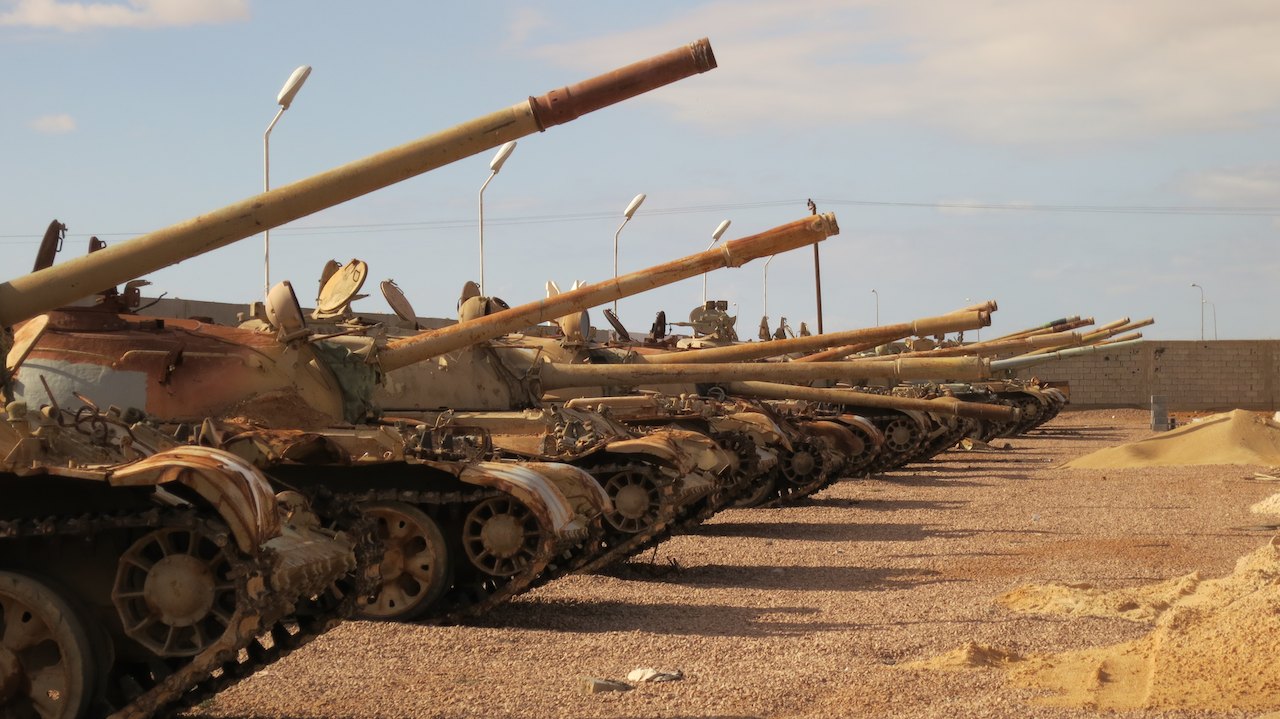
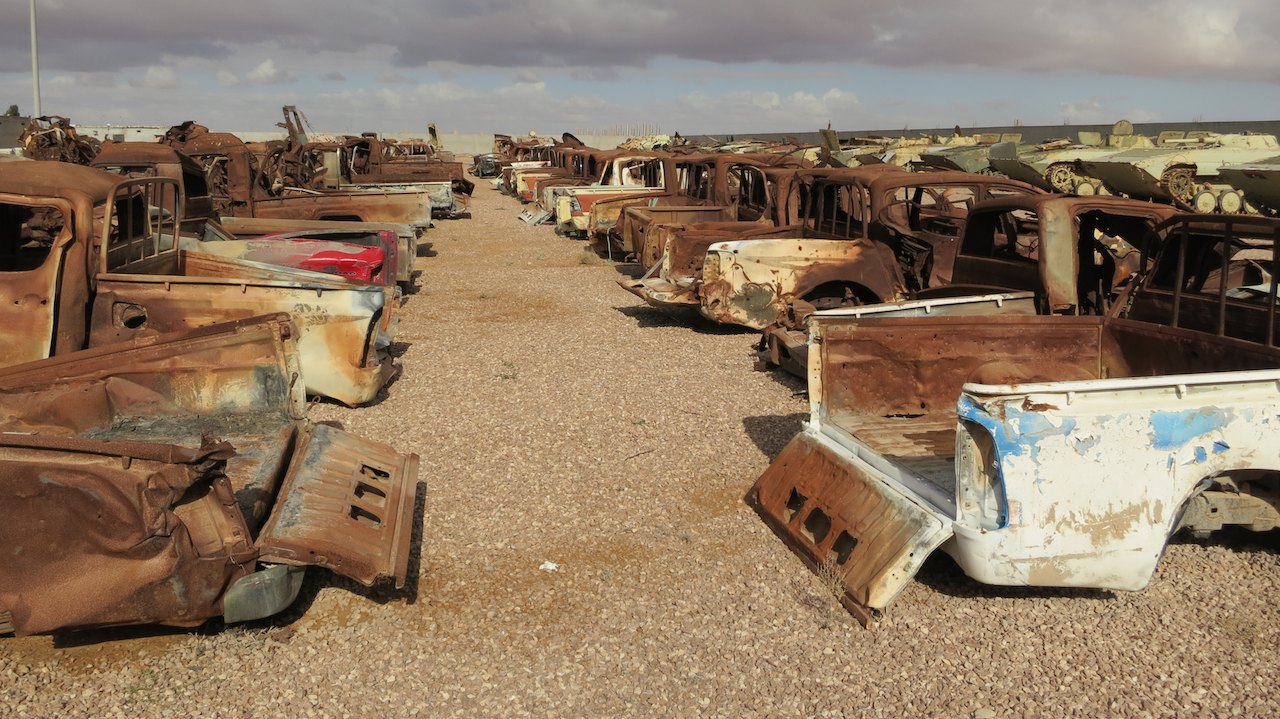
The tour through the city continues and brings us at a shop for copies of our passports. Hamad enters with Peter and when Peter wants to pay for the copies Hamad steps forward and pays instead. Peter cannot make him change his mind. Then they bring us to a cafeteria in the city. It is a large room with great lounge chairs. We order ’Kentucky chicken’ and get delicious chicken, salad, fries and bread with humus. When I look around I only see men in the restaurant, no women. I actually have to go to the bathroom and see a staircase going up into the corner of the room. Maybe that staircase leads to the women’s section where the ladies normally sit. I walk to Mustafa to ask if the ladies toilet is upstairs. He says that there really are not many women that visit the restaurant, there is no separate bathroom. When I ask if it is appropriate for me to go to the men’s room, he apologizes and lets me know that is not really appropriate. Nevertheless he gets up to ask the staff. After they have verified that the lock on the door works, I can still use the toilet. Great!
After the delicious meal, which we again cannot pay ourselves, we walk back towards the car. Next to the restaurant we see a supermarket. We decide to do some shopping for the next day. Hamad Mustafa and walk with us. If it turns out that we actually only need bread, Mustafa explains we can buy bread the next morning when we go to Tobruk. Fresh bread is perhaps tastier so we leave the shop without bread and with the intention to buy it the next morning. When we are back in the car again, we drive about 500 metros when Hamad stops the car in front of some stores. He gets out and comes back a few minutes later with a large bag full of….bread! As we continue driving, Hamad stops again at some stores. Those stores all sell hardware, like tools and building materials. After we have been to four stores (without Hamad buying something) Peter and I suddenly realize what he is looking for: jerry cans for benzine. Only now we see that Hamad is actually doing our shopping for us!
Hamad ultimately does not succeed to finding the jerrycans. We are glad he did not, because we feel a bit awkward. When we asked for their help in finding the stores, we never meant for them to buy us the stuff we needed.
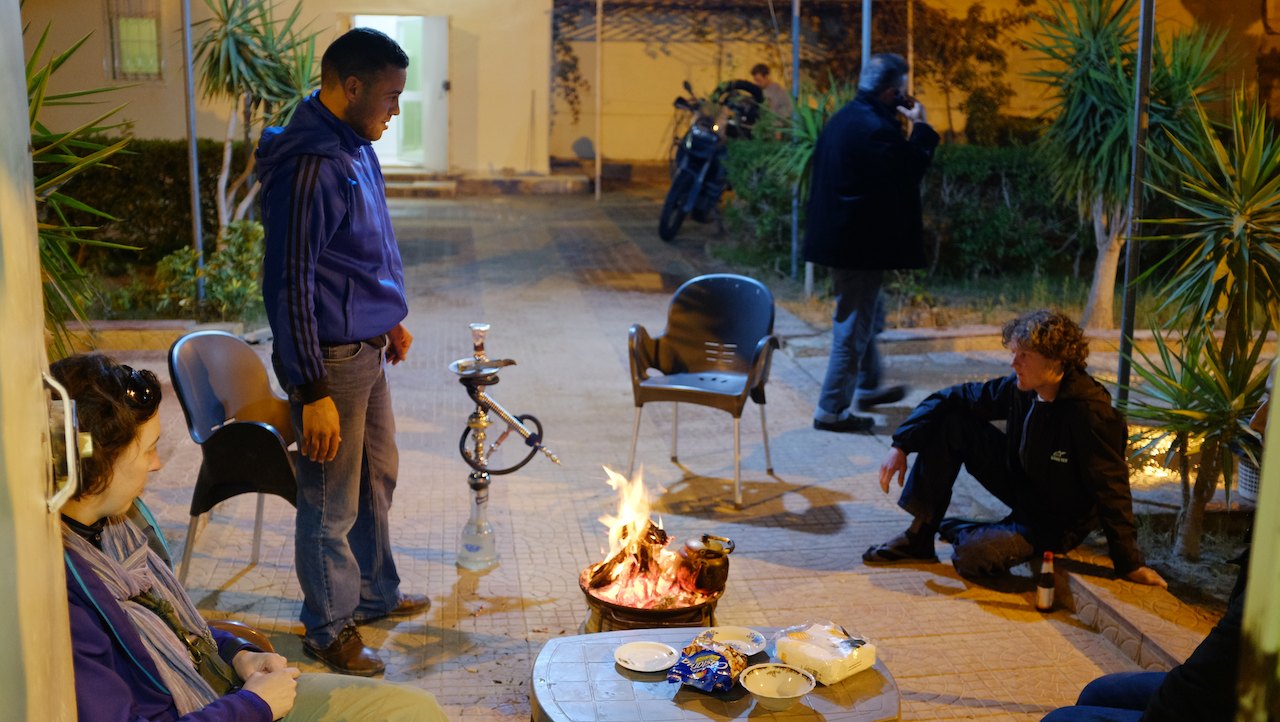
When we come back to the ‘farm’ Fergany lights the fire pit. Hamad fills the table with nuts, cakes and drinks. On the fire there is a tea pot with hot water for tea . The remainder of the evening we all sit around the fire and we talk, with translation of Mustafa, with Hamad and Fergany. A lovely evening!!
The next morning at 08:00am we have packed and are ready to leave. But the table is set for breakfast with the bread Hamad bought yesterday. Hamad and Fergany are making tea in the kitchen. We enjoy the great breakfast! When we all had enough to eat and walk back to our bike, on each bike lie two apples, two bananas and two bottles of water for the road. What a host!
In front of our bike a large white Toyota Landcruiser is parked. We notice it is heavily loaded. When we admire the car Hamad shows us that there are two huge 60-liter jerry cans filled with benzine in the back of the car. He managed to get benzine after all. However, these cans are too big to take with us on the bikes. Hamad explains that this is not a problem because he will be going with us! He will ride 200km with us to Tobruk until halfway the desert road. There we will meet his friend, who will take us the next 200km to Tobruk. The fuel in the car is for halfway. We do not know what to say about this infinite hospitality, unbelievable!
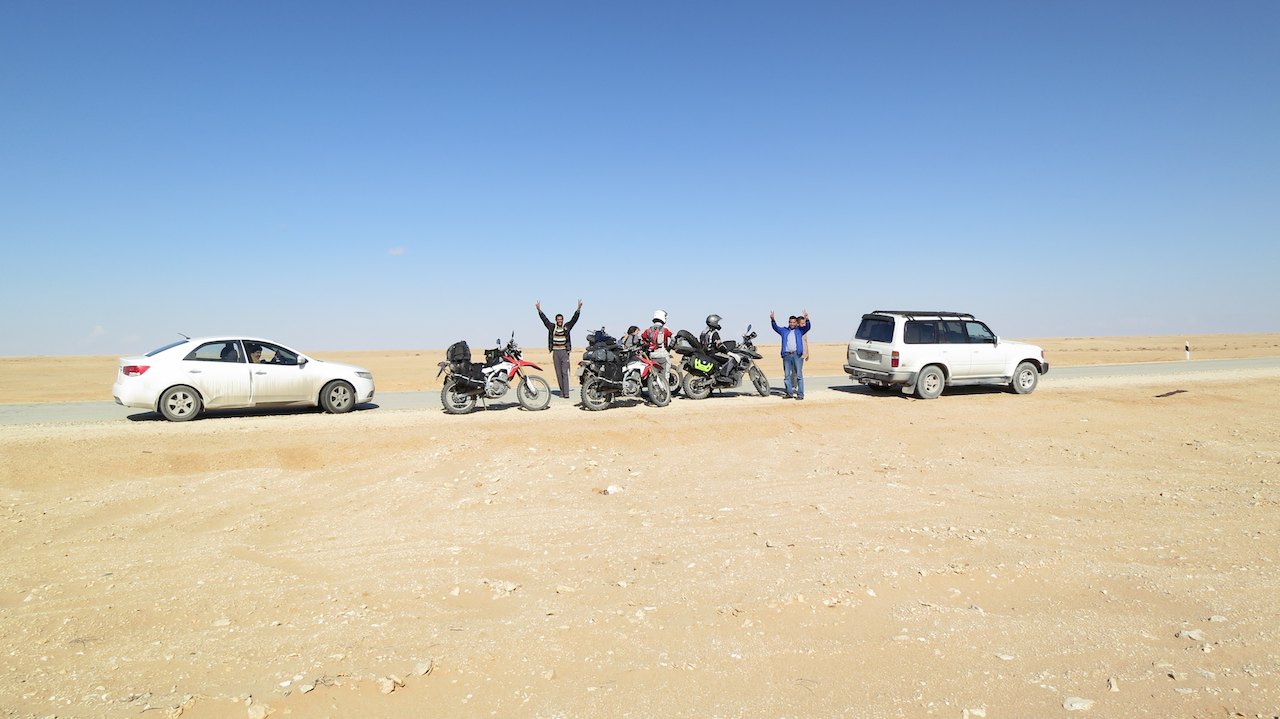
Hamad and Fergany ride in front of us in the Landcruiser and lead us through the busy city of Ajdabiya to the desert road towards Tobruk. After we have done about 20km Hamad parks his car on the side of the road. He says something about a Toyota Hilux, a ‘ friend’ and the police. Unfortunately, we do not understand him. Hamad and Fergany both get out and start calling people. After half an hour, just after Hamad has again spoken on the phone to someone, he gets up again: “ It ‘s OK, we go now.” We are not entirely clear yet what was the reason for the break, but we understand that we can go again.
The route we drive is mostly boring. The road is literally a straight line from Ajdabiya to Tobruk without curves. On either side is only desert as far as the eye can see. Our bikes do not have a very strong engine, so we drive at a fixed rate of 90km per hour towards Tobruk. The only distraction is the CD of Ben Howard on my phone that I can listen using my headset. Billy and Ross, who have very strong and much faster motorbikes, are even more bored. They could have ridden towards Tobruk at high speed, but keep our pace all the way. Billy occasionally leaves the asphalt road to drive on the gravel road that runs parallel. Ross tries to ride standing with no hands while using the cruise control gadget. While Peter and I plow to Tobruk at the same speed, we see them wandering around us and sometimes overtake us with great speed, just for fun.
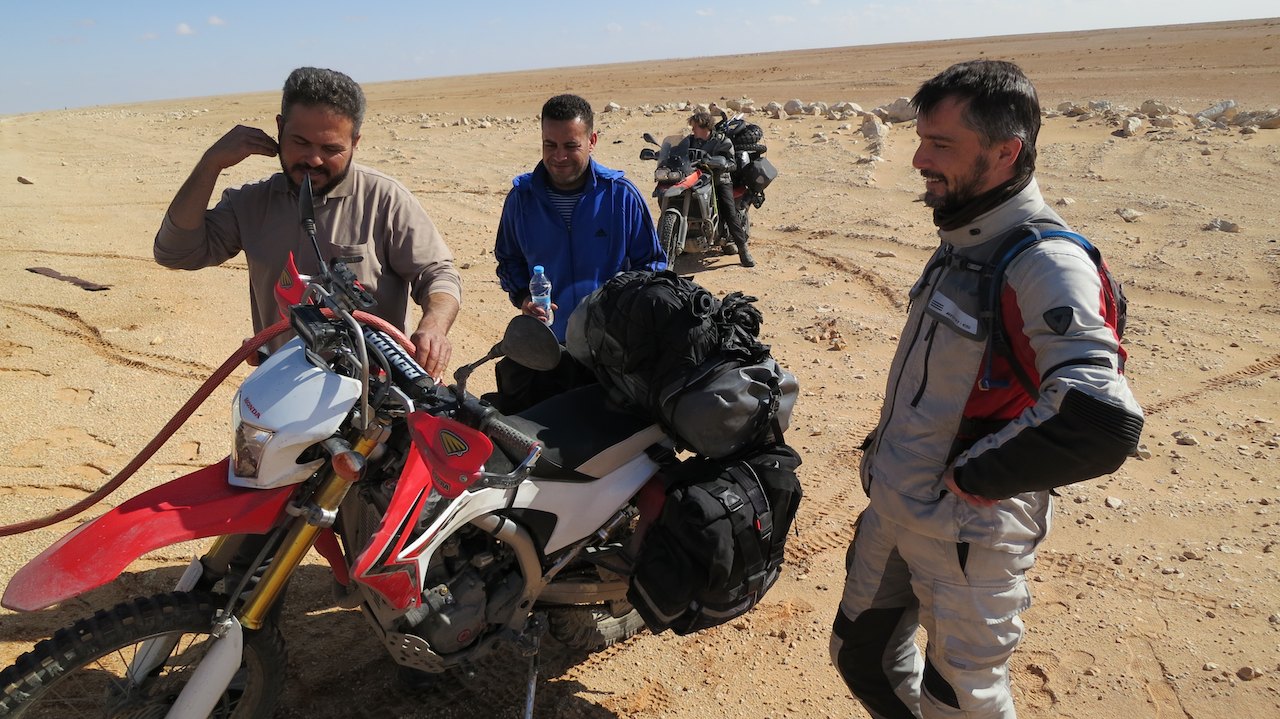
When we are almost halfway Hamad stops the car. From the opposite direction another two cars stop. Hamad greets his friend and introduces us to our new escort. Before we go on the road all four bikes are filled with benzine from the jerrycan in the back of Hamads car. Then we say goodbye Fergany and Hamad . A special moment because we again have the feeling we say goodbye to very good friends. When Fergany and Hamad are almost in their car, they walk back towards us and give each of us a photo of themselves. After a final group picture we go on our way again.
The second half of the route is not much different than the first half except that it is possibly even more boring. Ben Howard sings now the same song for the third time and the acts of Billy and Ross are becoming more and more exciting. At some point Billy rides at high speed through the desert along with a Landcruiser pickup from the arm . When the GPS indicates that we are almost in Tobruk some cars ride towards us honking. Our escort stops and greets the men in the oncoming car. The newly arrived men introduce themselves as Moosa and Hameed. Hameed is a member of the motorcycle club from Tobruk and gives us all a large sticker with their logo for on our bikes. Moosa and Hameed will help us to find a hotel in Tobruk. The soldiers that were in the Landcruiser now also join us. Again everyone takes their phone to take pictures an make little films.
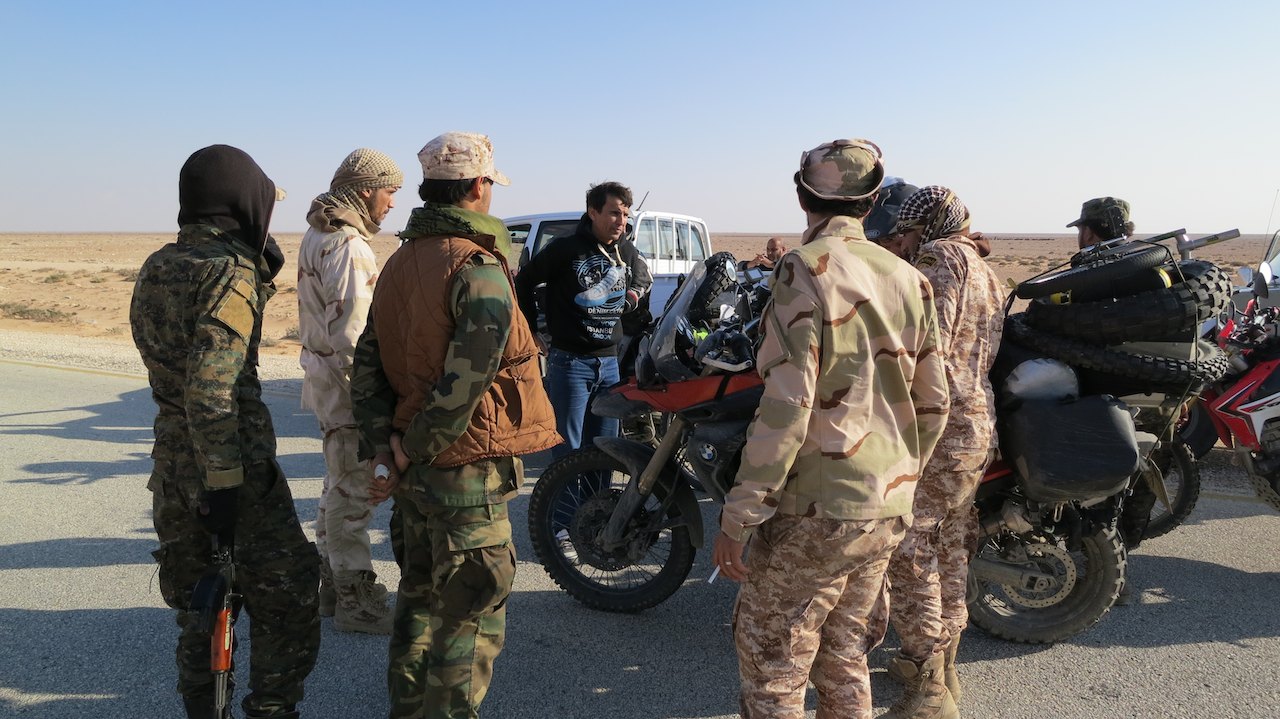
It is not so far to Tobruk anymore. As we enter Tobruk, more and more cars add our group. Some are people from the motorcycle club, others are just random passers-by who want to take pictures of their children with the bikes. One of the members of the club arrives on a big yellow BMW motorcycle. He wants to ride along with us, but unfortunately the bike does not want to start. No problem, they know a solution: “ Hit by car”. One of the men sits on the hood of a car and puts his legs forward against the back of the bike. This way they try to push-start the BMW or at least push it to a garage.
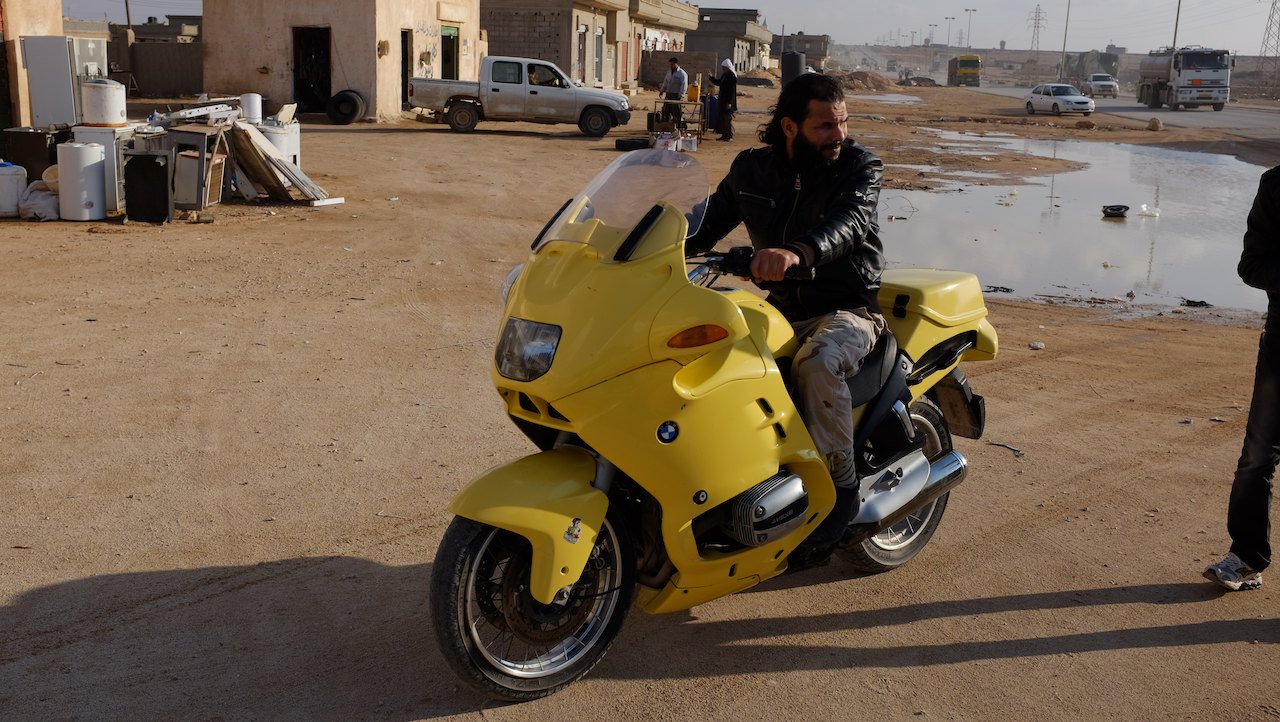
Before we go to a hotel, the guys would like to take us to the Commonwealth Cemetery of Tobruk where victims of the Second World War are buried. Even though we are all very tired of the long boring day on the bike, we cannot say no and are happy to follow them. The Commonwealth Cemetery is well maintained and a great contrast to the dusty environment outside the fence. Most soldiers are from Australia, Great Britain, Poland and the Czech Republic (then Czechoslovakia). Most of them are not older than 26. Some tombstones have beautiful poems on them, from the parents, sisters or brothers of the victims, like: “No honors did he crave, we do not know his story, but we know he was brave.”
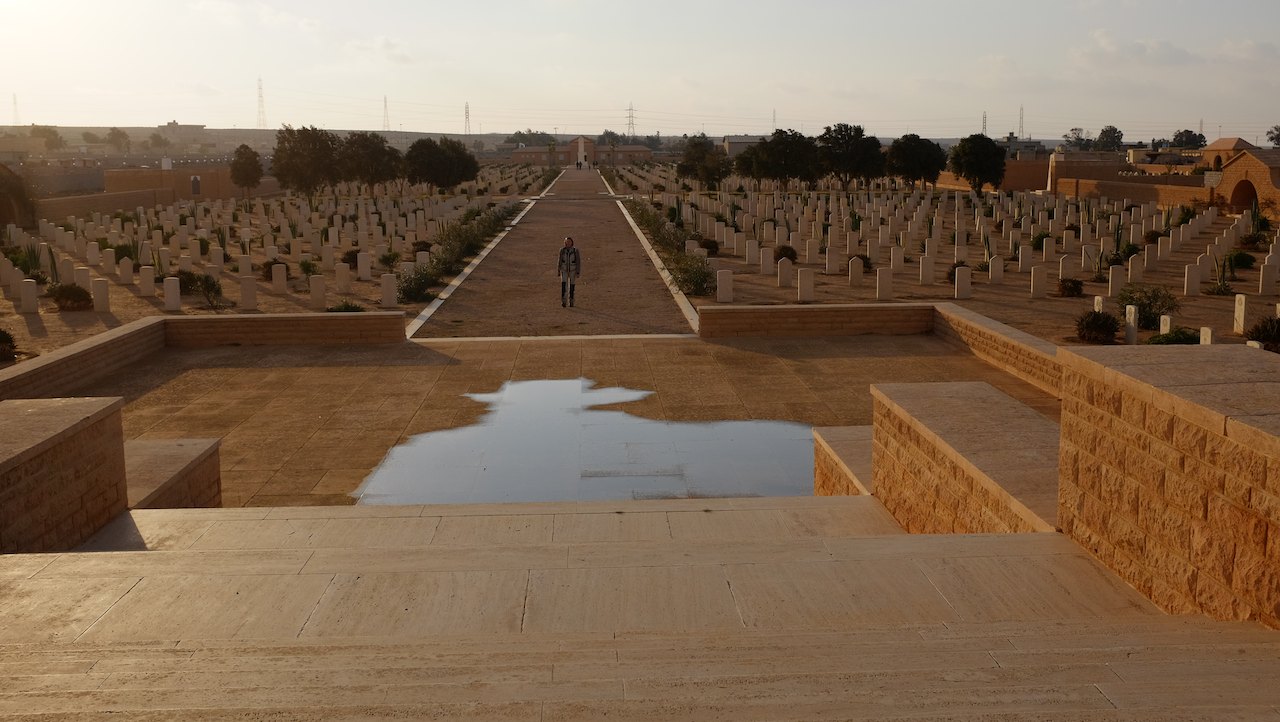
After we have visited the cemetery Moosa and Hameed take us to a recently renovated hotel. We get a hotel room on the top floor of the building with two bedrooms, a kitchen and a large living room. The rest of the afternoon we are passed out in the living room in front of the TV and over the map to see about the route we are going to ride in Egypt. At the beginning of the evening Moosa, Hameed and Moosas son return with dinner: freshly fried fish, soup, bread and humus. It tastes great! While eating Moosa explains that he is captain of the “Tourist Police”. He tells us about the current security situation. Only now we understand what the reason was that Hamad had stopped this morning for over half an hour. Hamad thought we were being followed by a Toyota Hilux and did not want to continue driving until he had made sure that it was safe! After a fun evening with more group photos and a demonstration of Ross on his unicycle, we dive into bed. Tomorrow awaits a new challenge, the Libyan border and then the Egyptian border, apparently one of the toughest border crossings in the world.
At 7 o’clock in the morning we drive away from the car park of the hotel in Tobruk. The sun has only just risen and it is still pretty cold when we follow a colleague of Moosa of the tourist police towards the border. After about 100km we stop in a parking lot near the border. In the distance we can already see the gate we will drive through our of Libya and into Egypt. We hand in our Libyan license plates and give our passports to a lady who will assist us with the administration. After about an hour we get our passports back, as well as the deposit of 100 Libyan dinars per numberplate. That ‘s it, we can leave Libya and go to Egypt.
Leaving Libya is the end of our Libyan adventure. It was a very special week, with the most amazing meetings and again unlikely hospitality. Despite the media coverage about the problems that still plague the country, we have not felt unsafe at all. Whether that was correct is of course to be seen. Only a few days ago, (on January 3, 2014) two foreigners have been killed in Libya not far from Zuwara. I am however glad it did not stop us from visiting Libya. The country has an incredible amount to offer and we hope that we will visit again when the country is more stable. We want to thank Masaud (Tripoli), Salah, Abdel Hamid, Ali, Rahim, Mustafa, Hamad, Fergany, Moosa and Hameed very much for the wonderful time we had and the fact that we have been able to travel safely. We also want to thank Billy and Ross for travelling through Libya with us on a slightly slower pace. We loved your company! Above all we want to thank Masoud (of Tidwa from Zuwara). We know for sure that he has made our trip by helping us and by introducing us to such loverly people. Thank you very much!
Distance to Libyan – Egyptian border : 5164km (3210 miles)
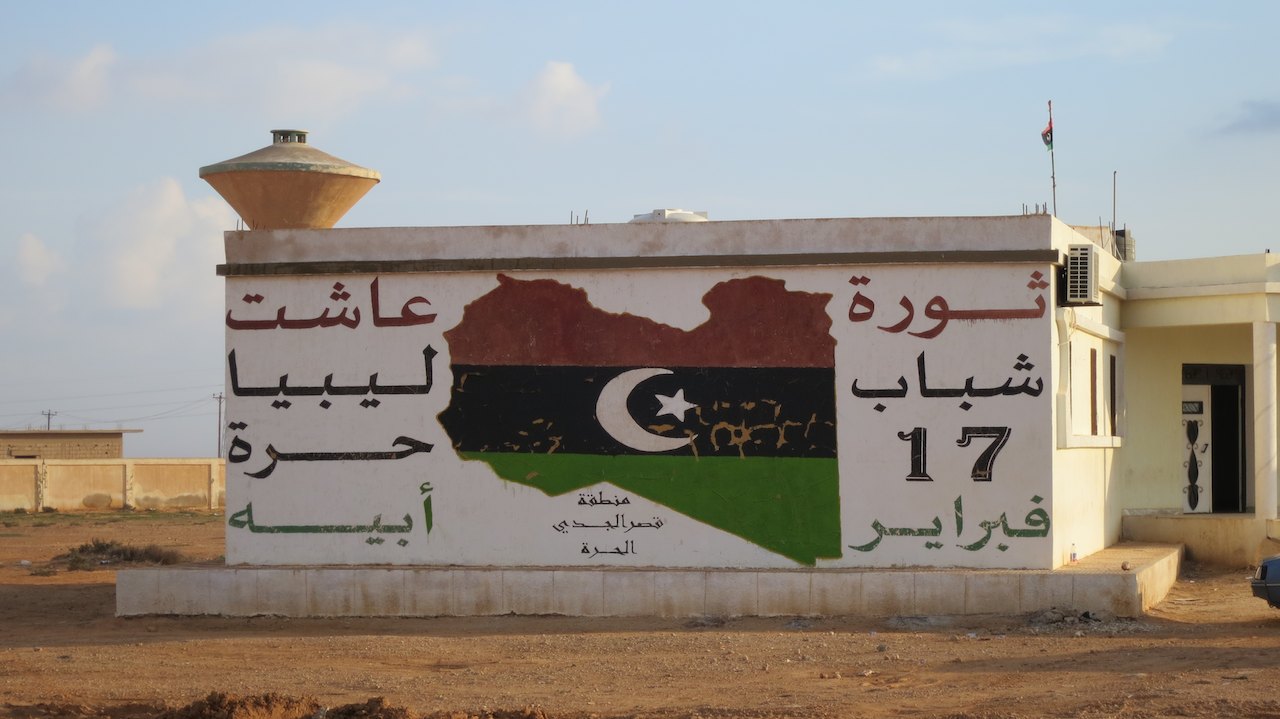
|

21 Sep 2014
|
|
Registered Users
Veteran HUBBer
|
|
Join Date: Nov 2013
Posts: 679
|
|
This is a great trip report. Keep it up!
Rtw

|

22 Sep 2014
|
 |
Registered Users
Veteran HUBBer
|
|
Join Date: Jan 2006
Location: Yuma, Arizona, USA
Posts: 548
|
|
|
Glad to read the trip through Libya went well! I knew that the news tends to make places sound worse than they really are, but there is truth to the news, too. Libya does not have a strong central government right now, so things could go bad at any time. I, for one, would like to visit Iran since my mother is from there, and nothing internal is going on. That is about all the middle east I desire to see in the near future, besides Egypt (probably, technically not ME), and/or Turkey (again, technically not ME).
|

22 Sep 2014
|
|
Registered Users
HUBB regular
|
|
Join Date: Dec 2009
Location: The Netherlands
Posts: 66
|
|
|
From one office, to another and another
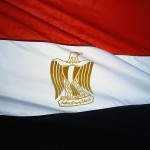 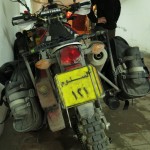 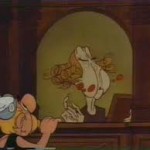 We were not allowed to take pictures at the Egyptian border (an did not try to ignore that rule), so unfortunately we have no extensive photo report this time. We will make up for that in the next stories! We were not allowed to take pictures at the Egyptian border (an did not try to ignore that rule), so unfortunately we have no extensive photo report this time. We will make up for that in the next stories!
--------------------
After we went through the Libyan border fairly quickly, a new test awaited us: the Egyptian border. The border with Egypt and especially the sluggish bureaucracy there is notoriously among overlanders. We had read stories about the procedure at the border and they were not always positive, telling about long delays (up to 10 hours), paying high sums of bribes, unnecessarily long discussions about seemingly trivial things (again with a view to bribes) and interrogations of several hours. Apart from the administrative side, we also read that travelers were harassed and robbed. Not a pleasant prospect.
With this information in mind, we were well prepared for a possibly long day. In Libya, we bought enough bread, toppings and water for a whole day. We agreed with Billy and Ross that we would try to be at the border as early as possible, so if we would have to wait we would at least do that in the daylight. All valuables such as cameras, the laptop, the leatherman and binoculars were stuffed on the bottom of our bags, so they could not be taken just like that. I had all the ‘feminine’ things I could think of (my toiletry bag, the peewee, pads and tampons) put at the top of my bags, hoping to scare away border officials when seeing those personal (and by men often considered ‘dirty’) things. I had also read that it would not hurt to cover my hair with a scarf, so I also put that in my tank bag. Finally I had a whistle in my tank bag. If I would whistle Peter would immediately come to rescue me ….
—————
The border between Libya and Egypt is a long road with buildings, gates, barriers and long lines of people waiting. We cannot read the Arabic texts on the various buildings and only the images of pyramids and hieroglyphics suspect that we have arrived at the Egyptian border. The four of us calmly drive on until someone waves us to one of the buildings. One of the men asks for our passports and our visas. We do not have a visa for Egypt yet, but we can buy it for 200 Egyptian pounds or 40 Libyan dinar. Although the exchange rate does not seem right, we each pay the requested amount after which our passports are taken inside the office.
Some time later we get our passports back. When we open it we do not find a visa, there is no stamp and there is no “visa sticker”. On our guard not to be fooled we ask where the visa is. They do not give us a real answer, but we do get a pink piece of paper. It turns out to be the receipt of the payment. Again we cannot read the amount in Arabic numerals, but we trust that it was not just any amount (in bribes), otherwise they would probably not have given a receipt. They indicate that we are allowed to drive on.
A few hundred meters further we pass a large building with “Entry” above the door. Some men indicate that we should stop here to get a stamp in our passports. Peter and Billy take our four passports inside, while Ross and I stay with the bikes. It is busy in the street. Everywhere are heavily loaded vans and people walking with heavy suitcases. I stay close to the bikes and try not to attract any attention. An impossible task, because with those four big bikes and flashy suits we once again are like an attraction. Several people come up to us, to chat or to change money. The many young boys that hang around us want to practice their English. In most cases, they know only one sentence; “ How are you”? they call out while they run passed us making all sorts of gestures.
When the group around us is too big, a young man in a black uniform steps forward. He looks angry and calls something in Arabic to the bystanders. Within seconds the whole group has dissolved and everyone is at the other side of the street. The man, Malek, appears to be an agent with the border police. He had been standing in front of the large building with some of his colleagues, but he now joins us. Whenever the bystanders are too close, he sends them away giving Ross and myself some space.
After some time, Peter and Billy come back out again. Inside they were sent from one office to another. No stamp had been put in yet. It now appeared that the officials wanted to see all four of us. That means that we have to leave our bikes with all our stuff on it outside. Malek reassures us that he will watch our bikes.
I remove my motorcycle helmet, which I had worn until now and replace it with my scarf which I wrap around my head. The four of us go into the building. We follow one of the officials into a dark corridor. It stinks of waste and urine. We pass several offices. A smaller office filled with smoke where three men are bent over some paper discussing loudly. A bigger office with a large desk where three men are watching television. A kitchen where coffee and tea is sold. In the hall way people are waiting against the walls. When we come into a larger hall and step into the light we can see how dirty everything is. The floor is black, as is the bottom part of the wall. The smell is horrendous, especially in the corners. On the stairs a woman is yelling at a young customs officer while her family tries to appease her. A little further a large group of men is waiting in front of a closed door. Every time the door opens, they hold up their passports in the air, waiving desperately hoping that they will be next. It is a stinky chaos.
After we have waited for a while, not knowing what for and how long, one of the officials comes towards us. After he has matched our faces to our passports, he returns our passports to us. There is no stamp in yet.
We are escorted back outside, where Malek is still waiting for us at the bikes. Just as we are standing outside, another customs officer walks up to us. He looks neat, with pants, dress shoes, a shirt and a long dark raincoat. It is sunny but not very hot and probably quite fresh for the Egyptians. He has a small mustache and thus resembles Peter Sellers as Inspector Clouseau from the Pink Panther. He asks whether one of us can come with him with the passports. Peter offers to go inside, while Billy, Ross and I stay with the bikes.
We do not know how long it will take and want to be ready to leave as soon as we can. After the border, we still have a journey of 280km to go to Marsa Matrouh. But it takes a long, long time. Billy makes himself comfortable and reads up on Egypt on his motorbike. Ross tries to put his newly learned Arabic in practice. I sit on my bike and wait. Malek is still with us and keeps all bystanders at a distance. He tries to chat with us with his limited English, while he gives us sunflower seeds, nuts and drinks.
After about 2.5 hours (!) later Peter returns with Inspector Clouseau. It turns out that customs had done some background research on us in the meantime. Peter had spent most of the time sitting in an office where he was interrogated. He had to answer questions about our marital status, our work, the trip, the route in Egypt and also about Billy and Ross. The questions were posed in English by a senior official, but an unkind cunning looking man beside the official whispered all the questions to him first. The man sat opposite Peter and watched him closely as he answered the many questions while he was also trying to find information about us on the internet using three different phones.
The hard work of Peter and the long wait had not been in vain because we passed the test and now each had a stamp in our passports! We are allowed to go into Egypt. Next up are the bikes.
As if we are in a rush after that long wait, Inspector Clouseau now asks us to hurry and follow him. After 300 meters he points to a baggage scanner where we have to take our luggage. It is very crowded, because not only our stuff but also all luggage from other travelers has to go through the only scanner they have. While we go back and forth between the baggage scanner and our bikes, Malek again is of great value. On the other side of the scanner is a large pile with all our stuff where Malek stands growling like a rottweiler when anyone gets too close. Once everything is checked and is attached to the bikes again, Inspector Clouseau escorts us to the next office 50 meters away where we have to import the bikes.
Egypt is the first country where we use our ‘Carnet de Passages and Customs’. That is a kind of passport for the bikes which allows us to import and export the bikes without having to pay at each border. Without a Carnet we would have had to pay 8 times the value of each bike at the Egyptian border (which you just have to hope you get it back when you leave Egypt). Instead we now paid a deposit to the ADAC (the German equivalent of the AA). It is important that all stamps in the Carnet will be in the right place, because only then the deposit is returned to us when we return home.
It appears to be quite an ordeal to have our carnets stamped. A first gentleman comes with a piece of paper and a pencil to record the chassis number. He does not write it on the paper, but takes a rubbing by putting the piece of paper on the numbers and scratching with a pencil. Then we are asked to pay to a second gentleman, before a third gentleman fills out an official looking document with data on each bike (the colour, the brand, the type, etc.). Everything in Arabic, so we do not understand a word he wrote down.
With that official document, our carnet and copies of our passports and the registration documents of the bikes we follow Inspector Clouseau to gentleman number four. He reviews the file, sorts the paper, resorts the papers and then signs the carnet. A stamp is still missing.
In another office, we give the files to gentleman number five. He sorts all the papers again in a slightly different order and explains that, before he can process the carnet, we first have to pay. So we walk to gentleman number six to pay and return to gentleman number five. Finally the ink pad and the stamp are out. It is extraordinary to see what actions the good man still has to do before he actually puts a stamp on the carnet: a signature here, a staple in a stack of papers there, some notes in a notebook, etc., etc., etc.
Eventually we leave gentleman number five, each with a stamp in our passports for the bikes, but without the stamped carnet! It has been stamped, but we can only take it after we have received Egyptian license plates, an Egyptian drivers license and have bought insurance.
The procedure now feels very similar to when Asterix and Obelix have to find permit A-38 in the “Place that sends you mad” (in the book “Asterix and the twelve tasks”). We are sent from one office, to another and again to another.
The four of us again follow Inspector Clouseau to gentleman number seven where we take out insurance for 60 Egyptian Pounds per bike. With receipts of the insurance we go into the office next door (to gentlemen number eight and number nine) who provide us with an Egyptian license plate and a drivers license. After we have fixed the number plates to the bikes, we are almost ready to leave. Billy walks with Clouseau back to gentleman number five to pick up our carnets. After 15 minutes he comes back, waving the stamped carnets in the air. We are ready, we can ride into Egypt now!
The entire procedure at the Egyptian border had at that time already taken more than seven hours(!), while we had already passed some time at the Libyan border before that. The process would have taken even longer if Inspector Clouseau had not helped us. He made sure we got in touch with the right people in the right order and also made sure we were treated with priority.
We eventually paid around 1015 Egyptian Pound per bike, which amounts to approximately 100 euro. Not a bad result because we had read that others had paid upto three times that amount. Moreover, we received receipts for all amounts, which probably means that we have not paid any bribes (at least not knowingly). Even Inspector Clouseau who spent the full 7 hours with us did not ask for any ’gift’ at the end of the day.
We have been treated very friendly and were welcomed by everyone in Egypt. Often they apologized for the process while asking “ First time in Egypt and last time in Egypt?”. We have not been annoyed or harassed by anyone. Aside from the long wait and the extremely inefficient process, we crossed the border without any difficulty. The whistle could remain in my tank bag.
We say goodbye to Inspector Clouseau. He also apologizes for the inefficient procedure and welcomes us to Egypt. When we want to drive away, there is a police car waiting for us that will escort us in the direction of Marsa Matrouh, the place where we want to spend the night. With blaring sirens they bring us to the exit. Only 100 meters further we are already stopped. Although the customs and police found that we were allowed to leave the border, the military at the border do not agree, or at least also want to say something about this. After we are checked again and this (seemingly unnecessary) hurdle is taken, we can finally leave. The police put on the siren and with good speed we drive into Egypt at the end of the afternoon.
We can pass the first five police checkpoints without having to stop. Our escort leads us past the long lines of waiting cars, while shouting through the speaker that everyone should move out of the way.This is great! If after some time we turn onto the highway, the police lets us pass and waves us goodbye.
After about 250km of riding in the dark we are requested to stop at a police checkpoint just outside Marsa Matrouh. The policemen there were clearly aware of our arrival and indicate that we will be escorted to Marsa Matrouh by the police. Our escort is not there yet, so we have to wait. We are invited by the camp fire (in the middle of the highway) and treated to tea. If the pot of tea is empty, we leave. With blaring sirens we are escorted into the city centre, where we are dropped off in front of a large hotel on the seafront in Marsa Matrouh at around 21:00 hrs.
After a hugely strenuous week in Libya and a long day at the border, we are exhausted when we check in at the hotel. But we are hungry and ….. it’s New Year’s Eve and Billy’s birthday at midnight! After we have freshened up we walk into the city centre hoping to celebrate. It soon becomes clear that this may not be the place for a good party. Marsa Matrouh is a city where a lot of conservative Muslims live that follow a different calendar and do not celebrate New Years Eve today. Moreover, we cannot find any bear in the surroundings of the hotel to celebrate our New Year. So after a quick burger and a phone call home at midnight (with one hour time difference) we go to bed at 00:30, still exhausted but proud of this chapter in our adventure.
Distance travelled to Marsa Matrouh: 5398km (3,355 miles)
Last edited by -Leonie-; 22 Sep 2014 at 16:50.
|

22 Sep 2014
|
|
Registered Users
HUBB regular
|
|
Join Date: Dec 2009
Location: The Netherlands
Posts: 66
|
|
|
Time to relax
We start the new year by sleeping in late. No long drive or border crossing today, we will do absolutely nothing. If I draw the curtains late that morning, I look out over a beautiful bay with clear blue water and a long promenade lined with palm trees. Only now we can see the nice spot at which the police dropped us off yesterday night in the dark. At 10:00 am Peter and I sit down with Billy and Ross for an Egyptian breakfast of round flat bread, fried eggs, a bowl with ground beans, vegetables, fresh cream cheese and some jam. A funny breakfast, but it is tasty. We are still waking up and talk about Libya and the long day at the border.
In the lobby of the hotel they have wifi and that means contact with the people at home. In Libya we had no access to the Internet and we did not even manage to receive any text messages. Although we were only a few days in Libya it felt like we were locked off from the world for a moment. Not only from contact with family and friends, but also from the news . It is extraordinary to notice how used we have become to being in touch with each other anywhere and at anytime and how used we are to being able to read the news whenever we want. The greater part of the day we are in the lobby of the hotel staring at our phones.
Meanwhile, the sun is shining and there is a nice sea breeze. Reason enough to put aside the phones and go for a walk to see where we are. Our hotel is situated on the promenade of Marsa Matrouh, a busy street with wide sidewalks and plenty of space to stroll. On the other side of the road is a small beach with white sand and rocks where a number of people are fishing. Along the promenade there are large hotels, the one even higher than the other with rooms that overlook the bay. In the street are several restaurants, including the well-known fast food chains such as McDonalds, Hardee’s and Kentucky Fried Chicken. At first sight, a bustling city. But that is not the case, as everything is closed! The metal shutters on the doors are closed, the windows and logos are taped and the tables and chairs are piled in a corner of the terrace. Our hotel is the only hotel that is open and we are almost the only guests.
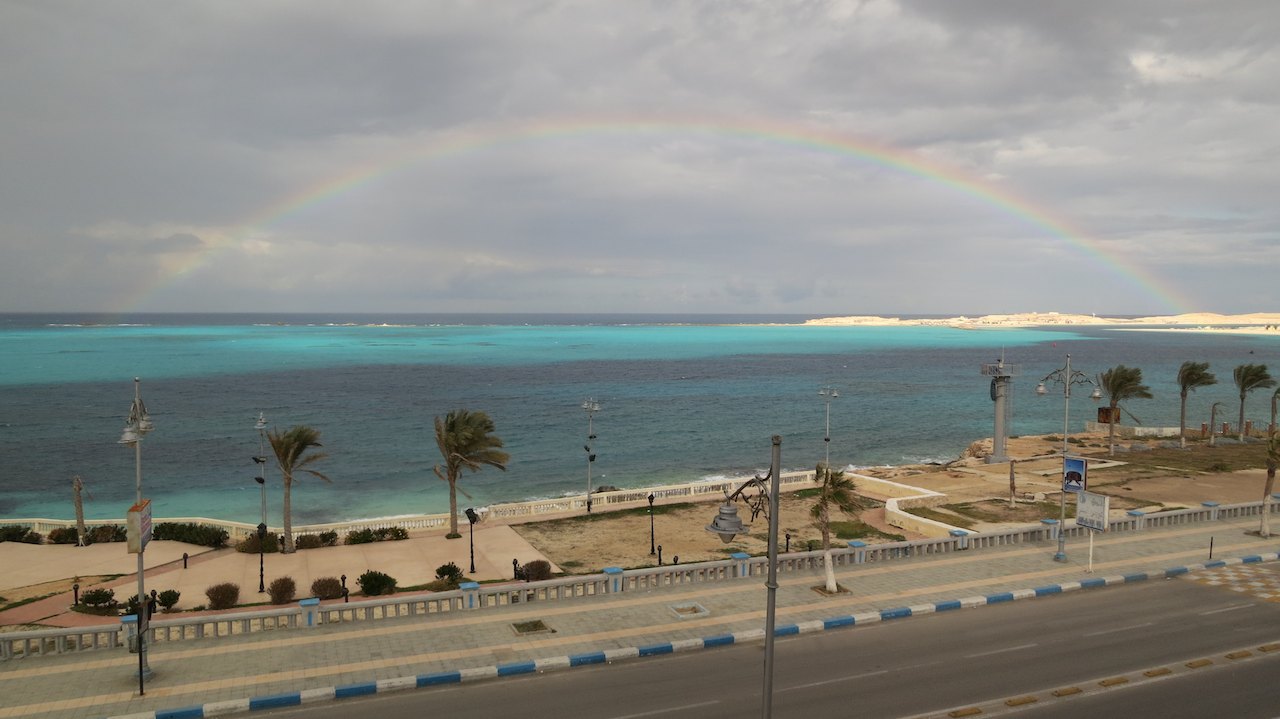
It is January 1st and it is Billy his birthday. A good reason for a party, so we should celebrate. We organize a small birthday drink with cake, candles that play ” Happy Birthday “ and non-alcoholic  s. The only alcohol we have is the last sip of our Cointreau which is for Billy. That evening Ross takes us out for dinner to celebrate Billy’s birthday, but also as a goodbye dinner as it is our last night together. The next morning we wave Billy and Ross goodbye as they drive on the boulevard with their roaring BMW-bikes.
Peter and I decide to stay a while in Marsa Matrouh. Not just to rest before we drive on, but also to ’work’. We have good internet so we can update the blog, upload photos to Dropbox and use Skype. The administration at home (for our apartment and insurance, etc.) also continues with the help of Peter’s mother and occasionally requires some attention. We take some time to read about Egypt and the sights that we can visit. Based on that information, we determine our route and search for places to stay. Peter also found a barbershop for a much needed haircut.
We closely follow the news about Egypt through the apps of NOS, BBC and Al Jazeera. It does not look good. There have been troubles in Egypt for some time now after President Morsi was deposed. The last few weeks an upcoming referendum led to new demonstrations during which some protesters were injured and even killed in several major cities, including Cairo and Alexandria. The travel advice from the Dutch Ministry of Foreign Affairs on Egypt is not positive and gives the idea that we can better ride to the Sudanese border in one go.
In Marsa Matrouh we are therefore very wary when we leave the hotel to go shopping or to go out for dinner in the evening. The picture on the street is however very different from the images we receive through various new apps. It looks suspiciously like ordinary life: children going to school, mothers with full shopping bags, construction workers who are building a new hotel, taxi drivers waiting for another client and old men busy talking to each other in the local teahouse. We do see more soldiers and police on the streets than we are used to in the Netherlands. The mostly young boys stand guard at several official buildings, including the library, a police station or a house of a senior official.
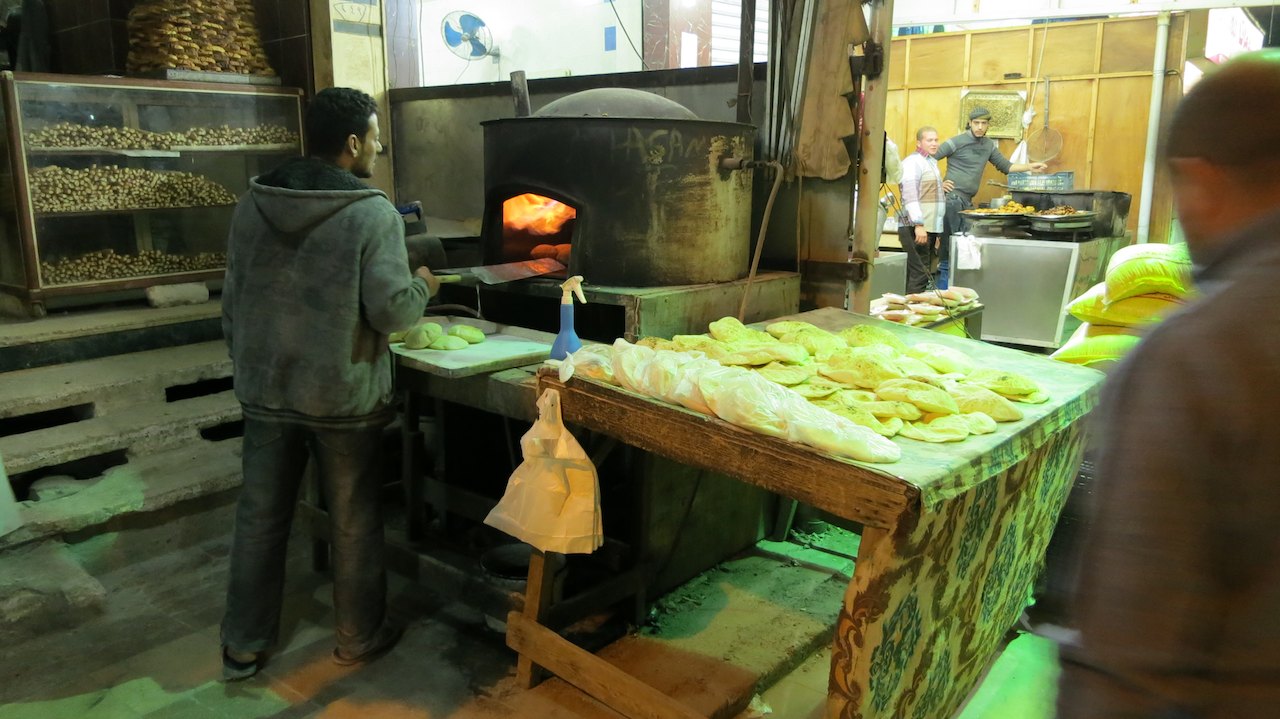
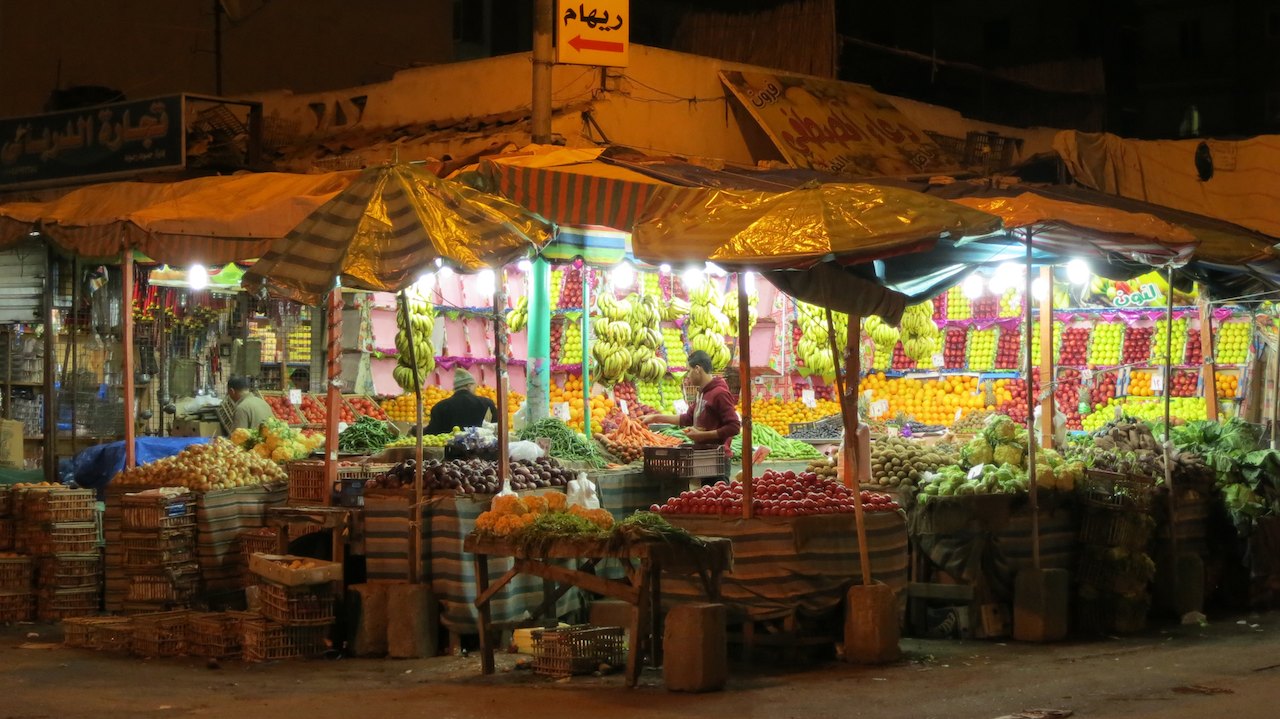
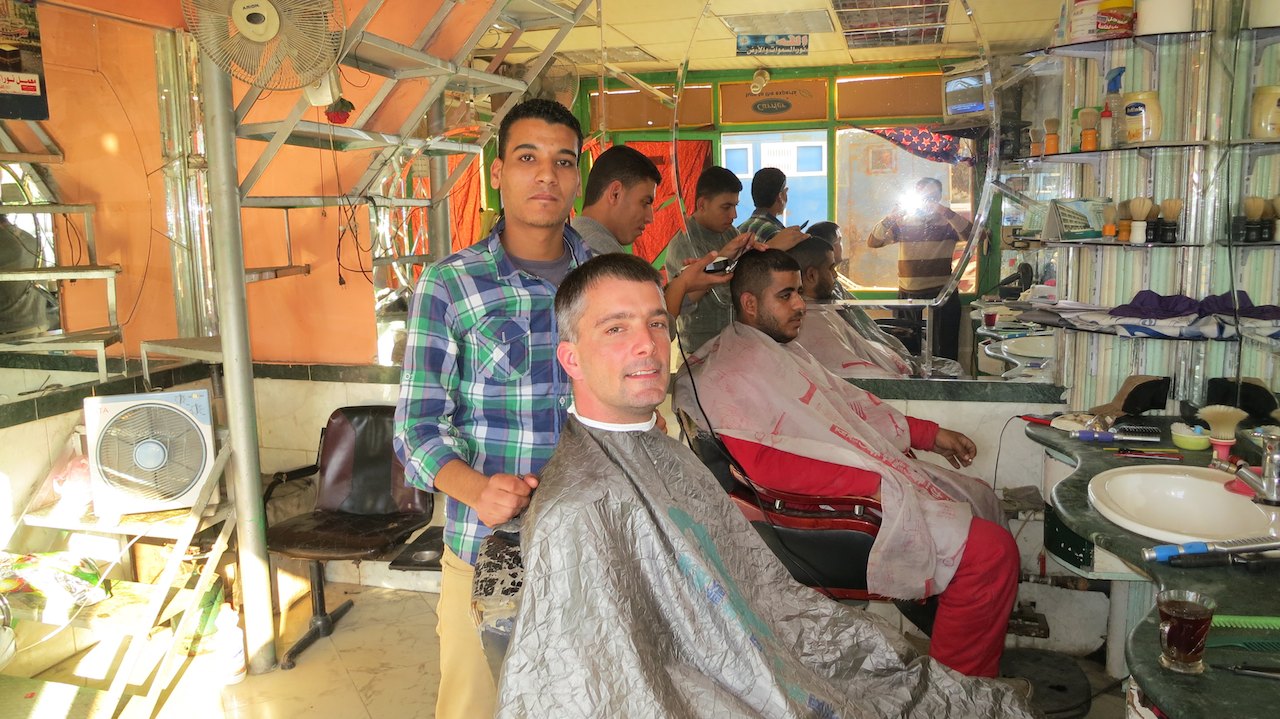
We walk through busy shopping streets and pass drugstores, convenience stores, bakeries, butchers, phone shops and market stalls filled with fruit. In one of the streets we are suddenly faced with large rolls of barbed wire that are across the road. Behind the barbed wire are piles with sandbags with every other five meters the barrel of a gun that pops up next to a head with a helmet. Behind them are two tanks and a group of about 30 soldiers. They are in front of the provincial house and appear to be ready to strike any moment. On our side of the barbed wire everyone is just getting on with what they were doing: drinking tea, building a wall or doing some shopping. When we walk a little further, there is no military at all.
The presence of soldiers is probably not without a reason and with the news images on our minds we decide not hang around the street with all the military. We pay a lot of attention to the sounds on the street and look around startled when we hear a line of honking cars in the distance. Will this be the start of a demonstration? It appears to be a line of cars celebrating a marriage, while honking and racing through the streets of Marsa Matrouh with little red harts on the number plates and a white bow on the front of the first car.
In the days that follow we go out for shopping and dinner each day. Time and time again we see what we had experienced before, ordinary life goes on. We are kindly greeted everywhere and (as in Libya) welcomed. The young policemen who stand on guard, the supermarket cashiers, the taxi drivers, they all ask where we come from and say: “Welcome back.” They were used to tourists here (unlike in Libya), but have not seen them for the last few years.
After five days in Marsa Matrouh, where I spent most of the time on the laptop to write about Libya, it is time to get going again. We want to go to Giza to visit the pyramids. From Marsa Matrouh to Giza is too long for one day, so we will ride to Alexandria first.
Alexandria is the second largest city of Egypt with 4 million inhabitants. The town was in the news because there had been some deaths during demonstrations early January, just a few days before we would go there. We wondered several times whether it was a good idea to go there. Billy and Ross had already been there before us and had not reported on any riots. As a matter of fact, their stories on Facebook were very positive.
We had seen in Marsa Matrouh that the military occupation was limited to specific areas or even to a single street in the city. Actually a lot like the Netherlands where protesters gather at the Malieveld or on the Museumplein. This does not mean The Hague or Amsterdam become entire no-go areas. With that in mind, we feel OK about going to Alexandria. Just be careful, trust our intuition and turn around if we do not think it to be safe.
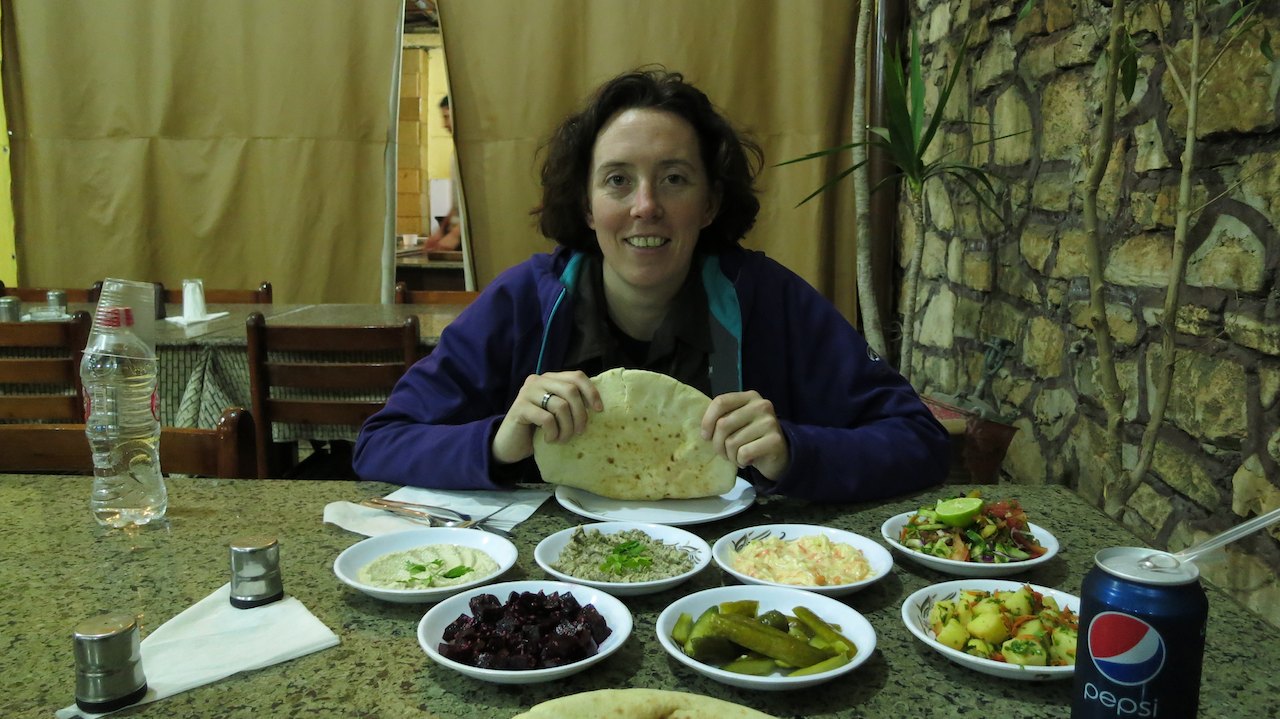
After our last breakfast with bread, beans, vegetables and cheese spread, we also drive away on the boulevard of Marsa Matrouh (albeit with slightly less sound from our roaring little Hondas). The GPS lead us out of the city and on to the highway without any problems. We drive parallel to the Mediterranean coast to the east. The area we drive through is mostly dry and sandy. The first part of the route we can still catch an occasional glimpse of the sea. Some times the sea is no longer visible because the strip of land between the sea and the highway is packed with holiday resorts. Not your all-inclusive resorts where you can enjoy the sun, but compounds with holiday houses that can be bought as a second house. It looks a lot like the coast in southern part of Spain For more than 150km long (!) we pass one compound after another, each with a beautiful entrance and large billboards with pictures of swimming pools, shopping malls and white beaches.
We set the GPS to the center of Alexandria, where we should be able to find a hotel. The GPS is often indispensable, but in some cases we had better first looked on the map. Today was such a day. Instead of a highway around the city, we drive straight into town. We are still 20km away from our destination when we get completely stuck in Alexandrian traffic.
The traffic here is not comparable to the traffic in any of the towns we drove through earlier. Everywhere are cars, tuk-tuks, motorbikes, donkey carts, trucks and minivans. We drive on a two lane road that is actually used by four lines of cars. On the side of the road is a variety of market stalls and are lots of people who want to go to their next destination by minibus. Those minibuses stop in the strangest places to pick up customers and then suddenly get back on the road again. The road is bad and contains many potholes, which makes motorists suddenly swerve to avoid them at the most unexpected moments. We manage to avoid most of the potholes, but still hit some quit hard. Between all that traffic people want to cross the road. There are no traffic lights or zebra crossings here, so they just have to get on the road and hope that cars stop or that they fit in between the long lines of driving cars. Besides all this, everyone honks, all the time!
We drive on very slowly and are not able to switch to second gear. The GPS indicates that we are still 18km away from our destination when it starts to rain very hard. Putting on our rain gear is not an option, so we drive on slowly on the now very muddy road. After 10km we start to understand the Egyptian traffic. Despite the fact that everyone honks all the time, no one seems really angry. Other than we are used to in the Netherlands, honking is not accompanied by hand gestures. Honking here means: “I am next to you”, “I am going to take over now” or “Have you seen me?”. It is not long before we also driving through the streets of Alexandria honking loudly.
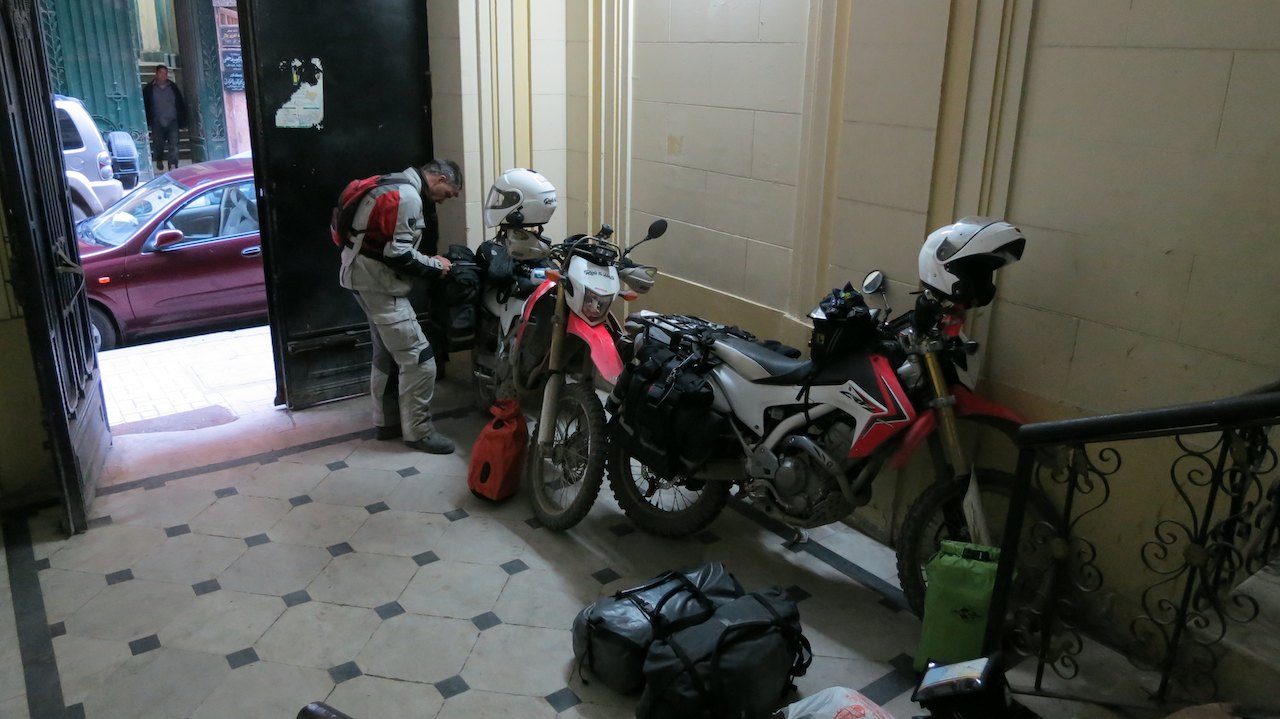
After another few kilometers traffic already seems less chaotic than it was at first glance. Everyone seems to be well aware that we share the road and that motorist may make weird swerves. The traffic actually moves in a very organic way, a bit like thick syrup that wants out of the bottle. With our small bikes we just drive at the same pace as everybody else and keep moving forward. Meanwhile, we attract a lot of attention and make small talk with taxi drivers when we have to stop in the traffic jam.
After we have plowed through the busy traffic of Alexandria for over two hours and we are completely soaked and brown with mud, we arrive in the city center near the hotels. It is busy, not only on the promenade along the sea, but also in the narrow side streets. We go to several hotels to ask if they have a room for us. There are plenty of rooms, but a safe place to park the bikes is a problem. After we have wandered from hotel to hotel for more than one hour, we meet the owner of the last hotel just as he steps out of his car. He allows us to park the bikes in the hallway of the building on the condition that we get all our stuff off and lock the bikes. Great! We fit the bikes through the narrow hallway and securely lock them.
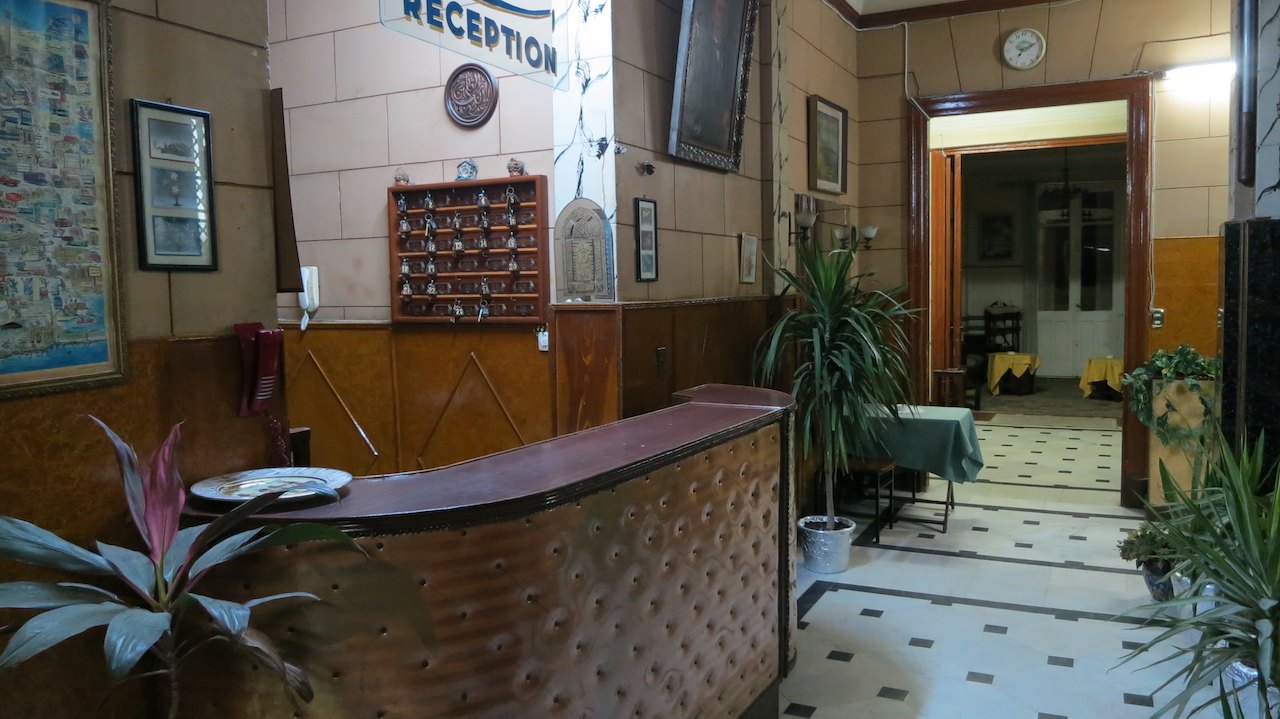
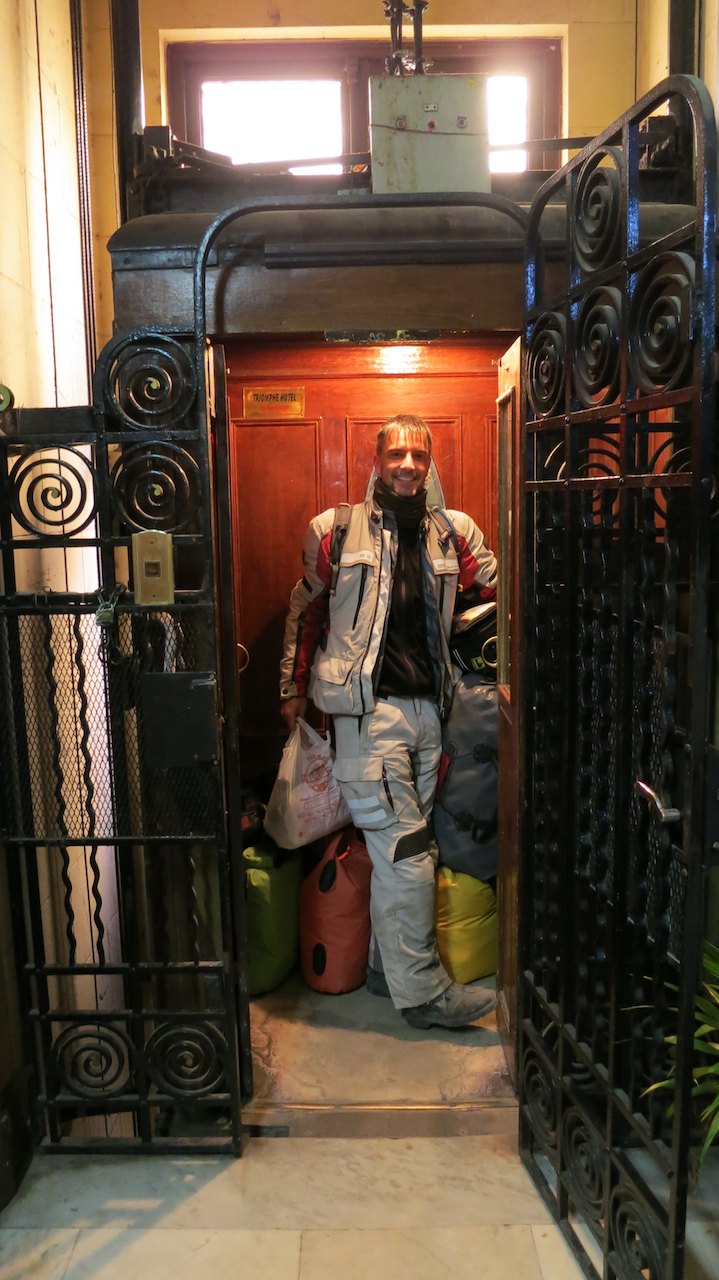
Triomphe Hotel is located on the fifth floor of a beautiful building. In the middle of the property there is a large spiral staircase, with a very old wooden elevator with a metal fence next to it. Once in the hotel lobby it looks like we have just stepped into a book by Agatha Christie. The lobby of the hotel does not seem to have changed since the early 1900s and is filled with ornate chairs, beautiful wood cabinets and framed portraits of former residents, as is our room.
We change our smelly motor gear for a freshly washed set of clothes and go out for dinner. As in Marsa Matrouh we are on our guard as we walk on the central boulevard. Aware of the potential uprisings in Alexandria, we pay attention to the people around us and the sounds on the street. But we have worried for nothing, because in Alexandria (at least in this part of the city) it is life as usual. The city is buzzing! The coffee houses and cafes are full and blue with smoke. People drink coffee, play chess and smoke shisha. Unlike in Marsa Matrouh the cafes are not only filled with men but also by women, often without a headscarf. Many students sit around discussing their notes while sipping coffee and smoking too much cigarettes. After a lovely dinner in a small restaurant, we join them in one of the cafe’s for coffee, shisha and a game of dominoes. A great ending to a relaxing first week in Egypt!
Distance travelled to Alexandria: 5687km (3533 miles)
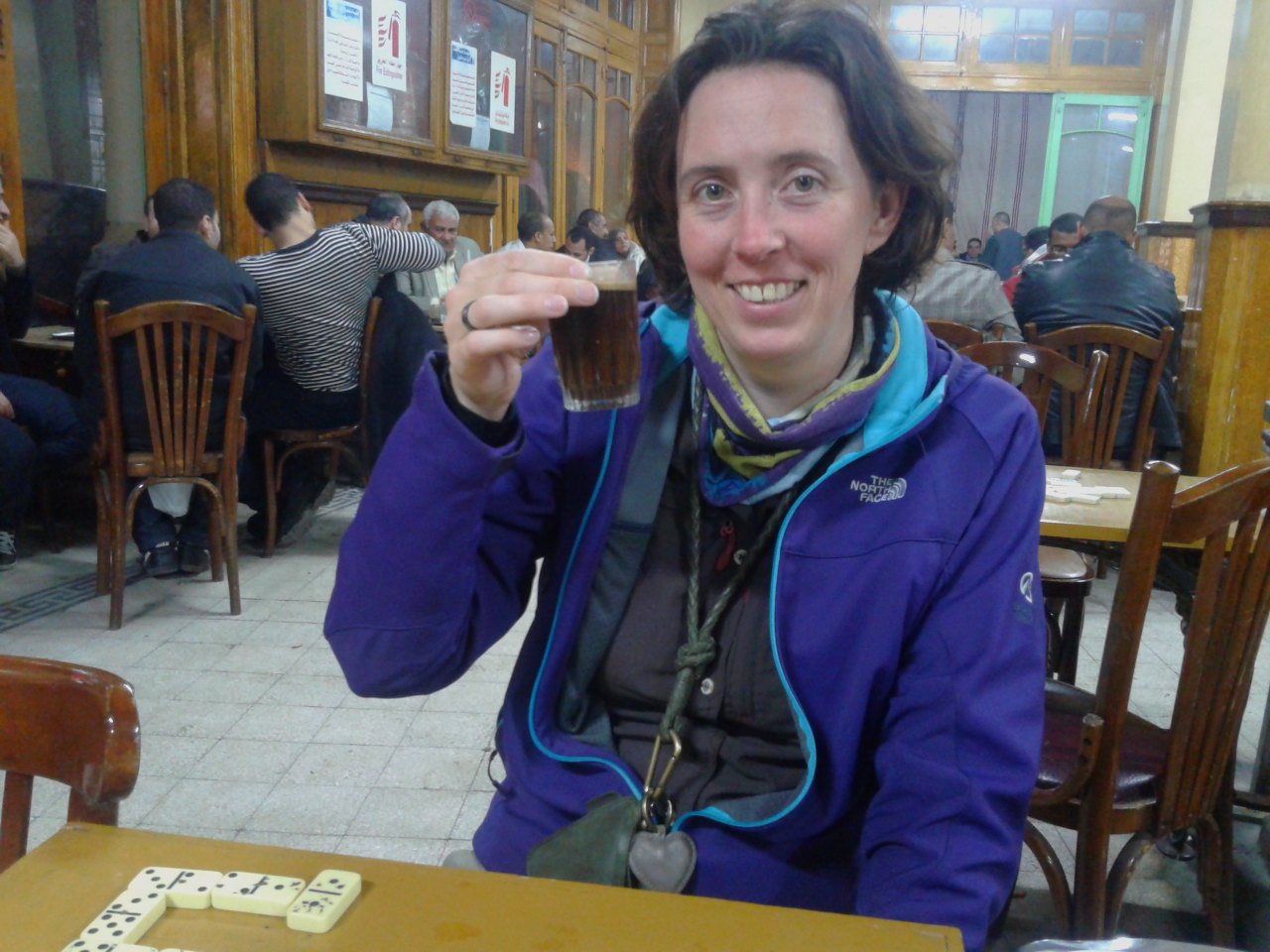
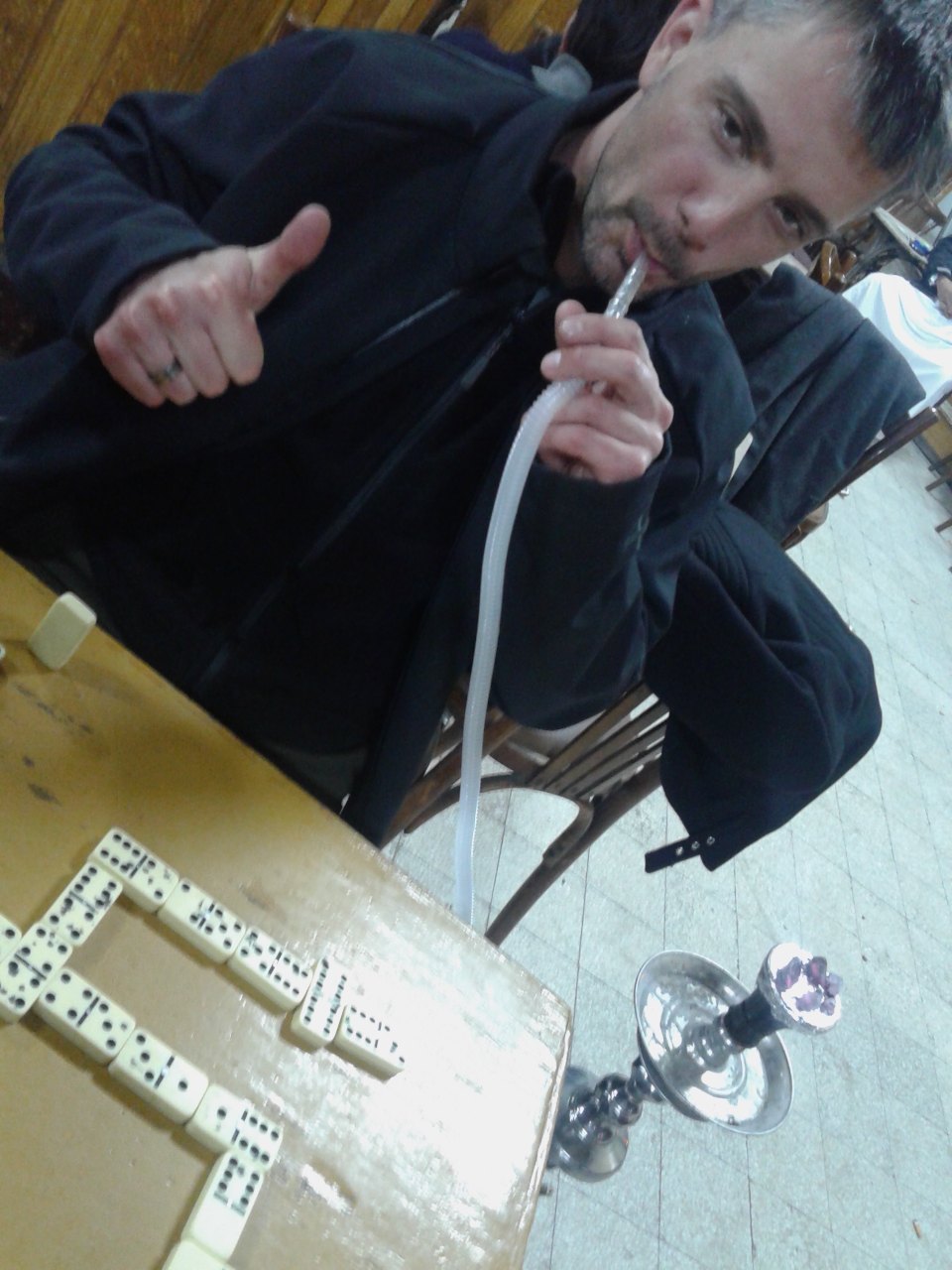
|

22 Sep 2014
|
 |
Registered Users
Veteran HUBBer
|
|
Join Date: Sep 2007
Location: Lutterworth,Midlands, UK
Posts: 573
|
|
Loving your story so far, I have not the time to read it all in one hit but will enjoy looking while at work.
Glad that you have seen the light, small and light bikes really rock, so much more enjoyable than big heavy bikes.
I have owned many big bikes but always come back to my trusty 250's 
|

23 Sep 2014
|
|
Registered Users
Veteran HUBBer
|
|
Join Date: Feb 2012
Posts: 836
|
|
|
I did follow your trip since a while!
I love the quality of your pictures and your style of writing. Thanks for sharing!
What do you use to make pictures? Which Model/Brand/Equipment?
Surfy
|

26 Sep 2014
|
|
Registered Users
HUBB regular
|
|
Join Date: Dec 2009
Location: The Netherlands
Posts: 66
|
|
|
Camera Equipment
Quote:
Originally Posted by Surfy

I did follow your trip since a while!
I love the quality of your pictures and your style of writing. Thanks for sharing!
What do you use to make pictures? Which Model/Brand/Equipment?
Surfy
|
Hi Surfy,
Great to hear you are loving our report so far.
For the pictures we use two different photo cameras.
Peter uses a Fuji X100S. It has a fixed 23mm lens, so you 'zoom by using your feet'. The quality of those pictures is amazing.
I have a smaller Canon S100, which I always carry in the pocket of my jacket, which makes it easy and quick to take out. It has a small zoom lens and makes great pictures. So far over 12.000 clicks.... 
We do sometimes miss our SLR with objectives (especially when animals are too far away), but these two cameras are great alternatives and a lot better on weight.
Cheers!
|

27 Sep 2014
|
 |
Registered Users
Veteran HUBBer
|
|
Join Date: Jan 2006
Location: Yuma, Arizona, USA
Posts: 548
|
|
|
Glad to read your trip to Egypt has been positive, although cautious. I definitely would like to visit one day, and was sad to read the past few years about the troubles there, and the tourist industry virtually shutting down. You are showing there is hope again!
|
|
Currently Active Users Viewing This Thread: 1 (0 Registered Users and/or Members and 1 guests)
|
|
|
 Posting Rules
Posting Rules
|
You may not post new threads
You may not post replies
You may not post attachments
You may not edit your posts
HTML code is Off
|
|
|
|

Check the RAW segments; Grant, your HU host is on every month!
Episodes below to listen to while you, err, pretend to do something or other...

2020 Edition of Chris Scott's Adventure Motorcycling Handbook.
"Ultimate global guide for red-blooded bikers planning overseas exploration. Covers choice & preparation of best bike, shipping overseas, baggage design, riding techniques, travel health, visas, documentation, safety and useful addresses." Recommended. (Grant)

Led by special operations veterans, Stanford Medicine affiliated physicians, paramedics and other travel experts, Ripcord is perfect for adventure seekers, climbers, skiers, sports enthusiasts, hunters, international travelers, humanitarian efforts, expeditions and more.
Ripcord Rescue Travel Insurance™ combines into a single integrated program the best evacuation and rescue with the premier travel insurance coverages designed for adventurers and travel is covered on motorcycles of all sizes.
(ONLY US RESIDENTS and currently has a limit of 60 days.)
Ripcord Evacuation Insurance is available for ALL nationalities.
What others say about HU...
"This site is the BIBLE for international bike travelers." Greg, Australia
"Thank you! The web site, The travels, The insight, The inspiration, Everything, just thanks." Colin, UK
"My friend and I are planning a trip from Singapore to England... We found (the HU) site invaluable as an aid to planning and have based a lot of our purchases (bikes, riding gear, etc.) on what we have learned from this site." Phil, Australia
"I for one always had an adventurous spirit, but you and Susan lit the fire for my trip and I'll be forever grateful for what you two do to inspire others to just do it." Brent, USA
"Your website is a mecca of valuable information and the (video) series is informative, entertaining, and inspiring!" Jennifer, Canada
"Your worldwide organisation and events are the Go To places to for all serious touring and aspiring touring bikers." Trevor, South Africa
"This is the answer to all my questions." Haydn, Australia
"Keep going the excellent work you are doing for Horizons Unlimited - I love it!" Thomas, Germany
Lots more comments here!

Every book a diary
Every chapter a day
Every day a journey
Refreshingly honest and compelling tales: the hights and lows of a life on the road. Solo, unsupported, budget journeys of discovery.
Authentic, engaging and evocative travel memoirs, overland, around the world and through life.
All 8 books available from the author or as eBooks and audio books
Back Road Map Books and Backroad GPS Maps for all of Canada - a must have!
New to Horizons Unlimited?
New to motorcycle travelling? New to the HU site? Confused? Too many options? It's really very simple - just 4 easy steps!
Horizons Unlimited was founded in 1997 by Grant and Susan Johnson following their journey around the world on a BMW R80G/S.
 Read more about Grant & Susan's story
Read more about Grant & Susan's story
Membership - help keep us going!
Horizons Unlimited is not a big multi-national company, just two people who love motorcycle travel and have grown what started as a hobby in 1997 into a full time job (usually 8-10 hours per day and 7 days a week) and a labour of love. To keep it going and a roof over our heads, we run events all over the world with the help of volunteers; we sell inspirational and informative DVDs; we have a few selected advertisers; and we make a small amount from memberships.
You don't have to be a Member to come to an HU meeting, access the website, or ask questions on the HUBB. What you get for your membership contribution is our sincere gratitude, good karma and knowing that you're helping to keep the motorcycle travel dream alive. Contributing Members and Gold Members do get additional features on the HUBB. Here's a list of all the Member benefits on the HUBB.
|
|
|















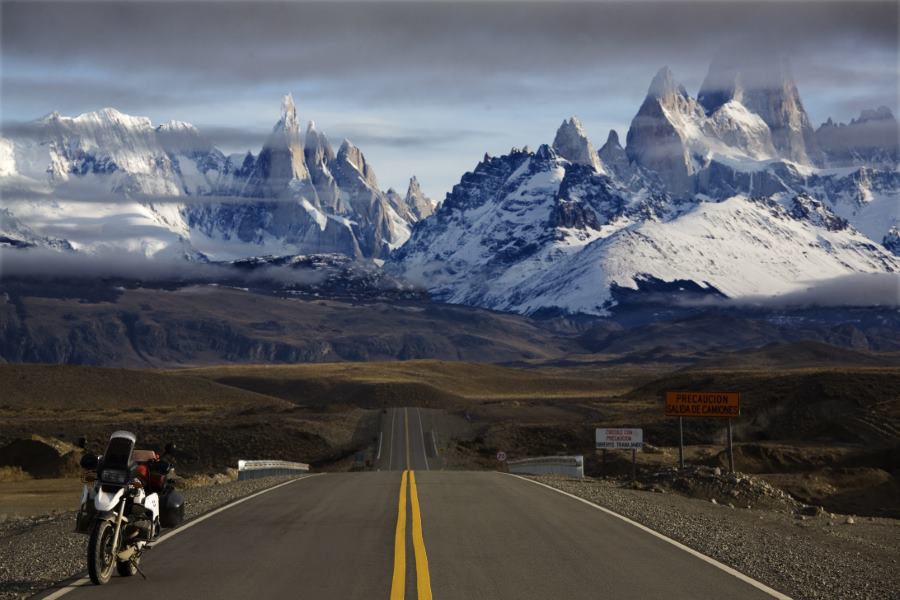
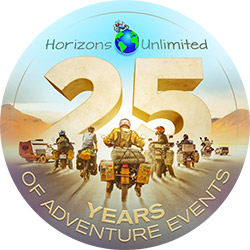
 27Likes
27Likes
















































































































 We were not allowed to take pictures at the Egyptian border (an did not try to ignore that rule), so unfortunately we have no extensive photo report this time. We will make up for that in the next stories!
We were not allowed to take pictures at the Egyptian border (an did not try to ignore that rule), so unfortunately we have no extensive photo report this time. We will make up for that in the next stories!
 s. The only alcohol we have is the last sip of our Cointreau which is for Billy. That evening Ross takes us out for dinner to celebrate Billy’s birthday, but also as a goodbye dinner as it is our last night together. The next morning we wave Billy and Ross goodbye as they drive on the boulevard with their roaring BMW-bikes.
s. The only alcohol we have is the last sip of our Cointreau which is for Billy. That evening Ross takes us out for dinner to celebrate Billy’s birthday, but also as a goodbye dinner as it is our last night together. The next morning we wave Billy and Ross goodbye as they drive on the boulevard with their roaring BMW-bikes.











 Linear Mode
Linear Mode




